Broken Road, Stronger Soul: How I Rebuilt My Life After My Wife Left Me in a Wheelchair
Broken Road, Stronger Soul: How I Rebuilt My Life After My Wife Left Me in a Wheelchair
The Day Everything Changed
My name is Daniel, and I'm sitting in my apartment, staring at the adaptive basketball trophy I won last month. It's been two years since the accident that put me in this wheelchair, and sometimes I still can't believe how much my life has changed. The gleaming trophy represents more than just a victory on the court—it symbolizes everything I've fought to reclaim. Before the wheelchair, I was that guy who had it all figured out: athletic, confident, married to Megan, my partner of twelve years. We had our future mapped out—the house we'd buy, the kids we'd raise, even the countries we'd visit when we retired. But life has a way of rewriting your plans without permission. I remember that rainy Tuesday morning like it was yesterday—the screech of tires, the sickening crunch of metal, then darkness. When I woke up in that hospital bed and the doctor said those words—"significant spinal damage"—I thought my world was ending. I had no idea that was just the beginning of a journey that would show me who truly deserved a place in my life, and who didn't. The accident didn't just break my spine; it shattered the illusion of the life I thought I had built.
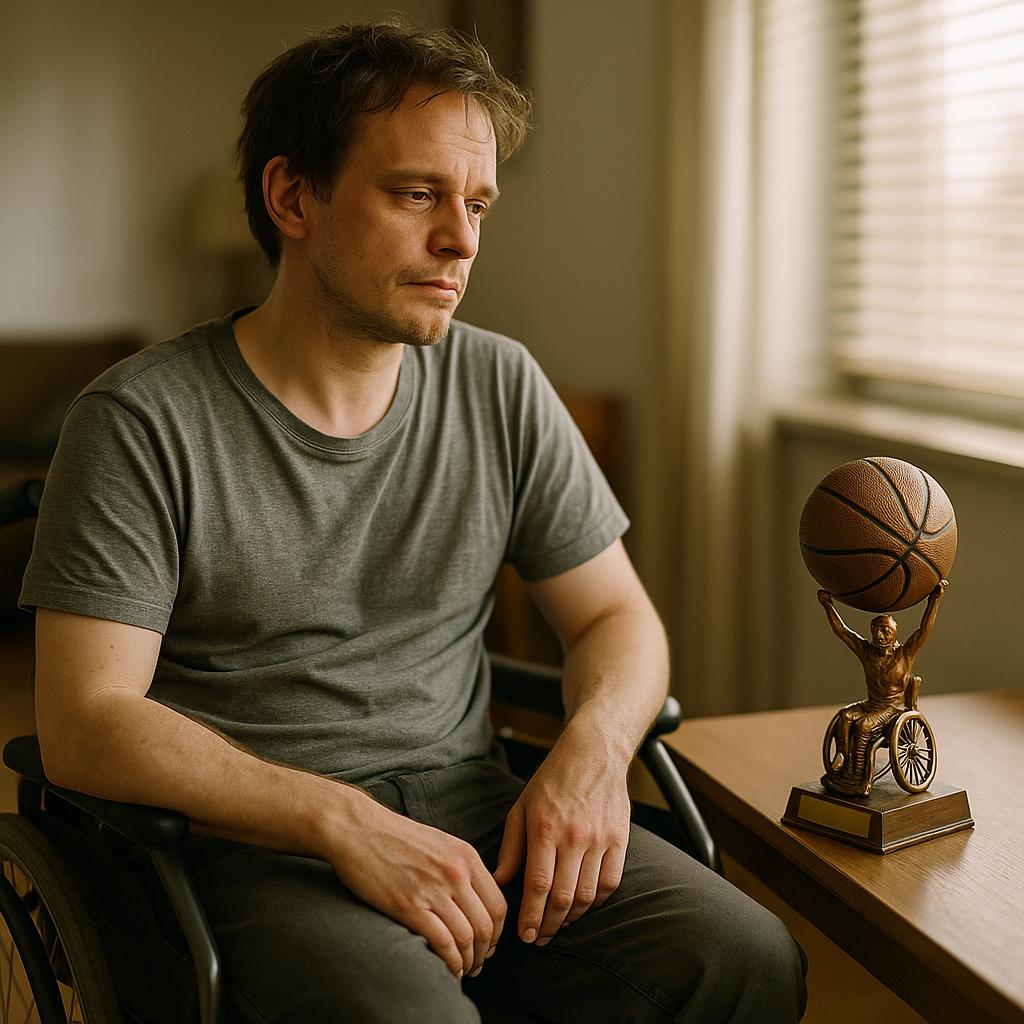 Image by RM AI
Image by RM AI
Before the Fall
Two years ago, before the wheelchair, before the trophy, I was Daniel the invincible. At 34, I was killing it as a project manager at Westlake Construction, coming home to Megan, my college sweetheart and wife of five years. We had our life perfectly scheduled: Sunday brunches at Maple Street Café, hiking trails every other weekend, and Netflix documentaries on weeknights. Our three-bedroom suburban home had an empty room we'd painted a soft yellow, waiting for the baby we planned to start trying for that fall. I remember our last normal morning with painful clarity. Megan was wearing that blue robe she loved, hair still wet from the shower, making coffee while I packed my lunch. "Don't forget dinner with my parents tonight," she reminded me, kissing me goodbye at the door. I promised I wouldn't be late, grabbed my keys, and headed out to my truck. That goodbye kiss—so ordinary, so forgettable at the time—would be the last moment of our old life together. If I had known what was coming, would I have held her longer? Said something more meaningful than "See you tonight"? It's funny how the universe doesn't give you a heads-up before it decides to completely wreck your life.
 Image by RM AI
Image by RM AI
The Crash
I remember the accident in flashes, like a broken movie reel that keeps skipping the most important parts. It was just after lunch, and I was thinking about what excuse I could make to my in-laws about being late for dinner. That's when I saw it—a red SUV barreling toward the intersection, the driver's face illuminated by the blue glow of a phone screen. Time slowed down as I realized they weren't stopping. I slammed on my brakes, felt my tires fighting for grip on the wet asphalt. There was this moment—this surreal, floating moment—where I thought, 'This is going to be bad, but I'll be okay.' The sound of metal crushing against metal was deafening. My car spun once, twice, then careened off the road. I remember the strange weightlessness, like being on a carnival ride that suddenly breaks free from its moorings. In that suspended moment between impact and darkness, Megan's face flashed before me. Would I make it home? Would she worry when I didn't answer my phone? Then came the second impact—harder, final—as my car slammed into something solid. The airbag exploded in my face, and the world went silent before the pain arrived. When I came to, there were sirens, flashing lights, and unfamiliar voices. 'Don't move, sir. Help is coming.' I tried to feel my legs, but there was nothing there—no pain, no pressure, nothing at all. That's when I knew, even before the paramedics carefully strapped me to a backboard, that my life had just been divided into before and after.
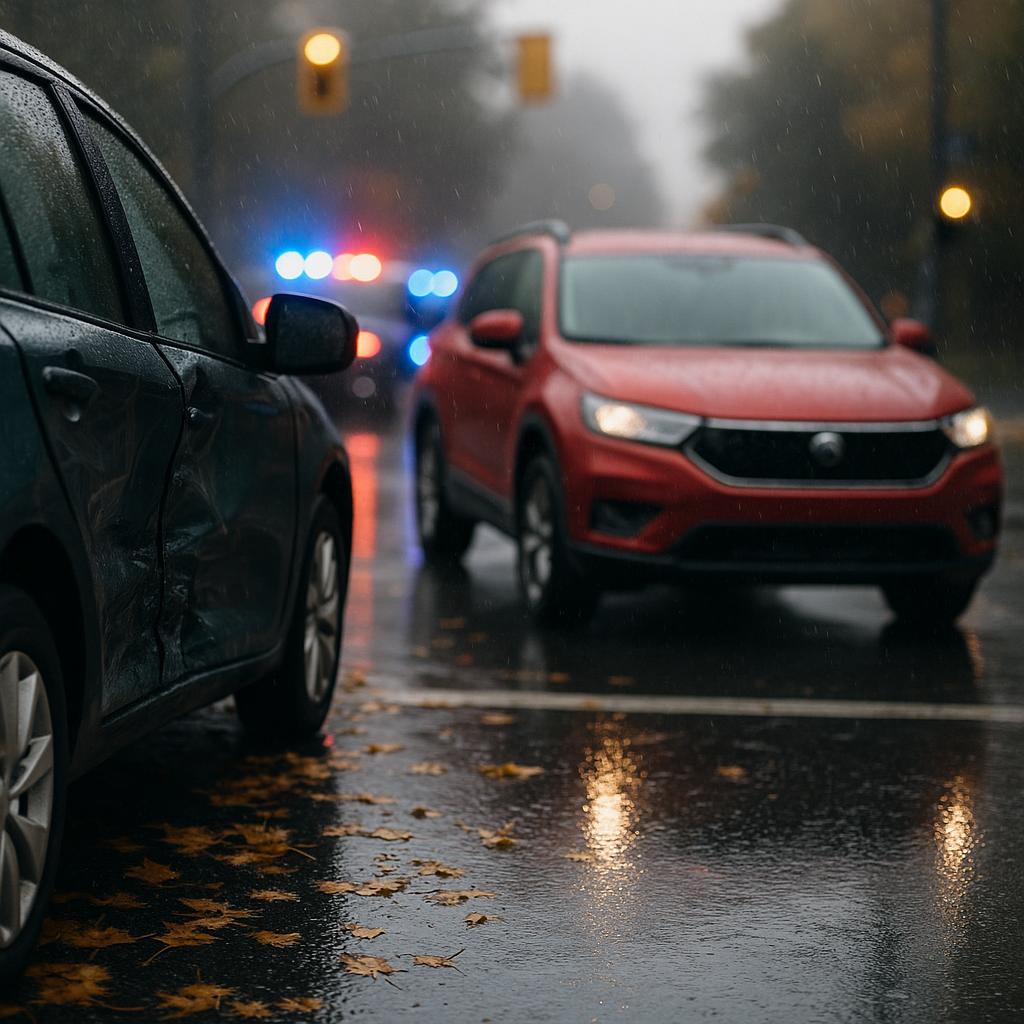 Image by RM AI
Image by RM AI
Waking Up
I woke up in a fog of beeping machines and antiseptic smells. Three days had vanished from my life, and I returned to consciousness to find Megan curled awkwardly in a hospital chair, her face puffy from crying even in sleep. When I tried to move, nothing happened below my waist—just a terrifying emptiness where sensation should be. The doctor arrived with his clipboard and serious expression, using words that seemed to float around the room without landing: 'incomplete paraplegia,' 'spinal trauma,' 'uncertain prognosis.' But what terrified me most wasn't the medical jargon—it was watching Megan's face as she absorbed each word. She gripped my hand so tightly her knuckles went white, nodding mechanically as the doctor explained rehabilitation options and 'managing expectations.' I could literally feel her fingers trembling against mine, could see her struggling to maintain composure as our carefully planned future crumbled in real time. 'We'll get through this together,' she whispered after the doctor left, but there was something in her eyes I'd never seen before—fear, yes, but something else too. Something that looked disturbingly like regret. I had no idea then that the crash wasn't the worst thing that would happen to me that year.
 Image by RM AI
Image by RM AI
The Diagnosis
The words hit me like a second car crash. 'You may never walk unassisted again,' Dr. Novak said, his Polish accent thickening as he delivered the news. The fluorescent lights suddenly seemed too bright, too harsh. I stared at the MRI images on his computer screen—my spine, my broken body—as if I could will them to change. 'There must be some mistake,' I insisted, my voice rising. 'What about surgery? Physical therapy? There's got to be something!' Dr. Novak's face remained compassionate but unmoved. He'd seen this denial before, this bargaining. Megan sat beside me, tears streaming silently down her face, but I couldn't comfort her. I was drowning in my own panic. 'I want a second opinion,' I demanded, pounding my fist against the armrest of my wheelchair. 'There are experimental treatments, right? Stem cells? Something?' Each question felt like a lifeline I was desperately throwing out, hoping someone would grab the other end. But Dr. Novak just handed me a tissue box as my anger dissolved into tears. 'We will try everything possible,' he promised, 'but you must prepare yourself for a different life than the one you planned.' I nodded, not because I accepted his words, but because I couldn't speak. What I didn't know then was that 'different' didn't necessarily mean 'worse'—and that the person who would find that hardest to understand wasn't me, but the woman sitting beside me.
 Image by RM AI
Image by RM AI
The First Week
The first week after the accident was a hazy nightmare of beeping machines, fluorescent lights, and faces that blurred together like a bad Instagram filter. Time lost all meaning—I'd wake up disoriented, not knowing if it was day or night, with only the rhythm of nurse check-ins to mark the hours. Megan was my constant, though. She'd arrive each morning with dark circles under her eyes but somehow still managed to smile, setting up our iPad so we could binge-watch "Breaking Bad" like we were just having a lazy weekend at home instead of facing the collapse of our future. She'd hold my hand during the endless parade of specialists, each one delivering another piece of the puzzle that was my new reality. "You're handling this so well," my mother told her one afternoon while I pretended to sleep. Megan just nodded, her smile never reaching her eyes. I was too medicated, too shocked, too broken to see what was happening right in front of me. While I focused on the physical pain, on the terrifying numbness below my waist, I missed the subtle signs that Megan was drowning—the way her hand would sometimes pull away from mine when the doctors spoke, how she'd step into the hallway to take calls, returning with reddened eyes. I thought we were in this together. I had no idea that behind her efficient management of insurance forms and visitor schedules, she was already calculating the cost of staying.
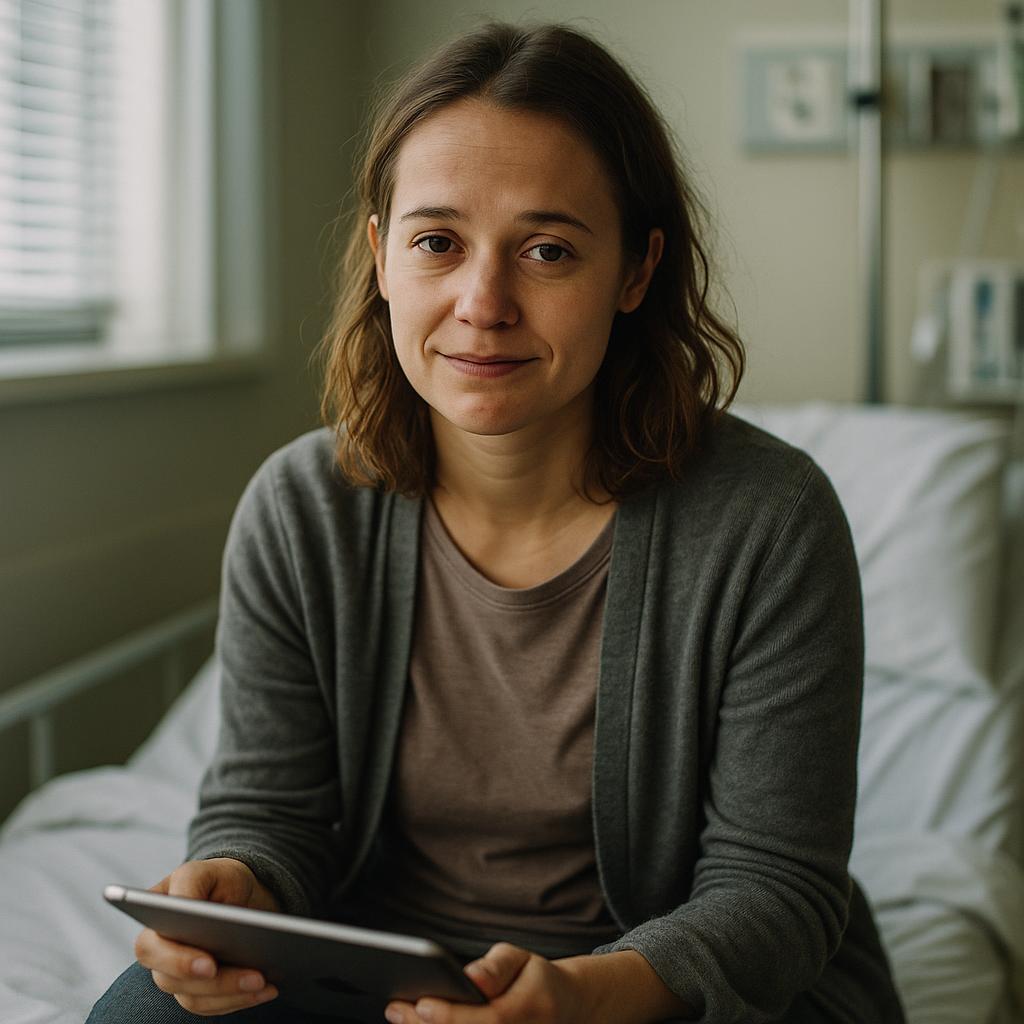 Image by RM AI
Image by RM AI
Learning to Sit Up
My first physical therapy session felt like my first day of kindergarten all over again—except this time, I was a 34-year-old man who couldn't even sit up without someone holding me. Pavel, my therapist, had the build of a former Olympic wrestler and hands that could probably crush walnuts, but he moved with surprising gentleness as he positioned my uncooperative body. 'Today we learn to sit,' he announced in his thick Eastern European accent, like we were about to climb Everest. I wanted to tell him I'd mastered sitting around age one, but sarcasm takes energy I didn't have. From the corner of the room, Megan watched, clutching her purse like it contained our old life. She smiled encouragingly whenever I looked her way, but there was something in her eyes I couldn't bear to examine too closely. Was it pity? Disappointment? Fear? After forty-five minutes of what felt like the most pathetic workout in human history—literally just trying to balance upright without toppling over—I was drenched in sweat and burning with humiliation. 'Good progress,' Pavel declared, while I wondered what universe he lived in where this qualified as 'progress.' What terrified me most wasn't the physical challenge ahead but the realization that dawned on me as Megan helped me back into my wheelchair: if sitting up was this hard, how would I ever become the man she had married again?
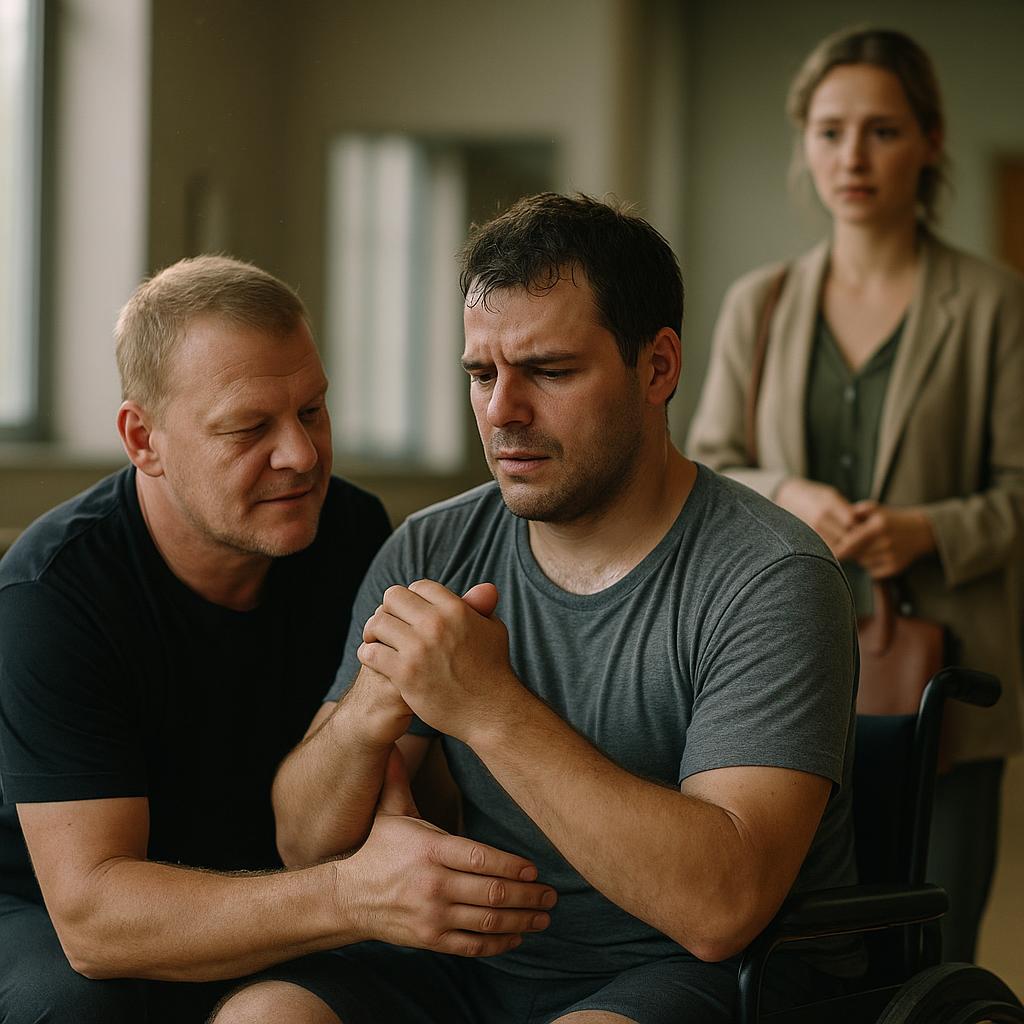 Image by RM AI
Image by RM AI
Coming Home
After twenty-three days of hospital food and the constant beeping of machines, I finally went home. Except it wasn't really home anymore—it was some bizarre alternate-universe version of our apartment. Megan had transformed our cozy space into what felt like a medical facility. The coffee table where we used to eat takeout was gone, replaced by a hospital bed with mechanical controls. Grab bars had appeared in the bathroom like metal mushrooms sprouting overnight. Our furniture had been rearranged to create pathways wide enough for my wheelchair, making our once-familiar living room feel like a maze designed by someone else. That first night, I stared at the unfamiliar ceiling, listening to the strange creaks of the rented bed. Megan had made up the couch for herself, just a few feet away but somehow feeling like miles. Around midnight, I heard it—the soft, muffled sound of crying she was trying desperately to hide. I kept my eyes closed, pretending to be asleep, too terrified to acknowledge what those tears might mean. We were both trapped in this new reality—me in my broken body, and Megan in a role she never signed up for. As I lay there, paralyzed in more ways than one, I wondered if our love was strong enough to survive what had happened to us, or if those quiet sobs were the beginning of the end.
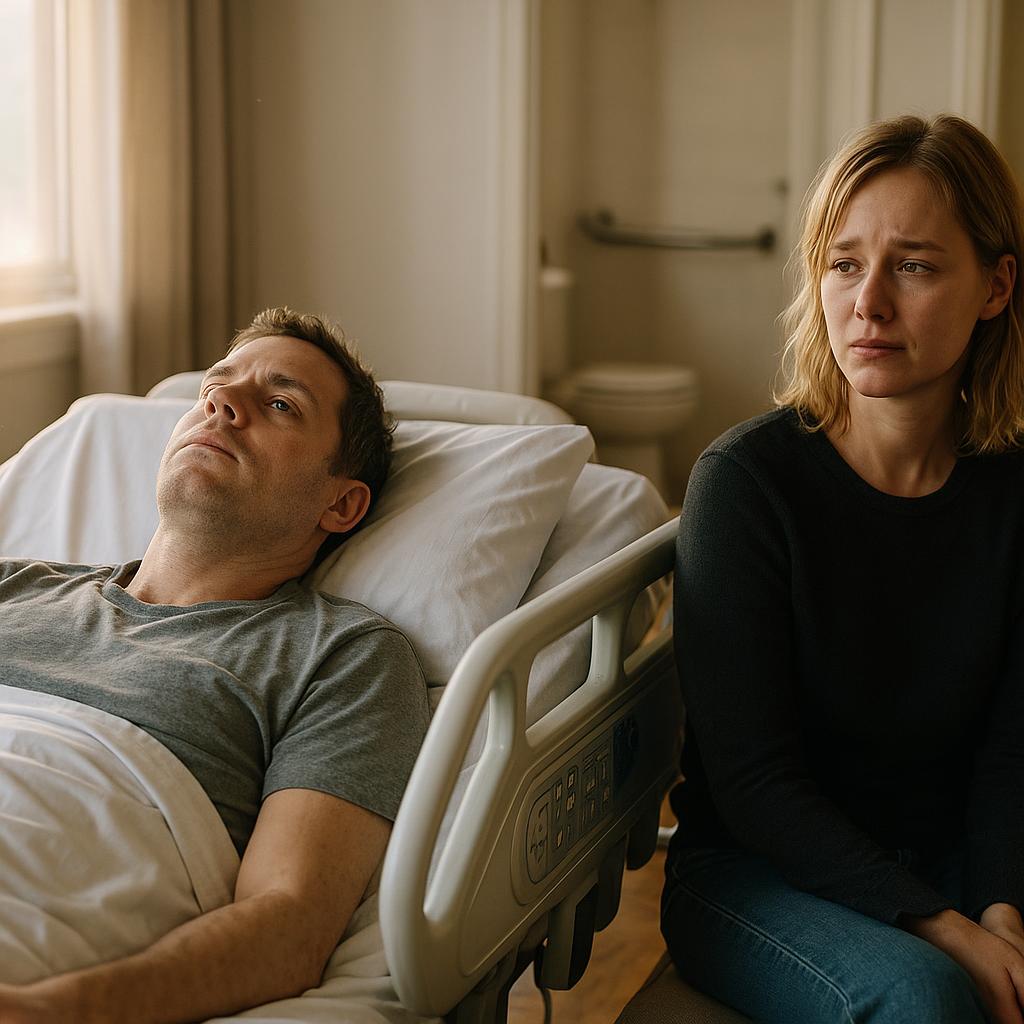 Image by RM AI
Image by RM AI
The New Normal
Our daily routine became a series of small humiliations that chipped away at my dignity piece by piece. Megan would help me shower, her eyes carefully avoiding mine as she washed parts of me that no spouse should have to clean. Getting dressed became a frustrating dance of limbs that wouldn't cooperate, with Megan patiently guiding my legs into pants while I gripped the bed rail, white-knuckled with frustration. The bathroom was the worst—the place where our marriage seemed to die a little more each day. I'll never forget the look on her face the first time she had to clean up after an accident—a mixture of determination and barely concealed revulsion that haunted me. 'It's okay,' she'd say, but we both knew it wasn't. The distance between us grew with each 'It's okay' until one morning, I caught her scrolling through photos on her phone—pictures of us hiking the Appalachian Trail last summer, both of us sun-kissed and smiling. When she noticed me watching, she quickly locked her screen, plastering on that forced smile I'd come to hate. That smile that said, 'I'm trying to remember why I loved you.' What she didn't realize was that I was asking myself the same question.
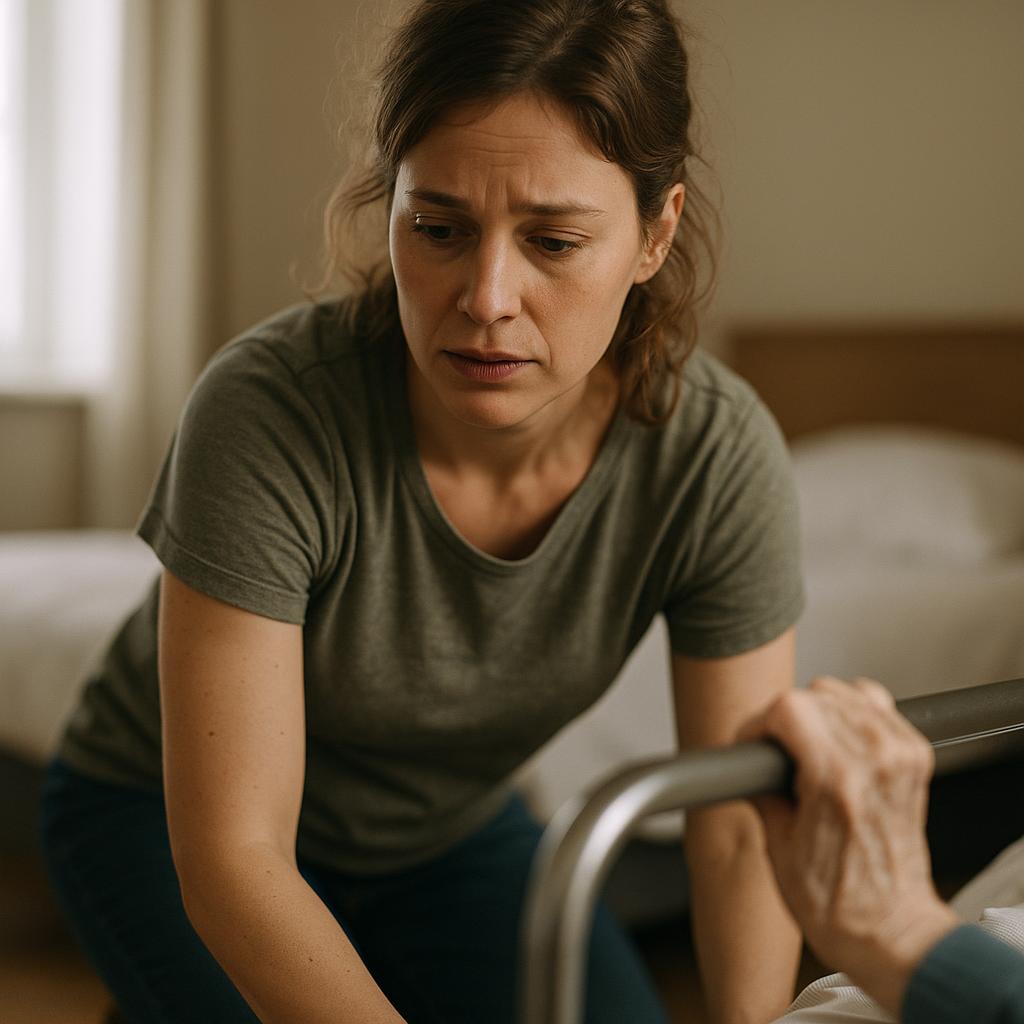 Image by RM AI
Image by RM AI
The First Fight
Six weeks into my new life, frustration had become my constant companion. I was pushing myself to the breaking point in therapy, desperate to see progress that wasn't coming fast enough. That Tuesday afternoon, I returned home from a particularly brutal session with Pavel, my body aching and my spirit crushed. When Megan suggested—in that careful, walking-on-eggshells voice she'd developed—that maybe I was pushing too hard, something in me snapped. 'You don't get it!' I shouted, my voice bouncing off the walls of our apartment that suddenly felt too small. 'You can still walk away from all this!' The moment those words left my mouth, I saw something shift in her eyes—like I'd accidentally voiced a thought she'd been secretly harboring. The silence between us was deafening. Without a word, she grabbed her keys and jacket, then walked out the door. The sound of it closing behind her felt like a gunshot. Hours passed with no text, no call. As darkness fell outside our window, I sat alone in my wheelchair, replaying those words over and over. I hadn't just been talking about walking physically—and we both knew it. When I finally heard her key in the lock around midnight, the look on her face told me everything I needed to know: the cracks in our marriage had just become chasms.
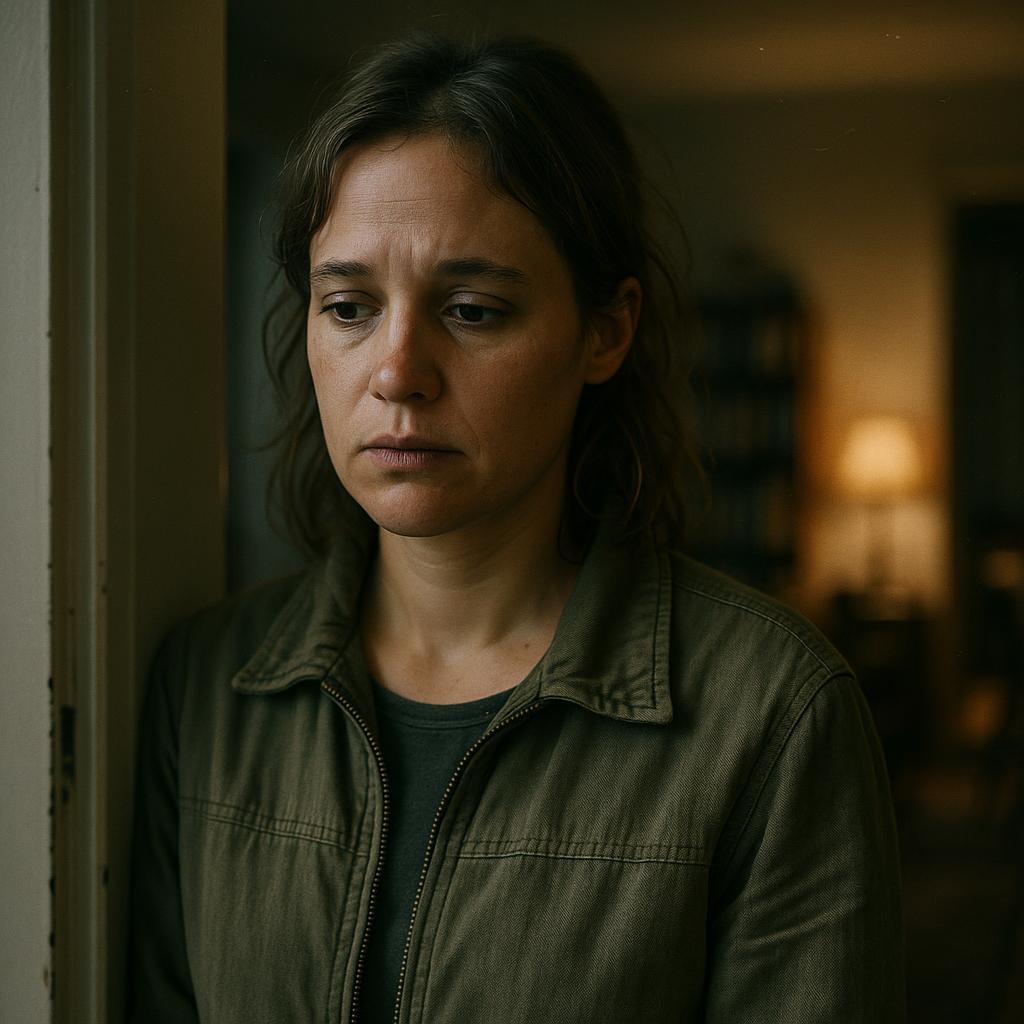 Image by RM AI
Image by RM AI
The First Signs
I started noticing the subtle shifts about two months after coming home. Megan's work hours mysteriously extended, her phone became permanently attached to her hand, and she'd flinch slightly whenever it buzzed. "Just a work thing," she'd say, turning the screen away from me. The woman who once shared everything was suddenly full of secrets. Our weekly couples therapy sessions—the ones Dr. Novak had strongly recommended—became solo appearances for me as Megan crafted increasingly elaborate excuses. "The Henderson project is behind schedule" or "Jen needs coverage for her shift." When she was home, she'd hover in doorways rather than sit beside me, as if ready for a quick escape. One night, after she declined dinner with my brother for the third time, I finally asked if everything was okay. "I'm just tired, Daniel. This is hard on me too, you know." Her words stung because they were true—this wasn't the life either of us had planned. But while I was trapped in my broken body, fighting for every inch of progress, she still had choices. And watching her eyes dart to her phone when it lit up with a text, I had the sinking feeling she was already making them.
 Image by RM AI
Image by RM AI
The Phone Call
I couldn't sleep that night, my mind replaying what I'd heard earlier. It was around 11 PM when I'd wheeled myself down the hallway for a glass of water. That's when I heard Megan's voice coming from our bedroom—our bedroom that had essentially become hers alone since the accident. The door was cracked open, and her words slipped through like poison. 'I can't keep doing this,' she whispered into her phone, her voice breaking. 'I feel like I'm drowning. This isn't what I signed up for.' My heart stopped. Who was she talking to? When she finally emerged and saw me sitting there in the hallway, her face went pale. 'Oh! I didn't know you were up,' she stammered, clutching her phone to her chest. I asked who she was talking to so late. 'Just my mom,' she said too quickly. 'Venting about work stress.' But I'd never heard her use that tone with her mother—intimate, desperate, almost pleading. That night, as I lay in my hospital bed in what used to be our living room, I stared at the ceiling fan making slow circles above me. Three months ago, I would have known instantly if Megan was lying. Now, I wasn't sure I knew her at all. What I did know was that whoever was on the other end of that call was hearing things about me, about us, that I wasn't allowed to hear myself.
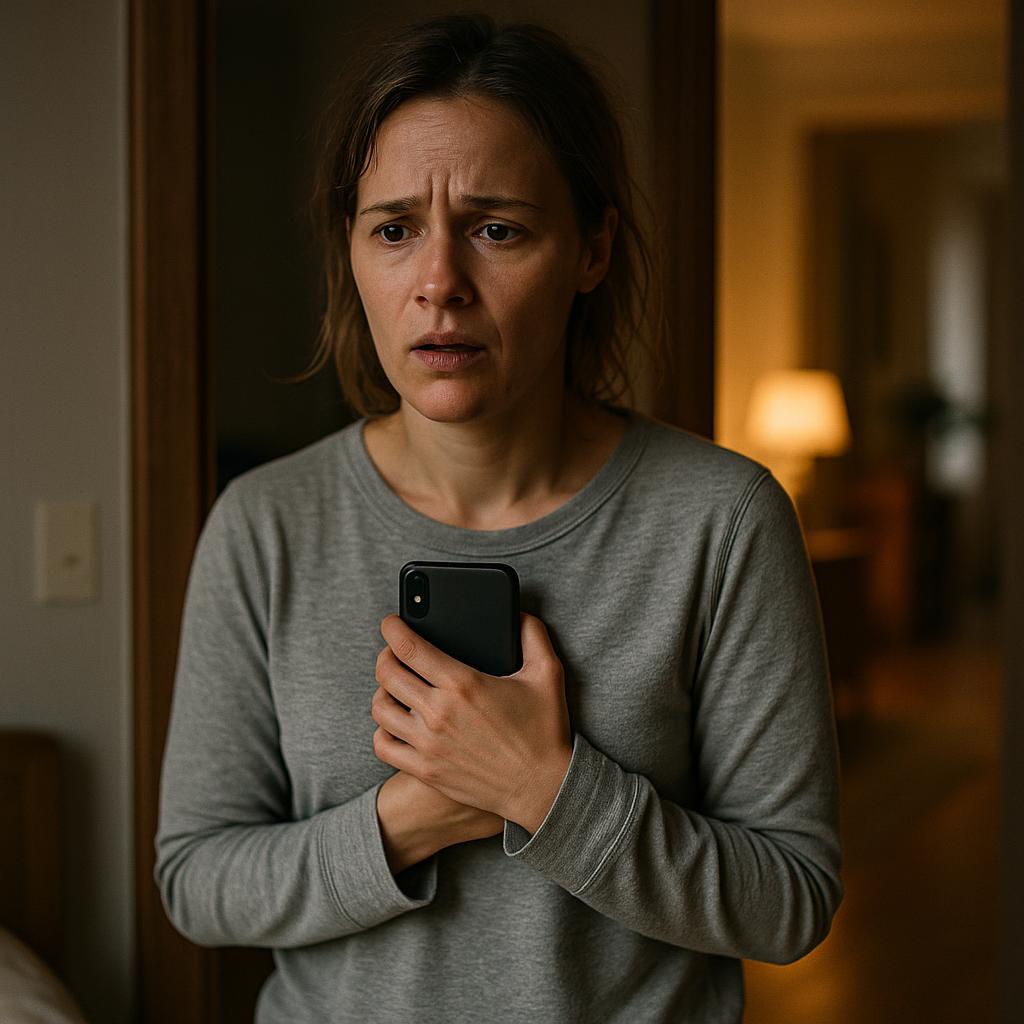 Image by RM AI
Image by RM AI
The Visitor
James became my lifeline as Megan's presence in our home grew increasingly scarce. My younger brother started dropping by almost daily, usually timing his visits for when Megan was conveniently "at work." He'd help me with the exercises Pavel had assigned, restock our empty fridge, and just sit with me watching basketball games like we used to—before my life shattered into pieces. There was something comforting about his unwavering presence, the way he never looked at me with pity. One Tuesday afternoon, as we were demolishing a pizza he'd brought over, James cleared his throat awkwardly. "Hey, Dan... is everything okay with you and Megan?" The question hung in the air between us. When I didn't immediately respond, he continued, "It's just—I saw her yesterday at that coffee place near her office. She was with some guy. They seemed... close." My heart sank, but my defenses rose instantly. "She works with lots of people, James. They have projects and meetings and stuff." The words sounded hollow even to my own ears. James just nodded, dropping the subject, but the seed of doubt had been planted. That night, I stared at Megan's side of the bed—empty again—and wondered if the accident had broken more than just my spine.
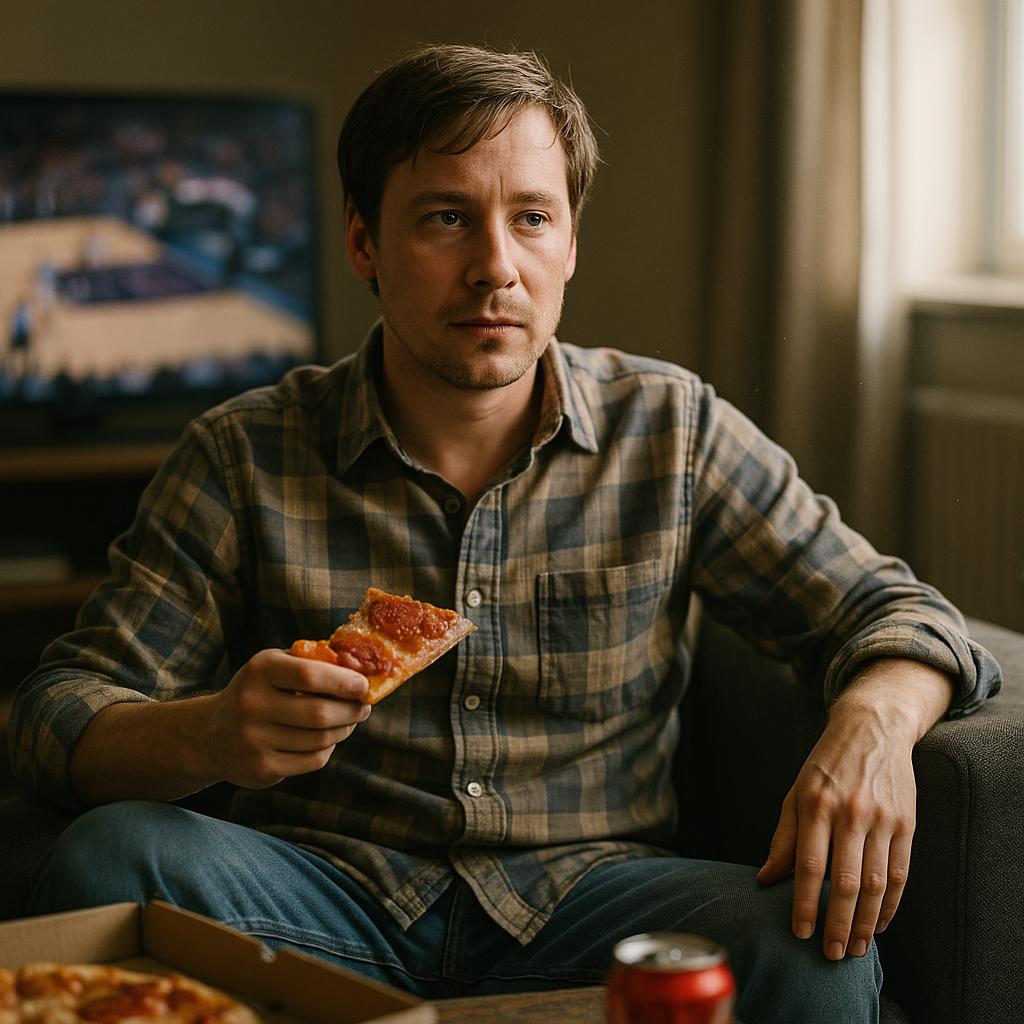 Image by RM AI
Image by RM AI
The Milestone
Four months into my new life, I finally had something to celebrate. Pavel had been working with me on transfers—that crucial movement from wheelchair to regular chair that represented a small piece of independence. After weeks of failed attempts and sore arms, I finally nailed it. No assistance, just my own strength. I must have practiced it twenty times that afternoon, each successful transfer feeling like I'd summoned some kind of superpower. I couldn't wait to show Megan. I imagined her face lighting up, maybe even seeing a glimpse of the man she fell in love with. I ordered her favorite takeout and waited. And waited. At 7:30, my phone buzzed with her text: "Working late. Don't wait up." The food grew cold as I sat there, still rehearsing my transfer technique until my arms trembled with exhaustion. When she finally walked through the door after 10, her perfume seemed stronger than usual. "Megan, watch this," I said, performing the transfer I'd practiced all evening. She glanced up from her phone, offered a distracted "That's great, babe" and disappeared into the bathroom. I sat there in the regular dining chair—the one I hadn't been able to use for months—feeling more alone than I ever had in my wheelchair. The milestone that had felt monumental hours earlier now seemed pathetically small, and I wondered if anything I could achieve in this broken body would ever be enough to bring her back to me.
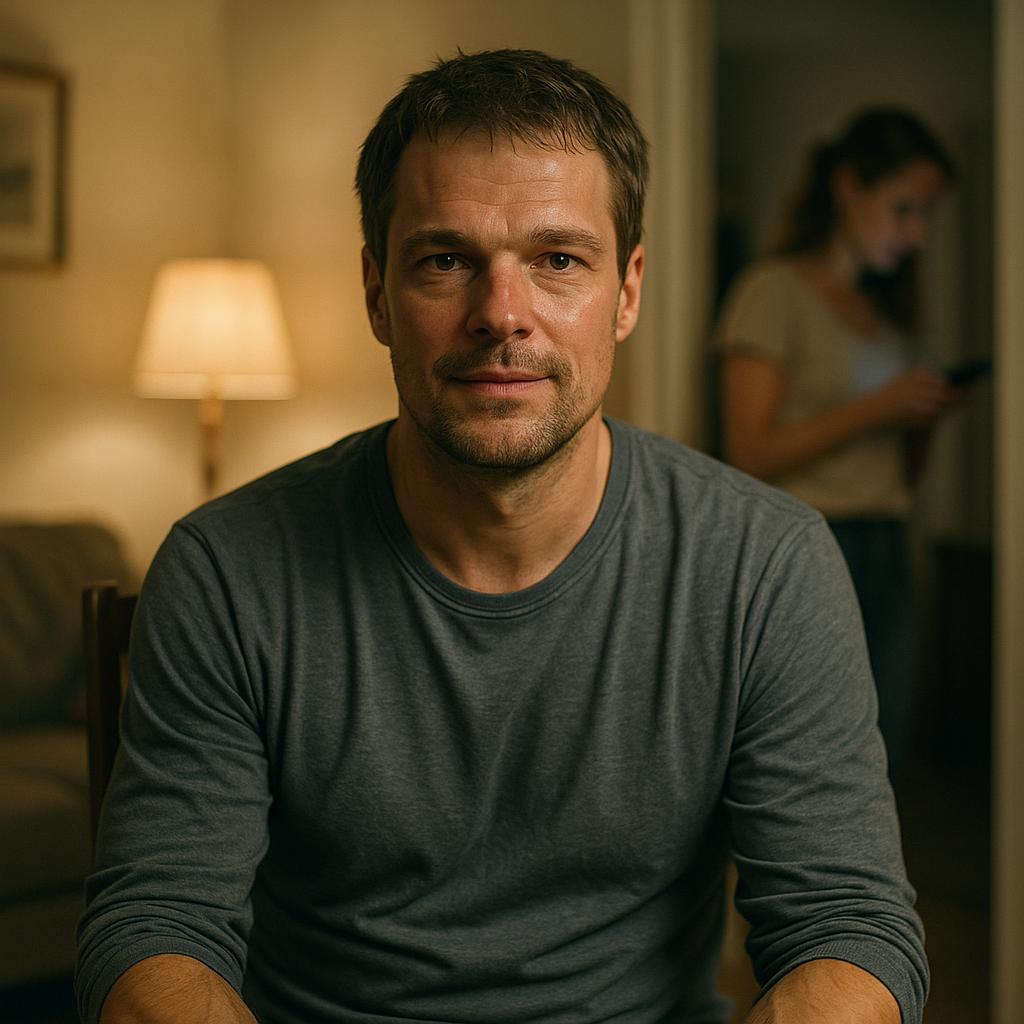 Image by RM AI
Image by RM AI
The Evidence
I'm not proud of what I did next, but desperation makes you cross lines you never thought you would. One morning while Megan was in the shower—the sound of running water masking my movements—I grabbed her phone from the nightstand. My hands trembled as I swiped up, relieved to find she hadn't changed her passcode since before the accident. There they were: dozens of texts from someone named 'Mark.' Her coworker. The one who'd been 'helping her deal with the stress' of having a husband in a wheelchair. Nothing explicitly romantic jumped out at me, but the intimacy was unmistakable. 'You deserve better than this.' 'I'm here whenever you need to escape.' 'No one would blame you for walking away.' Each message felt like another vertebra snapping in my spine. I was so absorbed in my discovery that I didn't hear the shower stop. When I looked up, Megan stood in the doorway, wrapped in a towel, droplets of water still clinging to her shoulders. Her eyes darted from my face to her phone in my hands, and in that moment, something shifted between us. The look on her face—not guilt, not anger, but relief—told me everything I needed to know. She was glad I knew. The charade could finally end.
 Image by RM AI
Image by RM AI
The Confrontation
I held her phone in my hand like it was a bomb about to detonate. 'Are you having an affair?' I asked, my voice steadier than I expected. Megan's face went through a series of expressions—shock, anger, then something that looked disturbingly like relief. 'It's not what you think,' she stammered, running her fingers through her still-wet hair. 'Mark is just a friend. He's been helping me cope with... everything.' But her eyes couldn't meet mine, darting around the room like trapped birds. We argued for hours, our voices rising and falling like the tide, going in endless circles until my throat was raw. 'I've been leaning on him emotionally,' she finally admitted around midnight, perched on the edge of the couch as far from my wheelchair as possible. 'But it's not physical, I swear.' I wanted to believe her—God, I needed to believe her—but something had shifted between us. The truth hung in the air like smoke: whether or not she'd slept with him, she'd already given him parts of herself she was no longer sharing with me. As I watched her curl up on the couch that night, her back to me, I realized that sometimes betrayal doesn't need a kiss or a touch to destroy everything you thought was solid.
 Image by RM AI
Image by RM AI
The Attempt
After our explosive confrontation, Megan seemed to shift into damage-control mode. She suddenly took a week off work—something she hadn't done since my accident—and started planning activities for us. Movie nights with my favorite films, researching wheelchair-accessible hiking trails, even cooking my mom's lasagna recipe she'd always claimed was "too complicated." For seven days, I let myself believe we were healing. The way she held my hand during movies, how she laughed at my terrible jokes again—it felt like glimpses of our old life were possible. Then came Tuesday. I was looking for her chapstick in her purse (at her request) when my fingers brushed against a glossy pamphlet. "Supporting Your Loved One While Supporting Yourself: A Caregiver's Guide." Innocent enough, until I saw the section she'd circled in red pen: "When to Know It's Too Much: Recognizing Your Breaking Point." My stomach dropped as I read the bullet points beneath—they might as well have been describing our life together. I carefully returned it exactly as I'd found it, the weight of those circled words heavier than my useless legs had ever felt. That night, as she cheerfully suggested we try a new Thai place that had ramp access, I wondered if her sudden attentiveness wasn't reconciliation at all, but her final attempt to convince herself she'd tried everything before walking away.
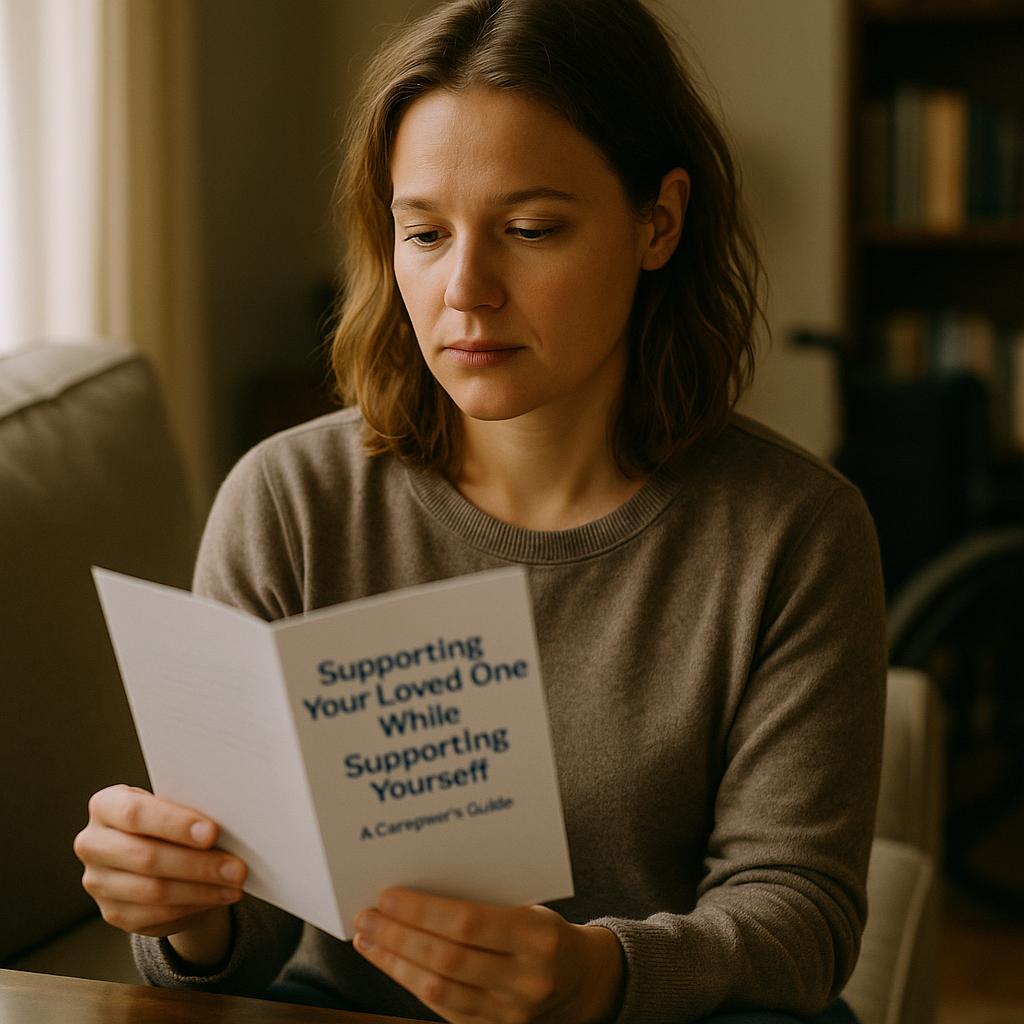 Image by RM AI
Image by RM AI
The Therapy Session
Dr. Linden's office felt like neutral territory—the only place where Megan and I could speak honestly without our apartment's walls closing in on us. The room was deliberately calming: soft lighting, plants in every corner, and chairs arranged in a triangle so no one felt cornered. Our third session started like the others, with gentle check-ins about our week. But twenty minutes in, something cracked open in Megan. 'I just...' Her voice trembled as tears spilled down her cheeks. 'I love you, Daniel, but I don't know if love is enough.' The words hung in the air between us like smoke. 'I didn't sign up to be a caretaker for the rest of my life.' Dr. Linden nodded sympathetically while I sat frozen in my wheelchair, feeling myself being erased, reduced to nothing but a burden. Not a husband. Not a partner. Just a responsibility she hadn't planned for. The worst part wasn't her admission—I'd sensed it for weeks—but the relief that washed over her face once the words were out. As if finally saying it aloud had lifted some invisible weight from her shoulders. Dr. Linden asked how I felt hearing this, but what could I possibly say? That I was sorry my broken body had become her prison? That I wished the car had finished the job so she could be free? Instead, I just stared at my useless legs and wondered which would hurt more: watching her slowly resent me for years, or letting her go now while some small part of her still remembered loving me.
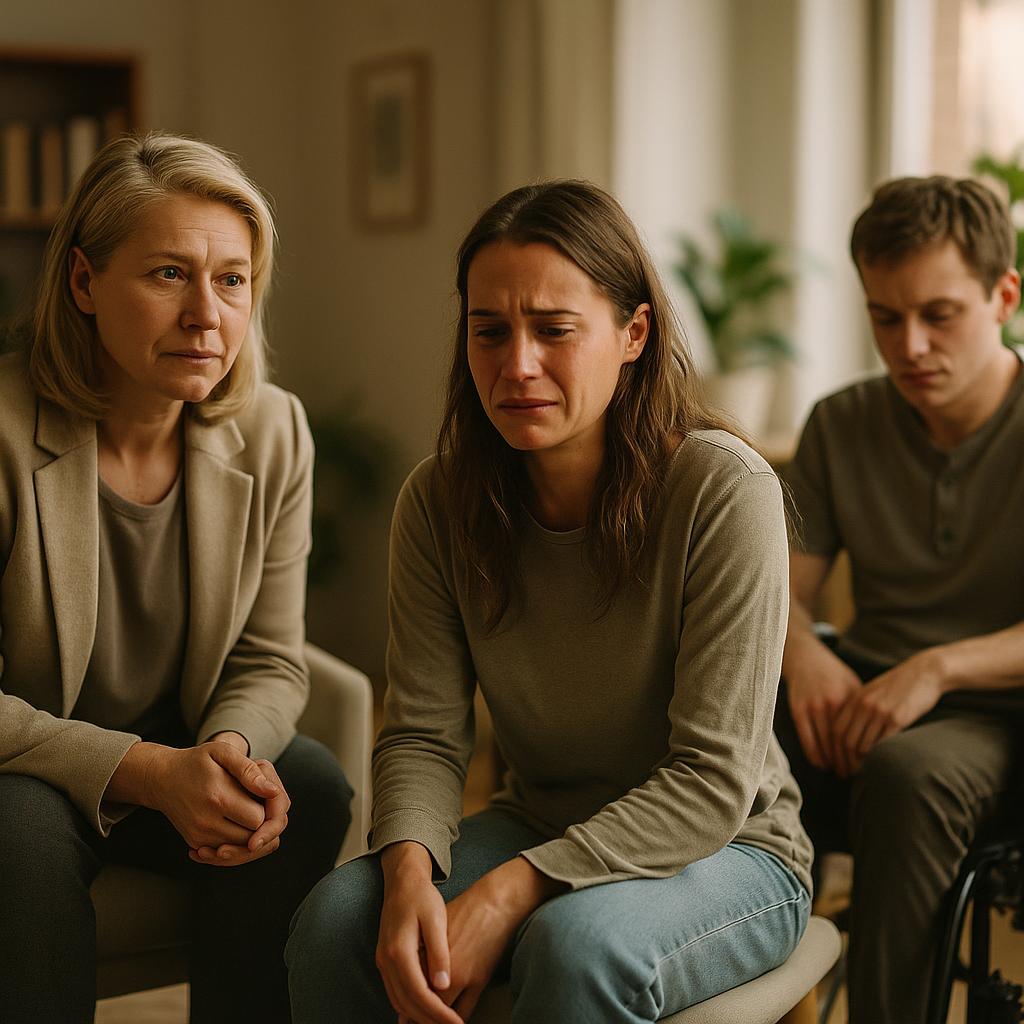 Image by RM AI
Image by RM AI
The Breaking Point
I'll never forget the look on Megan's face when I wheeled myself through our front door that afternoon. There was no surprise, no guilt—just resolution. My body was already screaming from Pavel's brutal therapy session, but the sight of her suitcase on our couch sent pain shooting through me that had nothing to do with my broken spine. 'I can't do this anymore,' she said, her voice eerily calm as she folded a sweater I'd bought her last Christmas. 'I didn't sign up to be a caretaker. I need to think about my own future.' The words hung in the air between us like a physical barrier. I waited for more—for tears, for apologies, for some acknowledgment of our twelve years together—but there was nothing. Just the methodical sound of her packing while I sat there, paralyzed in more ways than one. I wanted to scream, to beg, to remind her of our vows—'in sickness and in health'—but the words died in my throat. Because deep down, hadn't I been waiting for this moment? Hadn't I seen it coming in every averted gaze, every unanswered text, every night she chose to sleep on the couch? What destroyed me wasn't just that she was leaving—it was how ready she'd been to go.
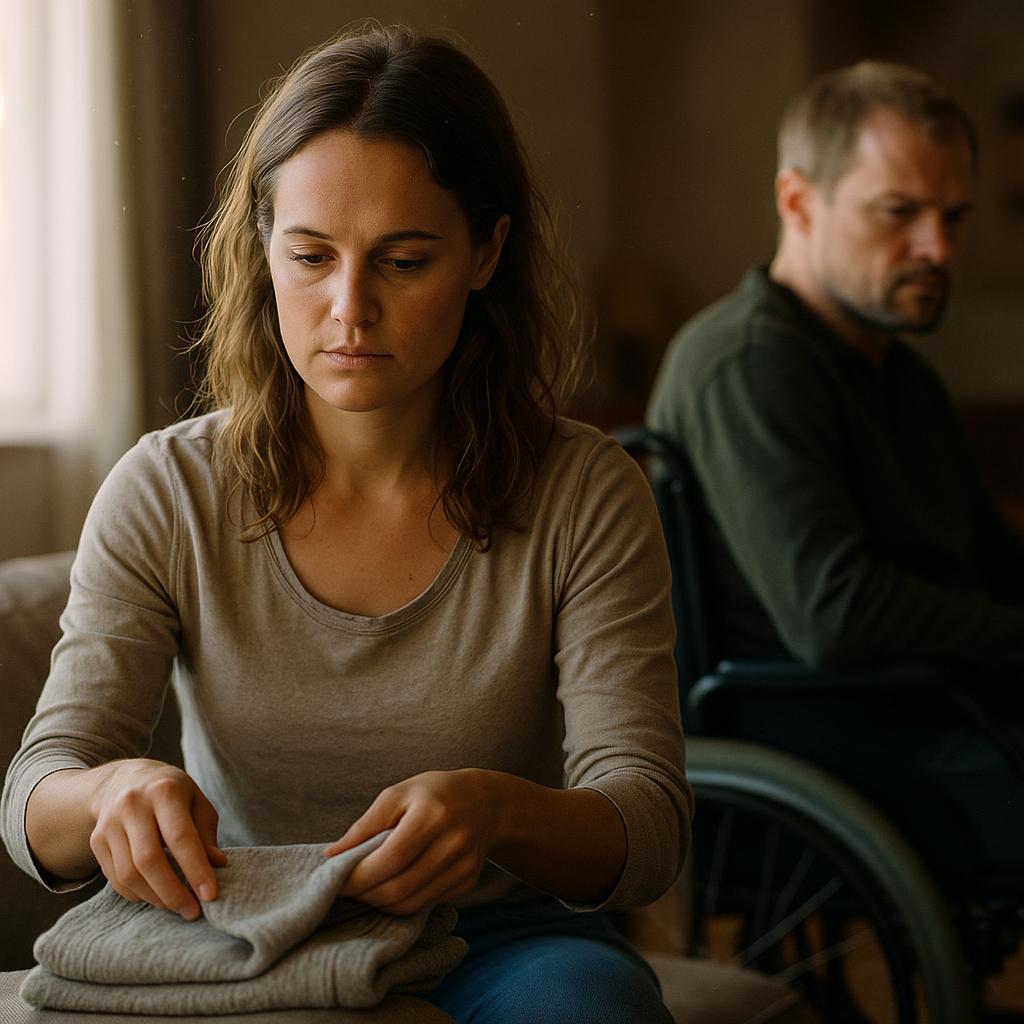 Image by RM AI
Image by RM AI
The Abandonment
I sat in my wheelchair, frozen in disbelief as Megan methodically packed the last of her things. Twelve years of marriage reduced to a suitcase and a goodbye. The silence between us was deafening, broken only by the zip of her luggage and my shallow breathing. 'Where will you go?' I finally managed to ask, my voice barely above a whisper. Her hesitation told me everything I needed to know. The slight flush in her cheeks, the way she suddenly became fascinated with folding a t-shirt she'd already folded twice. She had somewhere—someone—waiting. 'I'll be staying with a friend for now,' she said, not meeting my eyes. We both knew which 'friend' she meant. Mark. The coworker who'd been her emotional support while I fought to rebuild my broken body. When she finished packing, she walked over and kissed my forehead like I was a child, or worse—a patient. 'I'm sorry, Daniel,' she whispered, and then she was gone. The door closed behind her with a soft click that somehow hurt more than if she'd slammed it. I sat there, paralyzed in more ways than one, in an apartment filled with doorways too narrow for my chair and cabinets I couldn't reach. The cruel irony wasn't lost on me—she could walk away from our marriage, while I couldn't even follow her to the door to beg her to stay.
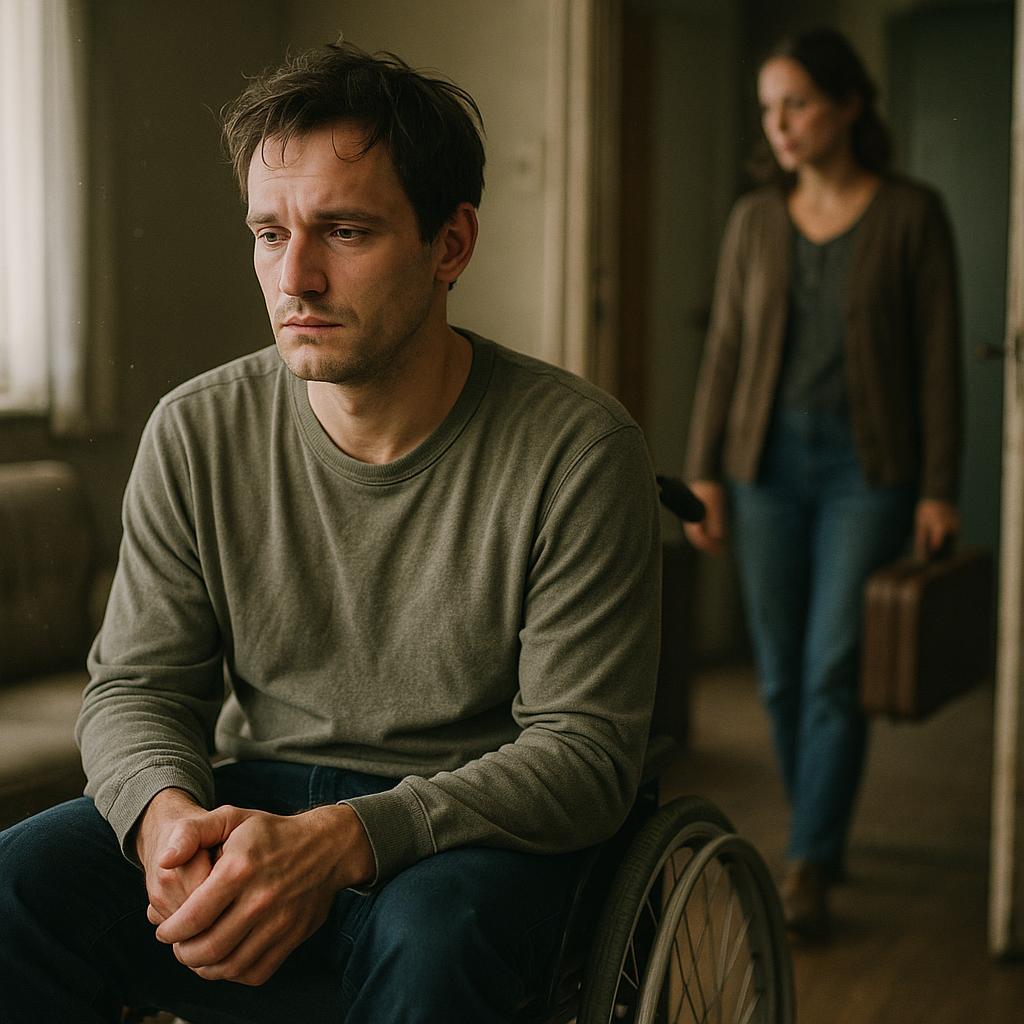 Image by RM AI
Image by RM AI
The First Night Alone
That first night after Megan left was the closest I've ever come to completely giving up. The apartment felt cavernous and hostile—a space designed for someone who could stand, reach, and move freely. I stared at my medication on the top shelf, the one Megan had always retrieved for me, now impossibly out of reach. My stomach growled, but the thought of trying to navigate the kitchen alone overwhelmed me. I called her phone seventeen times, each unanswered ring driving the knife deeper. By 3 AM, I was still sitting in my wheelchair in the dark living room, unable to even transfer to bed without her help. The humiliation burned worse than the pain in my back. When I finally broke down and called James, my voice cracked as I tried to explain. 'I can't...' was all I managed to say before the tears came. Twenty minutes later, he was at my door in sweatpants and bedhead, not a trace of judgment in his eyes. 'I got you, big brother,' he said simply, helping me into bed. As he set up a makeshift bed on my couch, I realized something that would eventually save me: Megan may have abandoned me, but I wasn't actually alone.
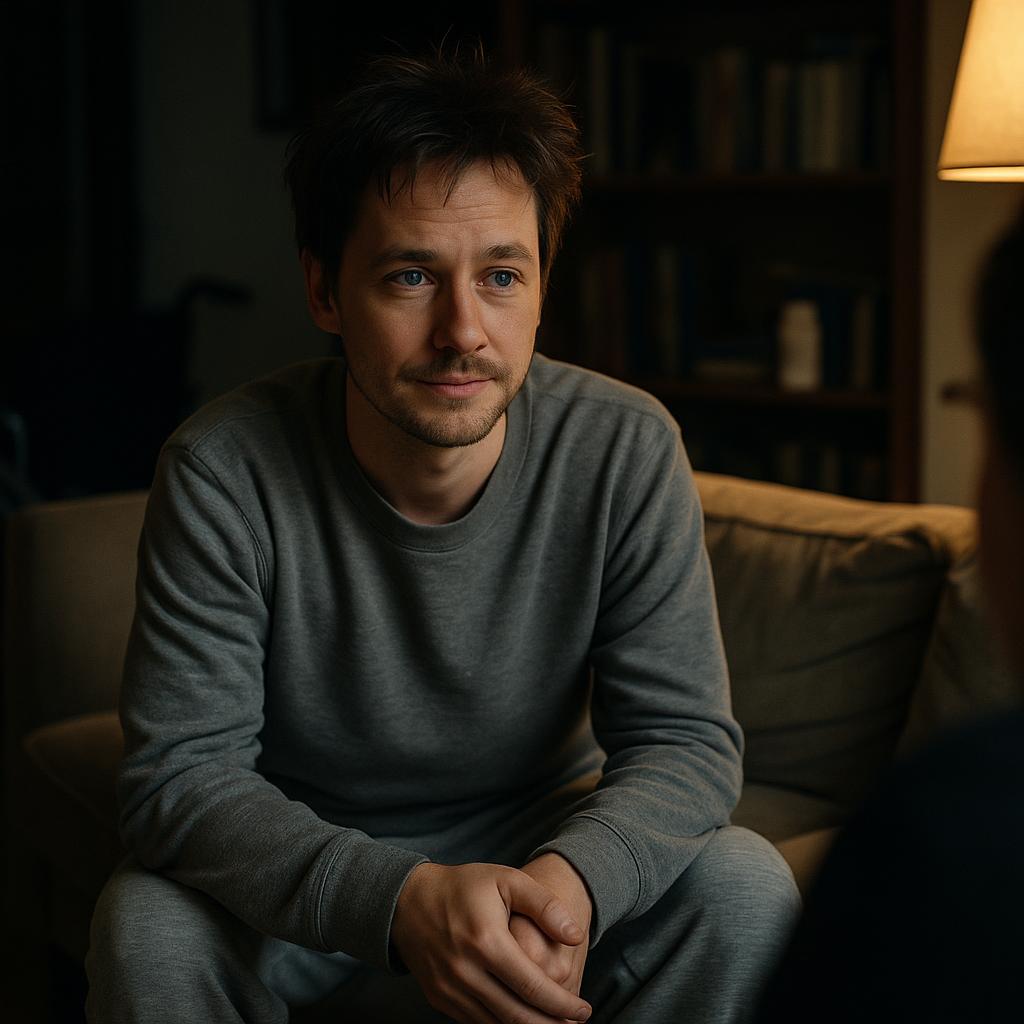 Image by RM AI
Image by RM AI
The Brother
I woke up the next morning to the smell of coffee and the sound of furniture being dragged across the floor. For a moment, I forgot everything—the accident, Megan leaving, my desperate 3 AM call. Then I saw James in the kitchen, his hair sticking up in all directions, methodically lowering items from the highest shelves to countertop level. 'Morning,' he said casually, as if showing up in the middle of the night to rescue your broken brother was the most normal thing in the world. 'I made coffee. And I called in sick to work.' Before I could protest, he held up his hand. 'Not negotiable, Dan. I'm staying until we figure this out.' Throughout that day, I watched my little brother transform my apartment—the one Megan had walked out of because it was too much work—into a space I could actually navigate. He lowered the microwave, rearranged furniture to create wider pathways, and installed grab bars in the bathroom. 'Why are you doing all this?' I finally asked as he assembled a shower chair. He looked at me like I'd asked why water was wet. 'Because you'd do it for me,' he said simply. And in that moment, I realized something profound: sometimes the people you expect to stay are the first to leave, while the ones you never thought to rely on become your foundation.
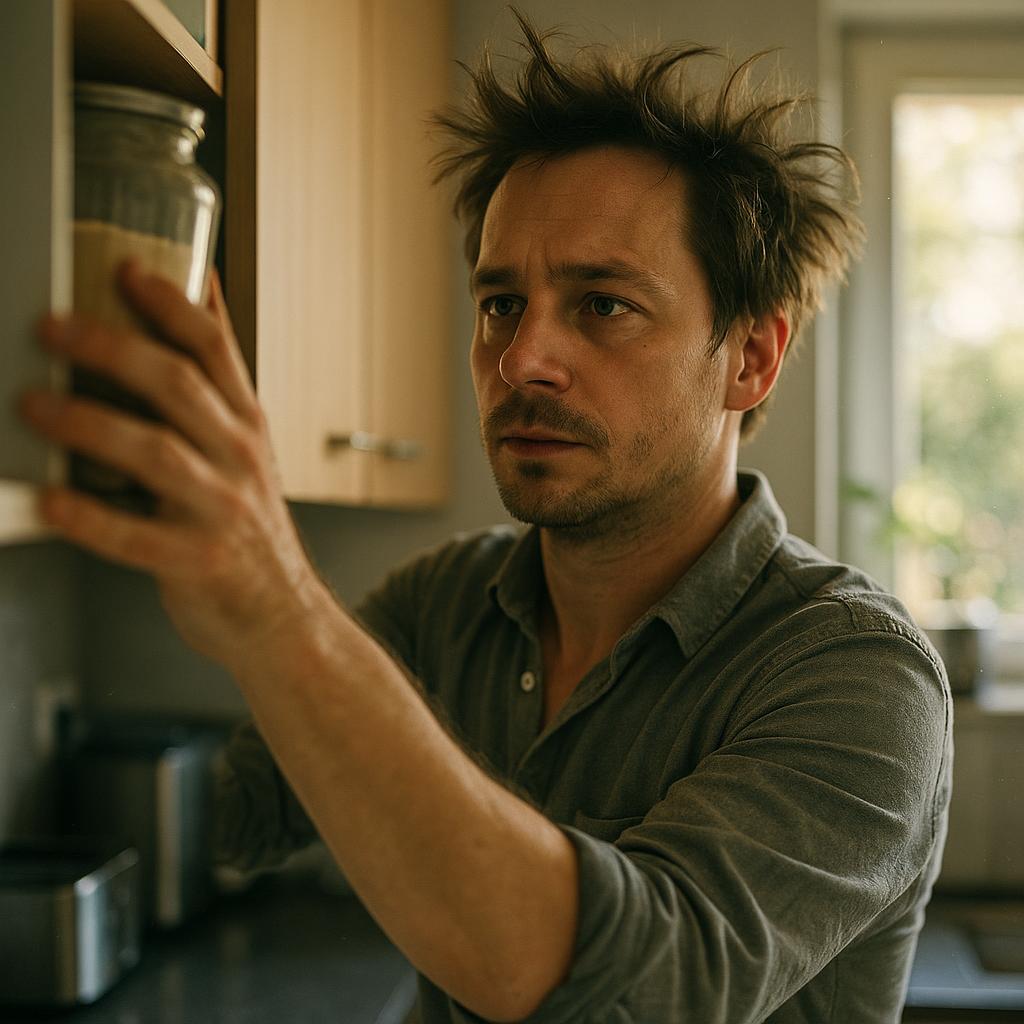 Image by RM AI
Image by RM AI
The Truth Comes Out
Three days after Megan walked out of my life, her sister Claire showed up at our apartment—correction, my apartment now. The awkwardness was palpable as she moved around the space, carefully avoiding eye contact while stuffing Megan's clothes into cardboard boxes. I sat in my wheelchair watching her, feeling like a ghost in what used to be my own home. 'She's staying with Mark, isn't she?' I finally asked, my voice steadier than I expected. Claire froze, a sweater clutched in her hands. Her silence answered before her words could. 'Daniel, I...' she started, then sighed deeply. 'Yes. They've been close for months.' She finally looked at me, guilt written across her face. 'I told her this wasn't the way to handle it. I told her you deserved better.' The confirmation hit me like a physical blow. All those late nights at 'work,' all those texts, all those excuses—they weren't just emotional support. They were building a life raft to escape me while I was drowning. 'How long?' I asked, not sure I wanted the answer. Claire's response made me realize that while my accident may have broken my body, Megan's betrayal had started long before any bones were shattered.
 Image by RM AI
Image by RM AI
The Divorce Papers
The manila envelope sat on my coffee table like a bomb waiting to detonate. 'Daniel Jacobson vs. Megan Jacobson,' it read in cold, impersonal type. The courier had handed it to me with the casual indifference of someone delivering a pizza, not the death certificate of a twelve-year marriage. 'Irreconcilable differences' – that's what she'd cited as grounds. As if my wheelchair was just a disagreement we couldn't work through, like arguing over what color to paint the kitchen. I stared at those papers for hours, my fingers tracing over Megan's signature – already there, already certain. James found me like that, still in the same position, the papers untouched except for tear stains blurring some of the legal jargon. 'You don't have to sign them right away,' he said gently, placing his hand on my shoulder. But we both knew the truth. Delaying wouldn't magically heal my spine. It wouldn't make Megan realize that love was supposed to be stronger than inconvenience. It wouldn't undo her moving in with Mark. I picked up the pen, my hand shaking so badly I could barely grip it. 'I never thought I'd be divorced at thirty-four,' I whispered, 'especially not because I became too broken to love.' What hurt most wasn't signing away my marriage – it was realizing that while I was fighting to rebuild my body, Megan had already decided I wasn't worth rebuilding our life for.
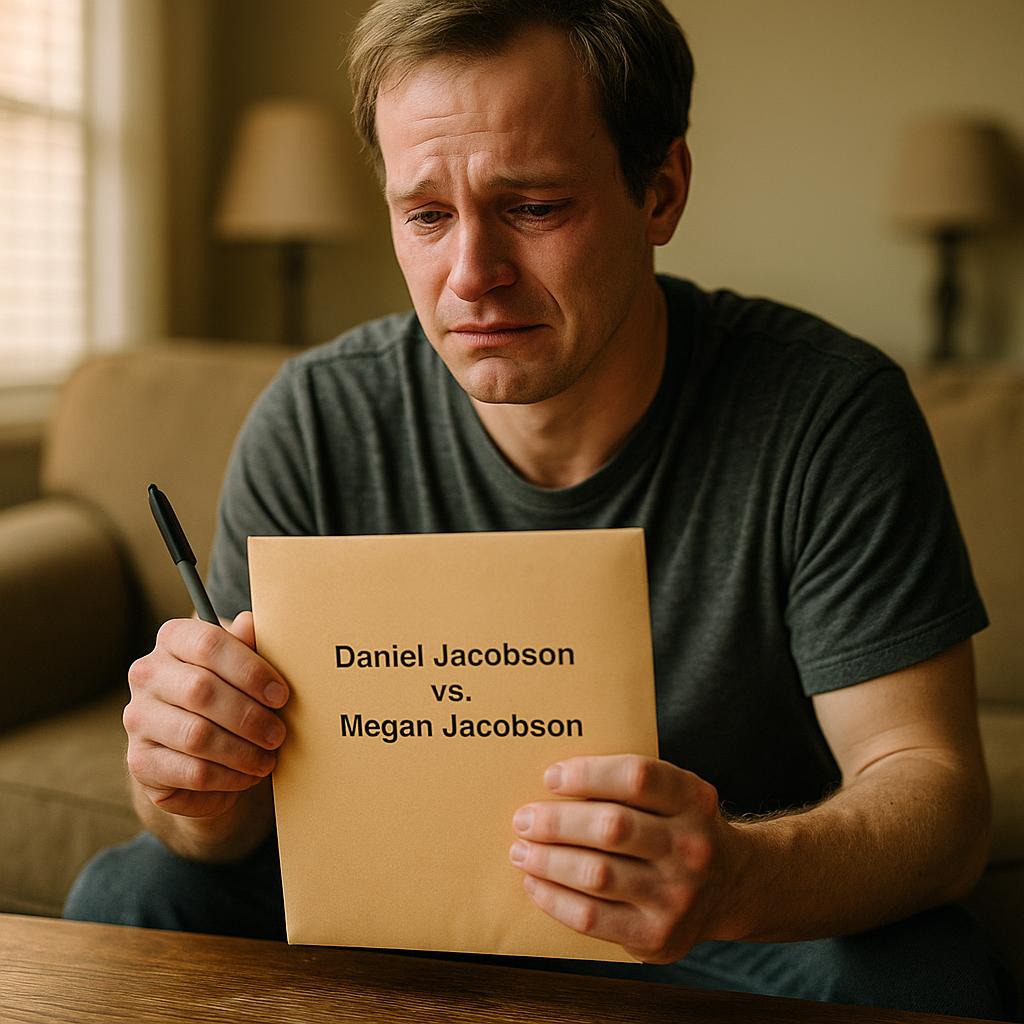 Image by RM AI
Image by RM AI
The Spiral
The weeks after Megan left became a blur of darkness. I stopped going to physical therapy—what was the point? I wasn't rebuilding my body for her anymore, and I couldn't imagine anyone else would want what was left of me. James would set up my appointments, and I'd cancel them the moment he left for work. 'You're giving up,' he said one night, frustration finally breaking through his patience. 'She's not worth throwing your life away.' But it wasn't just about Megan anymore. It was about facing a future where I'd always be the burden, always be the one people stayed with out of obligation. I pushed James away—ignored his calls, snapped at him when he visited, did everything I could to prove I was right about being better off alone. One particularly dark night, after he'd finally fallen asleep on my couch, I wheeled myself to the bathroom and lined up my pill bottles on the counter. Antidepressants, pain medication, muscle relaxers—enough to make it all stop. I sat there for what felt like hours, calculating doses, wondering if anyone would really miss me or if they'd just feel relief that they didn't have to take care of me anymore. My fingers trembled as I opened the first bottle, not yet sure if I was brave enough to do it or brave enough not to.
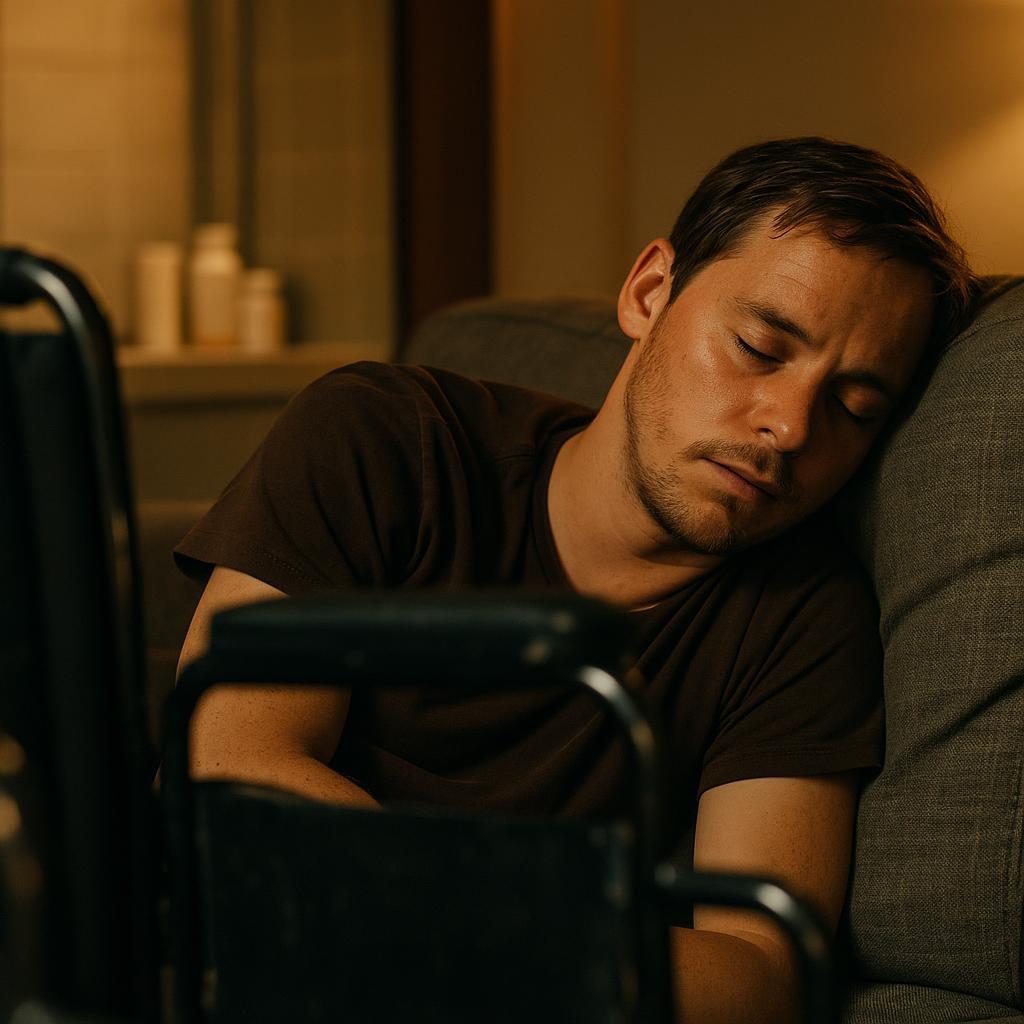 Image by RM AI
Image by RM AI
The Intervention
I didn't swallow those pills that night. Something stopped me—maybe fear, maybe hope, or maybe just the thought of James finding me. But the next morning, I knew something was different about him. He kept watching me with this intensity that said he knew exactly what I'd almost done. By afternoon, my apartment door opened without warning, and suddenly my living room was filled: James, my mother with her lips pressed into that determined line I knew too well, Dr. Novak with his clipboard, and Pavel, my physical therapist who I'd been ghosting for weeks. 'What is this?' I asked, though I already knew. My mother knelt in front of my wheelchair, taking my hands in hers. 'This is us refusing to let you disappear,' she said, her voice cracking. 'Megan gave up on you. Don't you dare give up on yourself too.' The words hit like a slap. James showed me the pill bottles he'd found rearranged. Pavel silently placed my missed therapy schedule on the table. Dr. Novak talked about depression after trauma being normal but not terminal. I wanted to wheel away, to escape their concerned faces, but there was nowhere to go. 'We're not leaving,' James said firmly, 'not until you agree to start fighting again.' What they didn't understand was that fighting seemed pointless when the person I'd been fighting for had walked away so easily. But looking at their faces—stubborn, loving, afraid—I realized something that would change everything: maybe I needed to start fighting for myself instead.
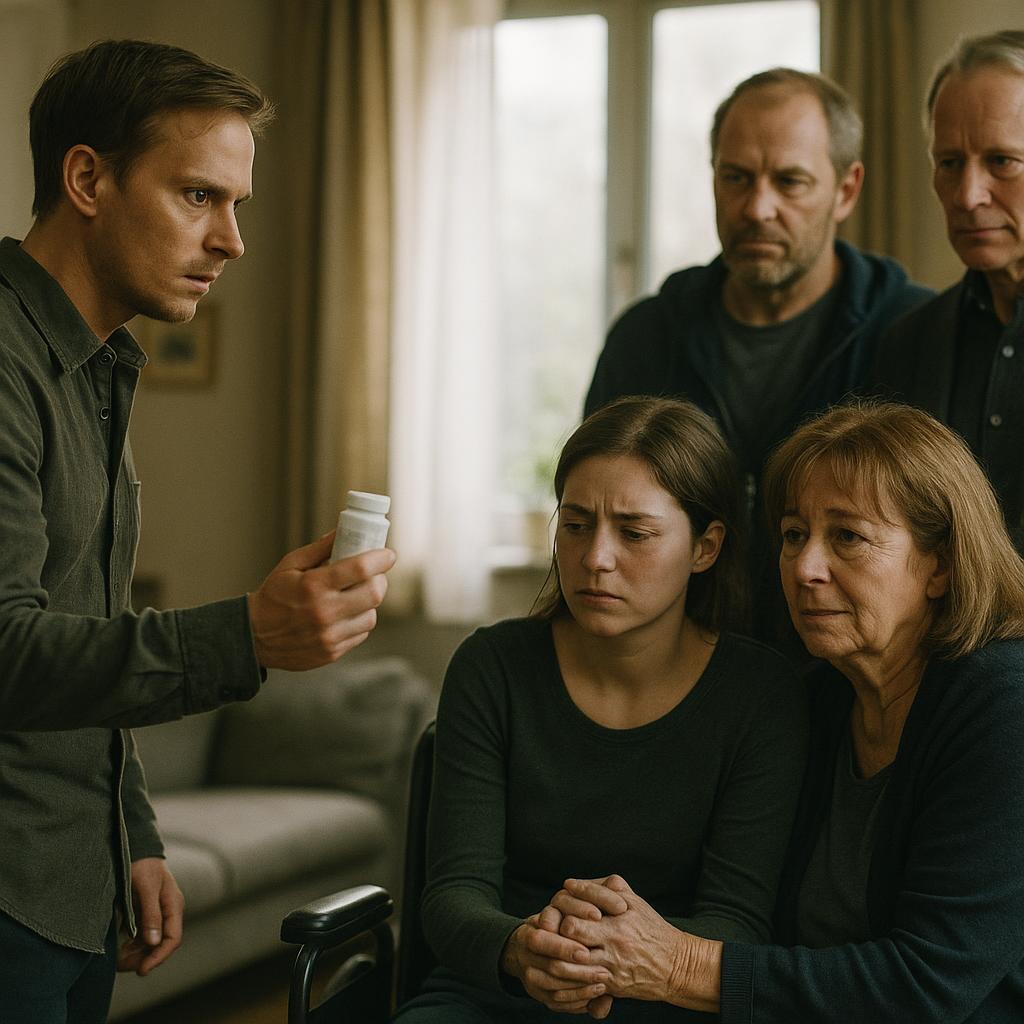 Image by RM AI
Image by RM AI
The New Plan
That intervention hit me like a freight train of reality. I sat in my wheelchair, surrounded by people who refused to let me fade away, and felt something I hadn't experienced since before the accident: purpose. Dr. Novak laid out a therapy plan that made my previous one look like a warm-up, complete with weekly goals and milestones that seemed impossible. 'This won't be easy,' he warned, his eyes locked on mine, 'but neither is giving up.' Pavel, with his Eastern European bluntness, simply nodded and said, 'Now we work for real, Daniel.' My mother, in her typical no-nonsense fashion, had already packed three suitcases and informed me she was moving in 'until further notice.' She'd already rearranged my kitchen by the end of the day. Meanwhile, James showed me photos of a ground-floor apartment with wide doorways and a roll-in shower that could accommodate two wheelchairs—though he only needed one. 'Roommates,' he said with a shrug, as if it was the most natural solution in the world. 'I've always wanted to live with my big brother anyway.' For the first time since Megan walked out that door, I felt the faintest flicker of hope. Not because someone else was going to fix me, but because these people were giving me the tools to fix myself. What I didn't realize then was that rebuilding my life would lead me to someone who would see my wheelchair not as a burden, but as just another part of who I was.
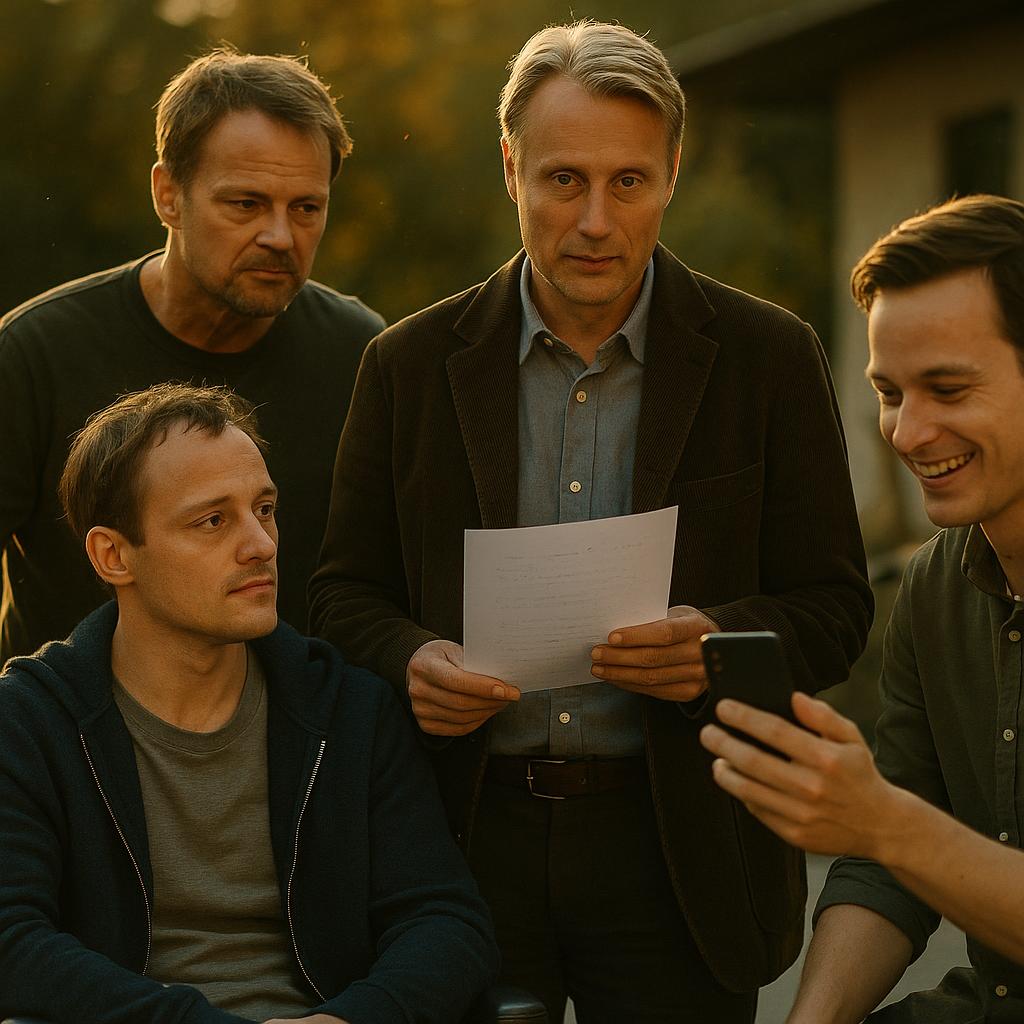 Image by RM AI
Image by RM AI
The First Victory
The morning I finally dressed myself completely without help felt like climbing Mount Everest. Two months after Megan walked out, I sat on the edge of my bed staring at the clothes James had laid out the night before. "Today's the day," I whispered to myself, a personal challenge no one else would understand. It took nearly an hour—wrestling with socks that seemed determined to twist away from my fingers, pants that required a humiliating series of maneuvers, and buttons that might as well have been microscopic. By the end, I was drenched in sweat, my arms trembling from exertion. But I did it. When I wheeled myself out of the bedroom, my mother was at the kitchen table scrolling through her phone. She looked up casually, then froze. Her eyes immediately welled with tears as she realized what I'd accomplished. "Oh, Daniel," she whispered, hand covering her mouth. James, ever the documentarian, grabbed his phone. "This is going in the victory album," he announced, snapping a photo while I tried not to look as exhausted as I felt. It was such a small thing—something I'd never thought twice about before the accident—but in that moment, I felt like I'd reclaimed a tiny piece of my independence. What none of us realized then was that this small victory would be the first domino in a series of changes that would eventually lead me back to myself.
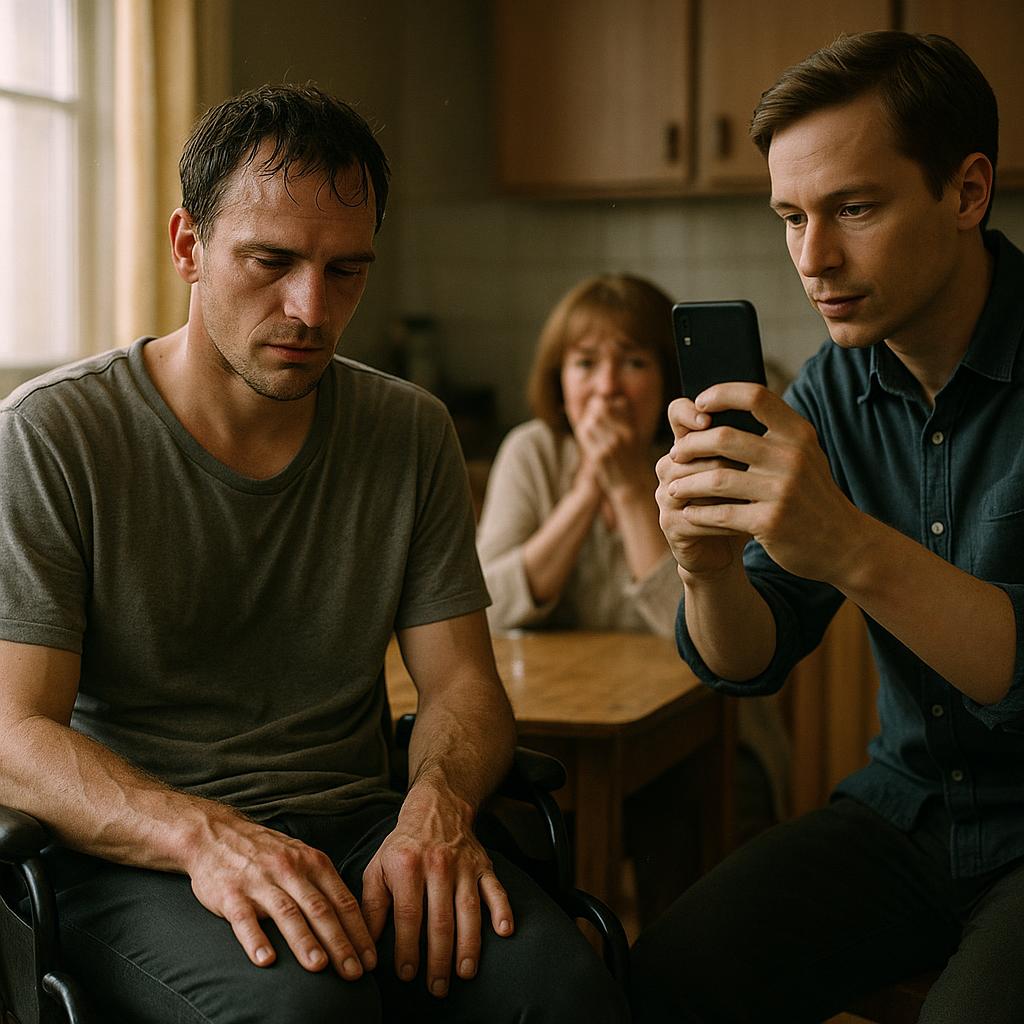 Image by RM AI
Image by RM AI
The New Home
Moving day felt like a rebirth. The moment I wheeled through the door of our new ground-floor apartment, I could feel the difference. Everything—literally everything—had been designed with someone like me in mind. Wide doorways that didn't require a geometry degree to navigate. Countertops at the perfect height for my chair. A shower I could roll straight into without the humiliating transfer dance I'd grown to dread. 'What do you think?' James asked, watching my face as I explored each room independently. I couldn't find words at first. After months of feeling trapped in my own home, the freedom was overwhelming. That night, I insisted on cooking dinner—just pasta with jarred sauce, nothing fancy. But I did it all myself, reaching for ingredients without stretching painfully, using the lowered stove without fear of burning myself. When I served plates to James and Mom, the pride on their faces mirrored what I felt inside. 'To new beginnings,' Mom said, raising her glass. As we ate, I realized something profound: independence wasn't just about physical ability—it was about having the right environment and the right people. And for the first time since the accident, I started to believe that maybe, just maybe, I could build a life worth living again. What I didn't know then was that this apartment would soon welcome someone who would change everything.
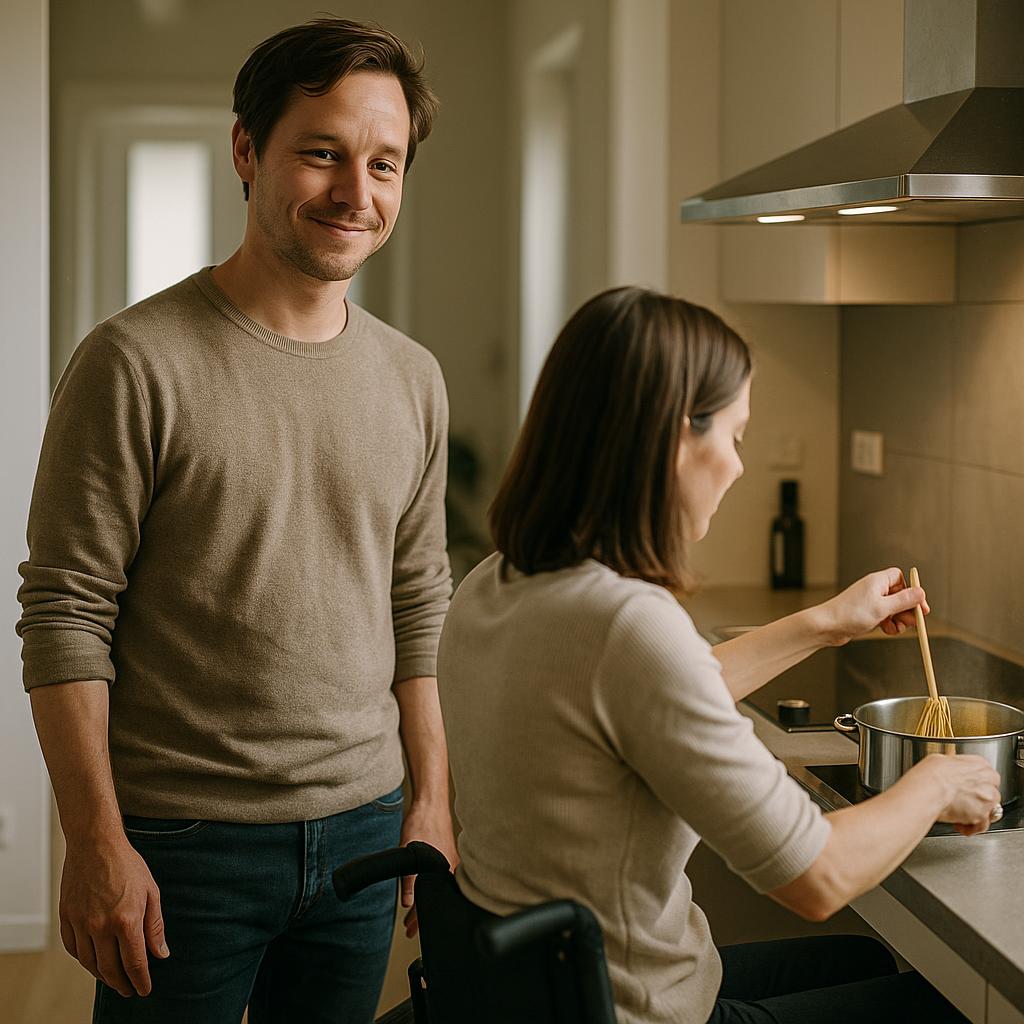 Image by RM AI
Image by RM AI
The Divorce Hearing
The courthouse felt like a mausoleum the day of our divorce hearing—cold, formal, and filled with the ghosts of dead relationships. Six months after Megan walked out of my life, I wheeled myself into that courtroom, my brother James silently supportive beside me. When she walked in, it was like seeing a stranger wearing my wife's face. Her hair was shorter, highlighted in a way she'd never tried during our marriage. Designer clothes I'd never seen before. A confidence that felt like a slap—she was thriving without me. Then I spotted Mark hovering in the back row, and my stomach dropped like I was careening off that road all over again. The way they exchanged glances told me everything I needed to know about how long this had been building before my accident. When the judge finally called our names, Megan couldn't quite meet my eyes. 'Do you contest this divorce, Mr. Jacobson?' the judge asked, peering at me over reading glasses. I'd rehearsed a dozen bitter speeches in my head for this moment, imagined the satisfaction of making her squirm. Instead, I heard myself say with unexpected steadiness, 'No, Your Honor. I'm ready to move forward too.' The relief that washed over me in that moment wasn't about letting Megan go—it was about finally releasing myself from the weight of trying to be the man she wanted me to be.
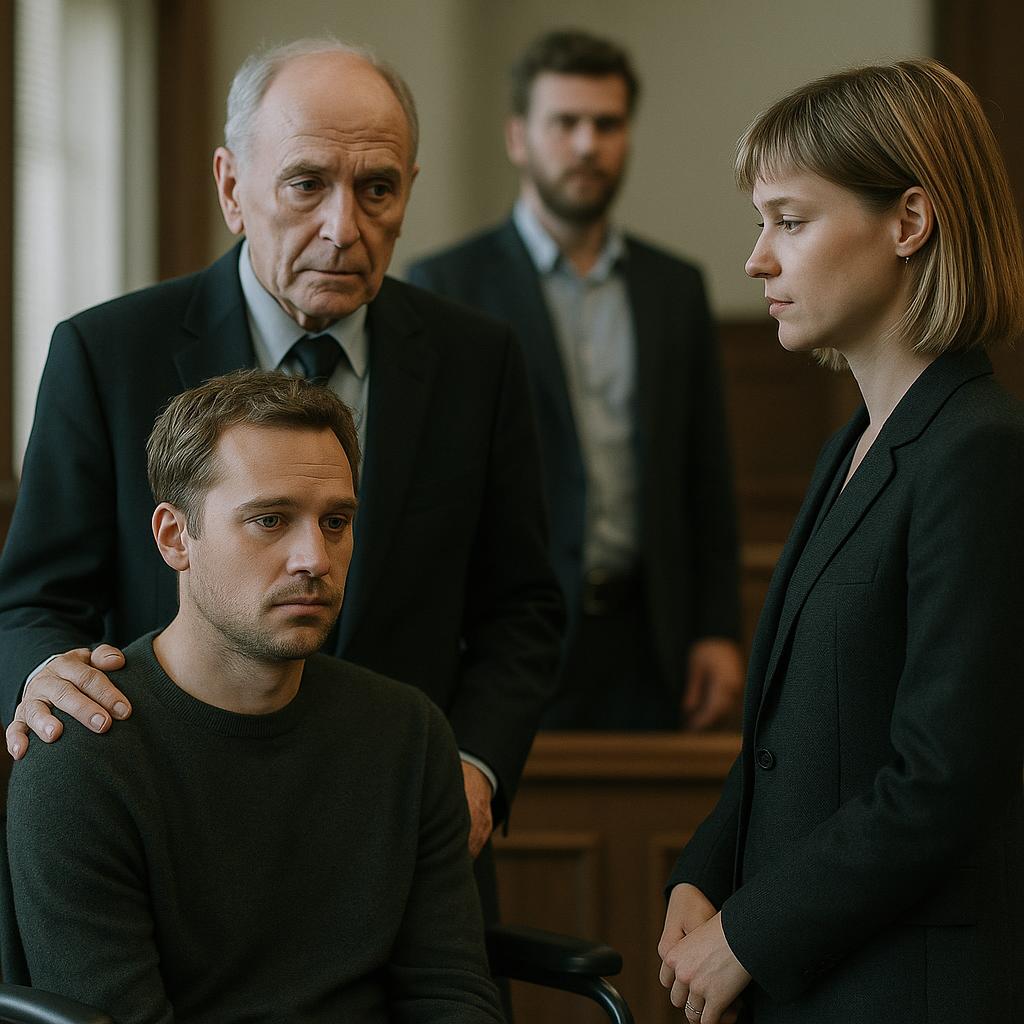 Image by RM AI
Image by RM AI
The Unexpected Encounter
The courthouse hallway felt like a liminal space—not quite my past, not yet my future. I was adjusting my gloves when I heard her voice behind me. 'You look good,' Megan said, shifting her weight awkwardly from one designer heel to another. The woman who'd promised to stand by me through sickness and health couldn't even meet my eyes properly. 'I'm glad you're doing well.' The irony wasn't lost on me—she was 'glad' I was managing to survive the abandonment she'd inflicted. For months, I'd rehearsed what I'd say if I ever got this moment: the accusations, the hurt, the betrayal. But sitting there in my wheelchair, looking up at the stranger who used to be my wife, I felt something unexpected—emptiness where rage should be. 'I'm getting there,' I replied simply, my voice steadier than I felt. Before she could respond, I turned my chair and wheeled away, not wanting to give her the satisfaction of seeing the tears that betrayed me. As I rounded the corner, I caught a glimpse of her reflection in the glass doors—her hand half-raised as if to call me back, her face a complicated mix of guilt and relief. What I didn't know then was that this wouldn't be our last encounter, and the next one would change everything I thought I knew about moving on.
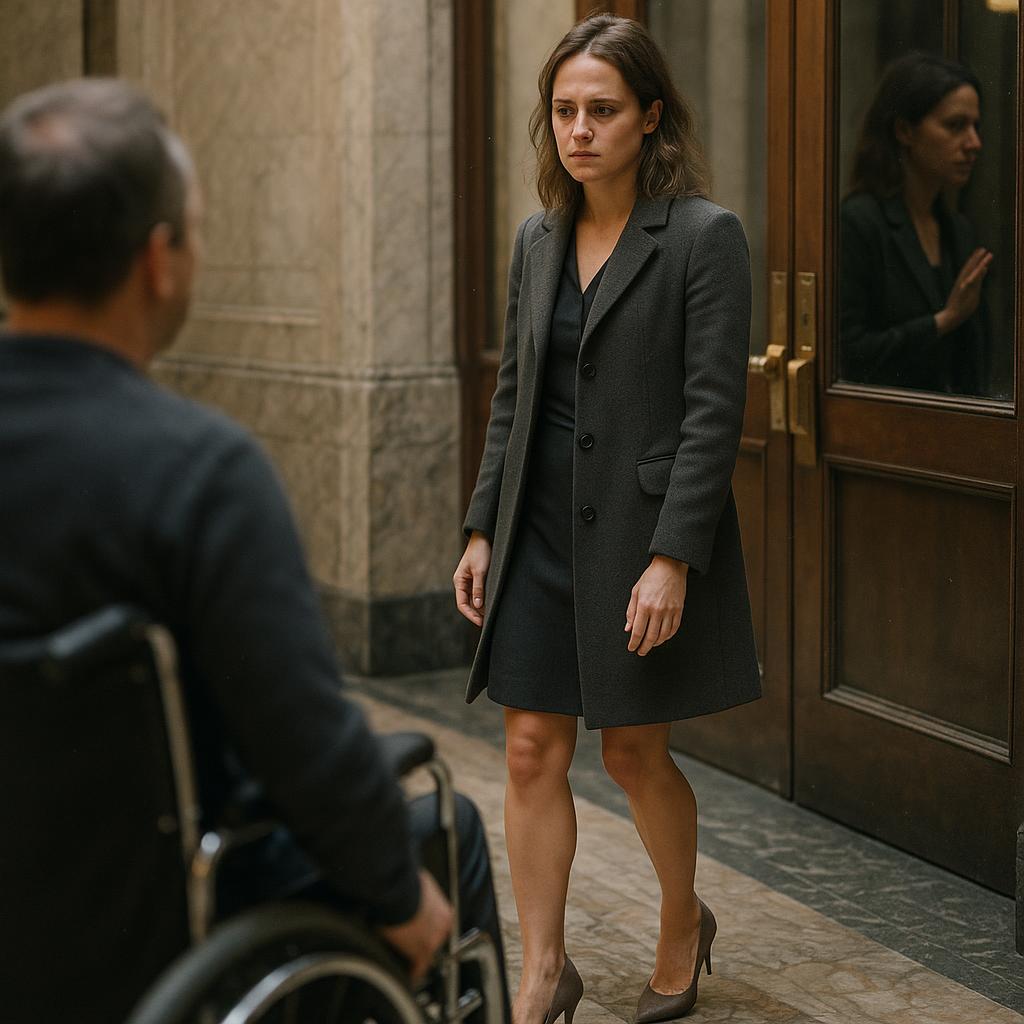 Image by RM AI
Image by RM AI
The Job Search
With the divorce papers signed and my marriage officially over, I faced a new mountain to climb: finding a job. My construction management career—twelve years of expertise and promotions—suddenly felt like it belonged to someone else, someone who could climb scaffolding and walk job sites. I updated my resume, highlighting my project management skills and downplaying the physical aspects of my previous role. The first few rejections stung but didn't surprise me. 'We'll keep your resume on file,' they'd say, their eyes never quite meeting mine as they glanced at my wheelchair. But after the tenth interview ended with the same rehearsed speech, my confidence began to crumble. Then came the interview that broke me. 'Look,' the hiring manager said, leaning forward with practiced sympathy, 'I'll be straight with you. The company is concerned about reliability issues and healthcare costs.' He might as well have said, 'You're damaged goods.' I wheeled myself out of that sterile office building, sat in my adapted van, and screamed until my throat burned. All those years of education, experience, and dedication reduced to a liability assessment. What no one tells you about disability is that sometimes the most crippling part isn't your body—it's how the world suddenly sees you as nothing but your limitations.
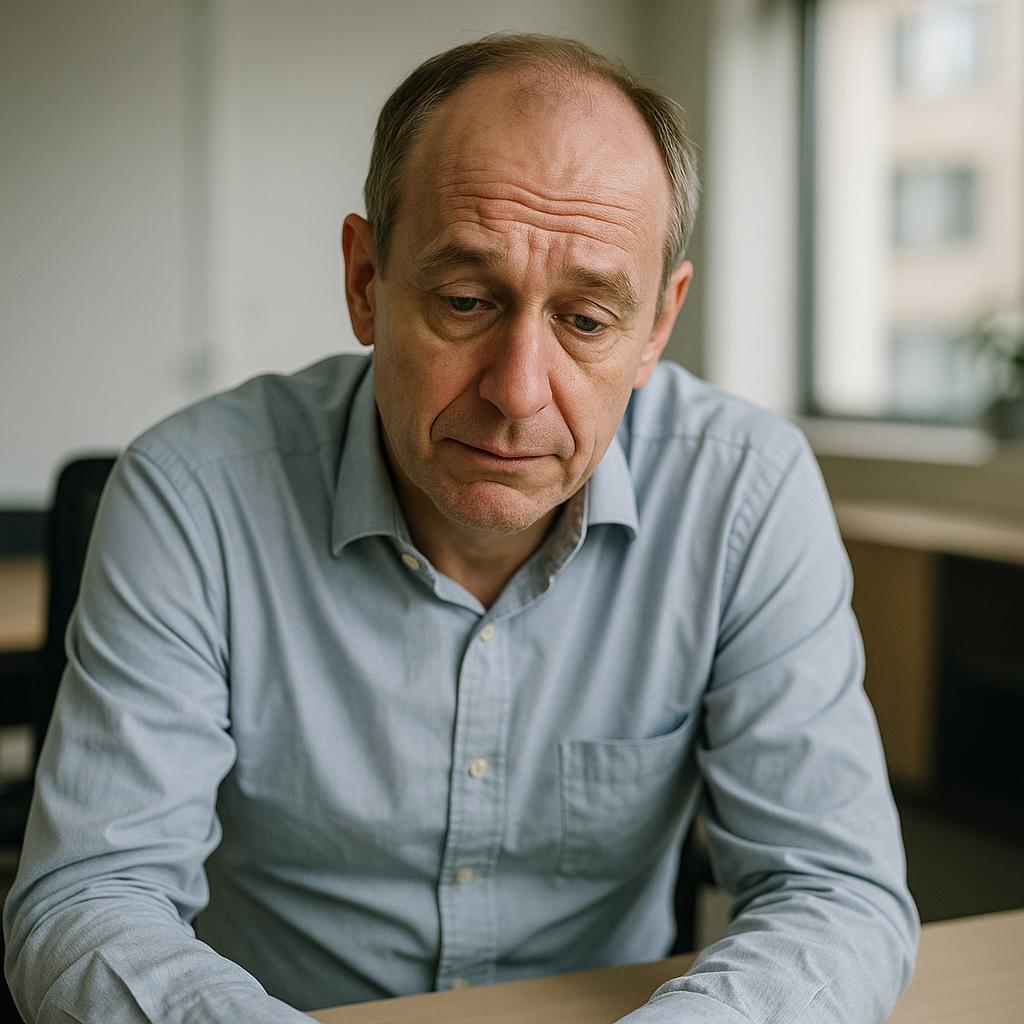 Image by RM AI
Image by RM AI
The Opportunity
After weeks of rejection, my break came from the most unexpected source. Pavel, my physical therapist with his no-nonsense attitude, caught me scrolling through job listings after our session. 'Daniel, stop looking at these corporate jobs that don't deserve you,' he said bluntly. 'The rehabilitation center needs someone to manage their renovation project. You know construction, and you understand what patients need.' I almost laughed at the simplicity of it—how had I not thought of this? The interview was with Dr. Novak, who remembered me not as a patient but as a professional. 'Your experience is exactly what we need,' he said, reviewing my portfolio on his tablet. 'Someone who understands both sides—the construction logistics and the accessibility requirements.' For the first time in months, someone was looking at me with respect rather than pity. They weren't hiring me as a charity case or to fill some diversity quota. They wanted me because my disability had given me insights no able-bodied project manager could offer. When Dr. Novak extended his hand and said, 'When can you start?' I felt something I hadn't experienced since before the accident—purpose. What I didn't realize then was that this job would introduce me to someone who would change everything about my new life.
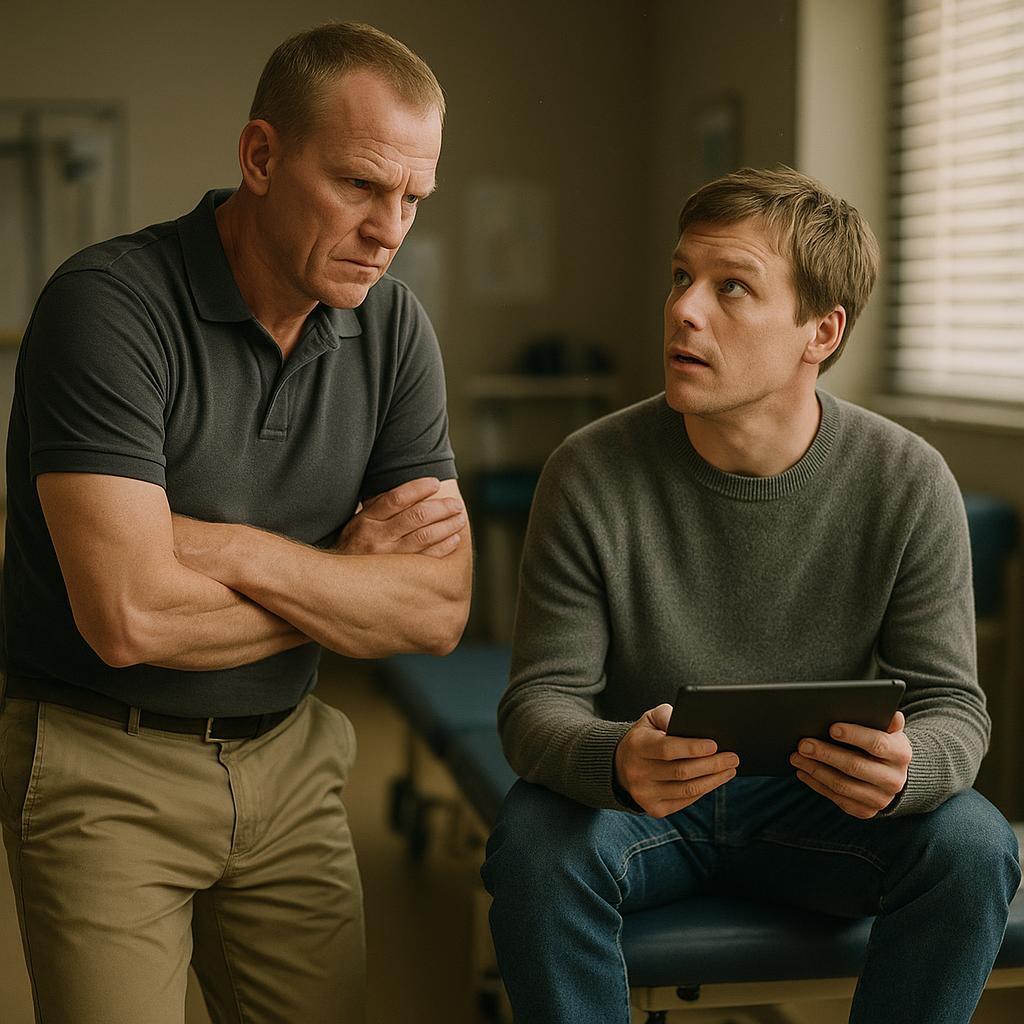 Image by RM AI
Image by RM AI
The First Day
Walking into the rehabilitation center as an employee rather than a patient felt surreal. My palms were sweating as I wheeled through the automatic doors, my employee badge hanging from my neck instead of a patient wristband. 'Welcome to the team, Daniel,' Dr. Novak said, clapping my shoulder as he introduced me to staff who had once monitored my vital signs and helped me shower. Talk about a role reversal. During my lunch break, I was reviewing blueprints in the common area when a young woman in a wheelchair approached me. 'You're that guy, right? The one who used to be a patient?' she asked, her eyes scanning my chair. 'I am,' I admitted. 'Does it get easier?' she whispered, her voice cracking slightly. I could have given her some inspirational BS about how time heals all wounds, but instead, I told her the truth. 'Not easier,' I said, 'just... different. You build a new normal.' We talked for twenty minutes—about phantom pains, about nightmares, about the humiliations no one warns you about. By the end, I realized something profound: my broken body and shattered marriage had given me something I never expected—the ability to be a bridge between the medical staff and the patients who felt like no one truly understood their struggle. What I didn't know then was that this conversation would spark an idea that would change not just my life, but the lives of countless others who felt invisible in their wheelchairs.
 Image by RM AI
Image by RM AI
The Introduction
The staff meeting was supposed to be routine—just another day of reviewing blueprints and timelines. Then she spoke up. 'That won't work for real patients,' a voice cut through the room, challenging my proposed layout for the therapy spaces. I looked up to see a woman with curly hair and determined eyes staring directly at me. Isabelle Martinez, the center's newest occupational therapist. Unlike everyone else who tiptoed around the guy in the wheelchair, she didn't hesitate to disagree with me. 'The turning radius is too tight, and those cabinets are practically useless for someone seated.' What started as a professional disagreement spilled into lunch hour, where we sat across from each other in the cafeteria, napkins covered in our competing sketches. 'You of all people should understand this,' she said, not with pity but with expectation. For the first time since Megan walked out, I found myself fully engaged with someone who saw me as a professional first, wheelchair second. Our debate about counter heights and doorway widths somehow transformed into stories about our worst patients and favorite restaurants. When she laughed at my terrible joke about automatic doors, I felt something I thought had died in that hospital bed months ago—a flutter of genuine connection. What terrified me wasn't that I enjoyed her company, but that I wanted more of it.
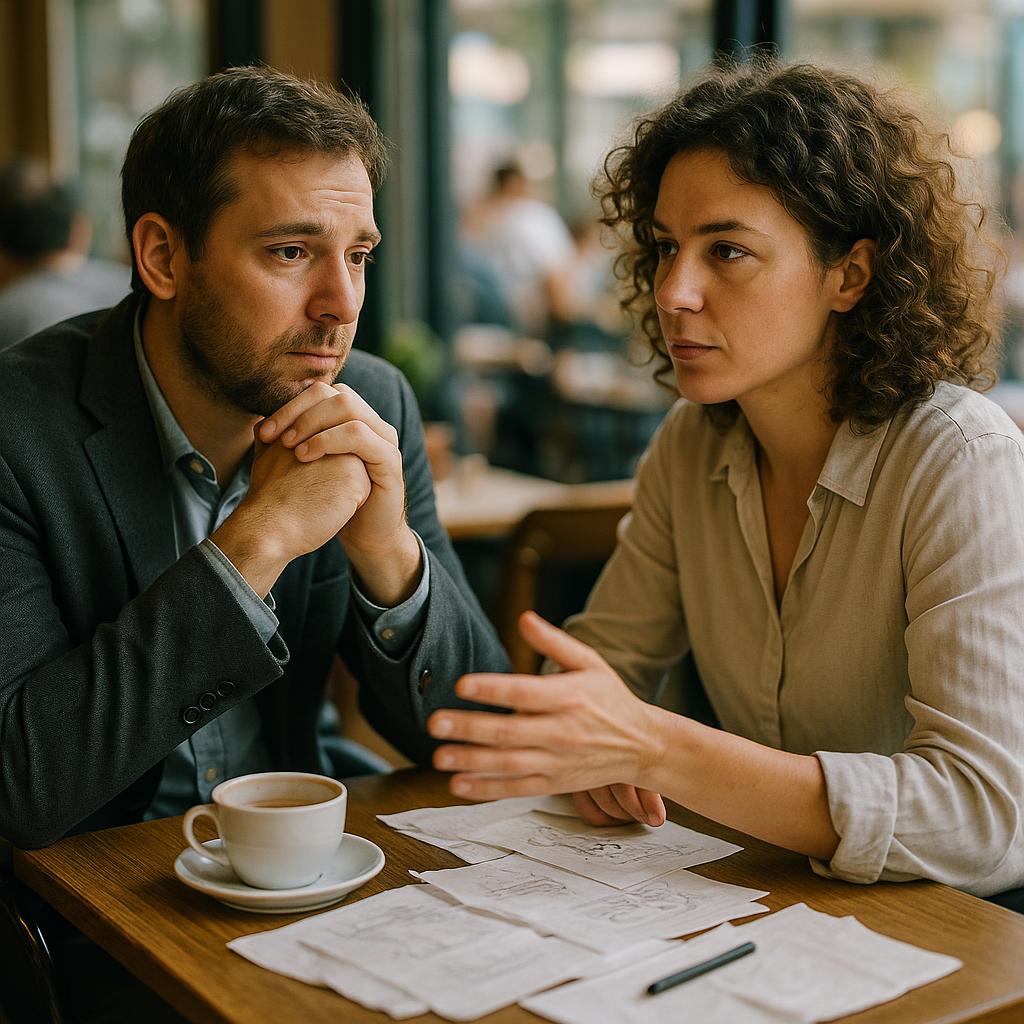 Image by RM AI
Image by RM AI
The Suggestion
Three weeks into our working relationship, Isabelle and I had fallen into a comfortable rhythm of professional disagreements and unexpected laughter. We were reviewing accessibility plans in the break room when she suddenly changed the subject. 'You should try wheelchair basketball,' she suggested, stirring her coffee casually. I snorted, nearly choking on my sandwich. 'I was terrible at basketball when I had working legs,' I admitted. 'What makes you think I'd be any good now?' Isabelle fixed me with that direct gaze that always made me feel simultaneously seen and challenged. 'That's exactly the point, Daniel,' she said, leaning forward. 'It's not about reclaiming your old life—it's about discovering a new one.' Something in her words hit differently than all the well-meaning advice I'd received since the accident. She wasn't asking me to overcome my disability or pretend it didn't exist. She was suggesting I embrace it as part of a new identity. 'The center has a program on Thursday evenings,' she continued, sliding a brochure across the table. 'Just think about it.' I nodded noncommittally, but found myself unable to throw away the brochure when I got home that night. Instead, I propped it against my lamp, where it seemed to watch me as I drifted off to sleep, wondering what version of myself might emerge if I actually gave it a try.
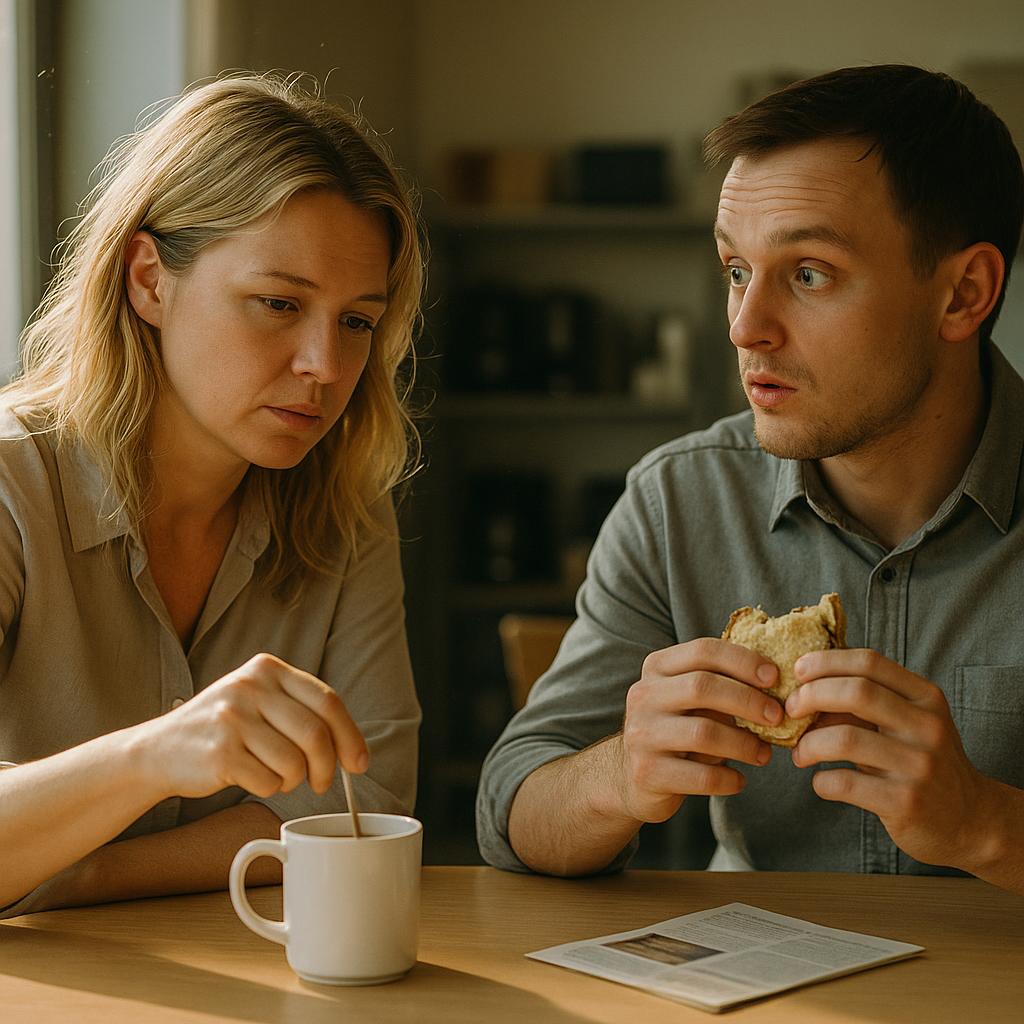 Image by RM AI
Image by RM AI
The First Practice
Thursday evening arrived, and I found myself in the community center gym, my palms sweaty against my wheels. I'd only agreed to this wheelchair basketball thing to get Isabelle off my back, but now that I was here, surrounded by people who made their chairs look like extensions of themselves, I felt like an impostor. Coach Marcus, a former Paralympic athlete who'd lost his legs in Afghanistan, didn't waste time on pleasantries. 'You're new, so you'll be terrible,' he announced, wheeling circles around me with effortless precision. 'That's expected.' For the next two hours, he drilled us mercilessly—chair control, passing techniques, shooting form. I failed spectacularly at almost everything. My chair kept facing the wrong direction, balls bounced off my fingertips, and my shots didn't even graze the backboard. By the end, my arms burned like they were being seared from the inside out, sweat had soaked through my shirt, and my pride lay somewhere on the polished hardwood. But here's the weird thing—I couldn't stop grinning. For the first time since the accident, I wasn't a patient or a victim or an inspiration. I was just an athlete having a really bad day. 'You coming back next week?' Marcus asked as I was leaving, his eyebrow raised in challenge. What surprised me wasn't my answer, but how much I meant it.
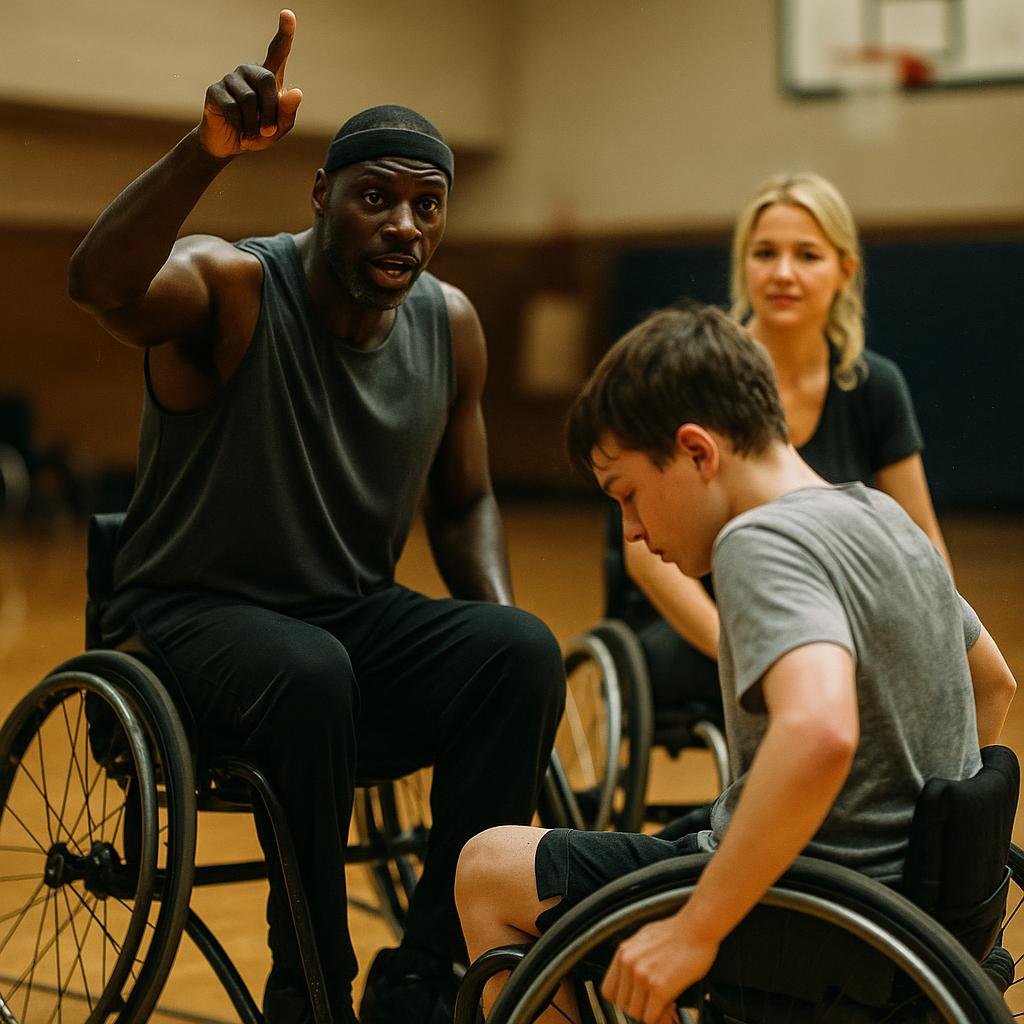 Image by RM AI
Image by RM AI
The Team
The wheelchair basketball team became my unexpected salvation. After a few weeks of practice, I wasn't just the new guy anymore—I was part of something. We were a mismatched crew of broken bodies and unbreakable spirits. Raj, who battled MS with dark humor that made even Coach Marcus crack a smile. Tomas, another ex-construction worker who'd fallen from scaffolding, who understood exactly what I'd lost and found. And then there was Zoe, born with spina bifida, who moved in her chair like it was a Ferrari while the rest of us were still driving minivans. 'Daniel, you're thinking too much!' she'd shout, spinning circles around me during drills. 'Your brain's the problem, not your legs!' What made this team different from every support group and therapy session I'd endured was the beautiful absence of pity. They trash-talked me mercilessly, celebrated when I finally made a basket, and expected me to work just as hard as everyone else. After practice, we'd often grab beers at the accessible pub down the street, swapping stories about inaccessible bathrooms and clueless strangers who spoke to us like children. For the first time since my accident, I felt normal—not despite my wheelchair, but because of it. What I didn't realize then was that someone had been watching our practices from the sidelines, someone whose presence would soon complicate everything.
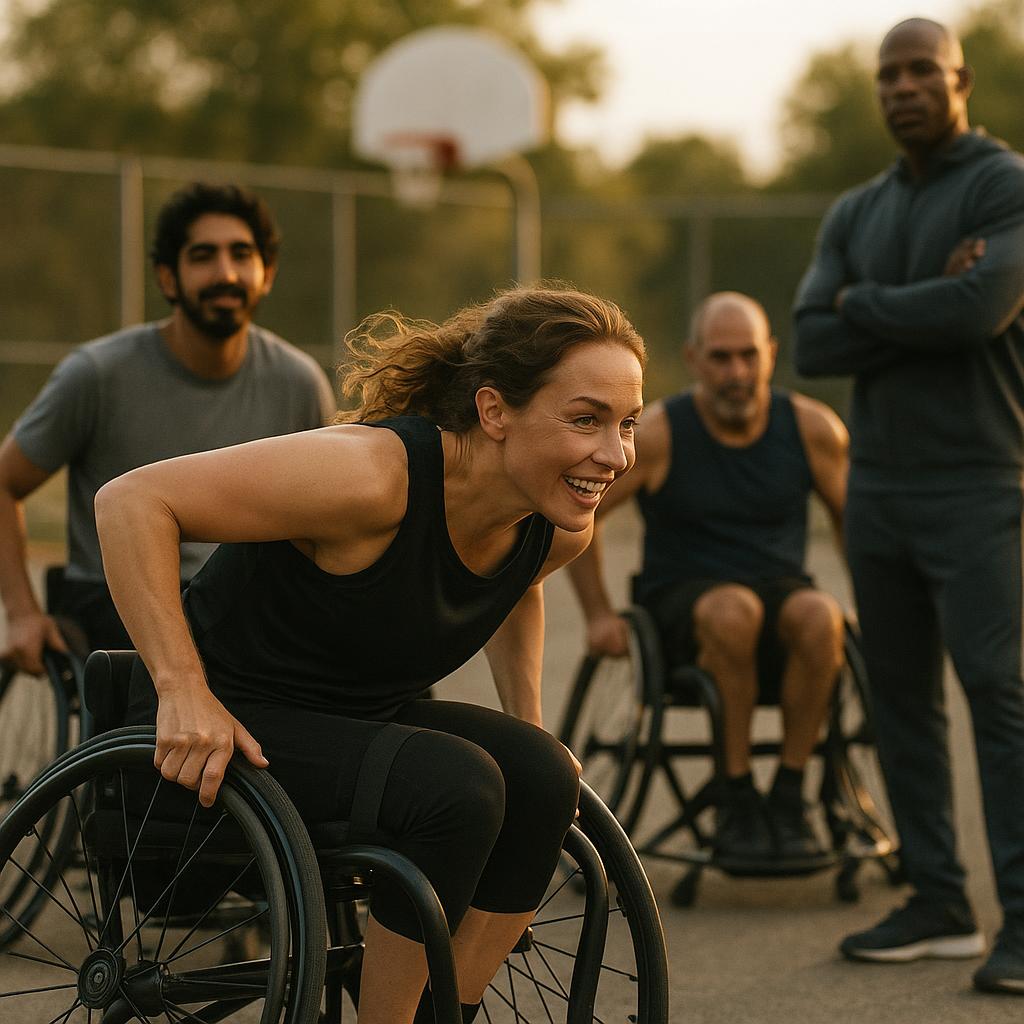 Image by RM AI
Image by RM AI
The Progress
Basketball became my salvation in ways physical therapy never could. Every evening after work, I'd wheel onto the empty court behind the rehab center, practicing shots until my arms trembled and sweat soaked through my shirt. I watched professional wheelchair basketball games obsessively, studying their techniques like sacred texts. 'You're going to wear out those wheels,' James joked one night, finding me in the driveway at 10 PM, still practicing chair pivots. I'd even modified my everyday chair with slightly angled wheels for better court performance—a small adjustment that made a world of difference. Pavel noticed the change before anyone else. 'Your trapezius development is impressive,' he said during our session, his clinical assessment unable to hide his approval. 'Two months of basketball has done more for your upper body than six months of traditional therapy.' What he didn't say, but what I could see in his eyes, was that something else had changed too. The determination in my movements, the focus in my eyes—I wasn't just rebuilding my body anymore. I was rebuilding my identity. What I didn't realize was that someone else had noticed my transformation too, someone whose opinion suddenly mattered more than I was ready to admit.
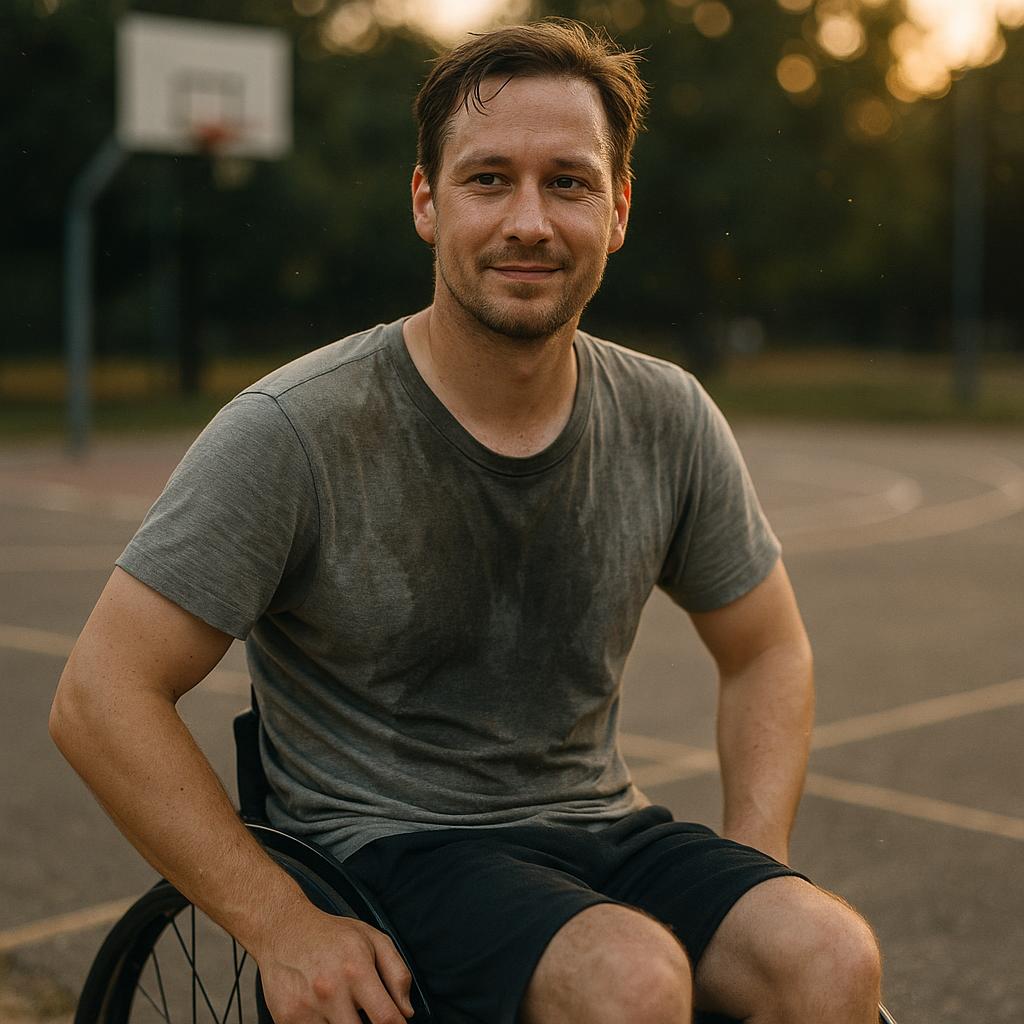 Image by RM AI
Image by RM AI
The Friendship
I never expected Isabelle to show up at my first real game, but there she was in the stands, cheering louder than anyone else when I finally managed to sink a basket. After that, she never missed a game. She'd sit with her curly hair pulled back, clipboard in hand, taking actual notes on my performance like some kind of professional scout. 'Your defensive positioning is still garbage,' she'd tell me over burgers afterward, not a hint of pity in her voice. 'But that pivot move in the third quarter? That was something.' We fell into this rhythm—games, then dinner, then hours of conversation where my wheelchair became the least interesting thing about me. We talked about her med school nightmares, my construction disasters, and debated whether pineapple belongs on pizza (it absolutely does not). One Thursday night, after I somehow scored the winning basket in a nail-biter against the city's top team, she rushed onto the court and threw her arms around me. The hug lasted maybe three seconds, but in that moment, everything shifted. Her perfume, the warmth of her laugh against my neck, the way her hands gripped my shoulders—it awakened something I thought had died along with my marriage. That night, as I lay in bed replaying that hug, I realized I was terrified. Not because I was falling for Isabelle, but because for the first time since Megan walked out, I actually cared about getting hurt again.
The Doubt
I found myself caught in a frustrating loop of self-sabotage. Every time Isabelle's smile lingered a little too long or our hands accidentally brushed while reviewing blueprints, my heart would race—and then Megan's voice would echo in my head: "I didn't sign up to be a caretaker." The math seemed simple: if my wife of twelve years couldn't handle my disability, why would someone new choose it willingly? So when Isabelle casually mentioned that Dr. Chen from neurology had asked her to dinner, I heard myself saying, "You should definitely go," while something inside me crumbled. "Really?" she asked, her expression unreadable. "You think so?" I forced a smile that felt like broken glass. "Absolutely. He seems like a great guy." Later that night, I sat alone in my apartment, staring at the basketball schedule magneted to my fridge, the disappointment in my stomach hardening into something familiar—resignation. My brother called, and I found myself lying about having plans that weekend. The truth was too pathetic: I was hiding from possibilities because I'd convinced myself I already knew the ending. What I didn't realize was that someone had noticed this pattern long before I had, and they weren't going to let me get away with it much longer.
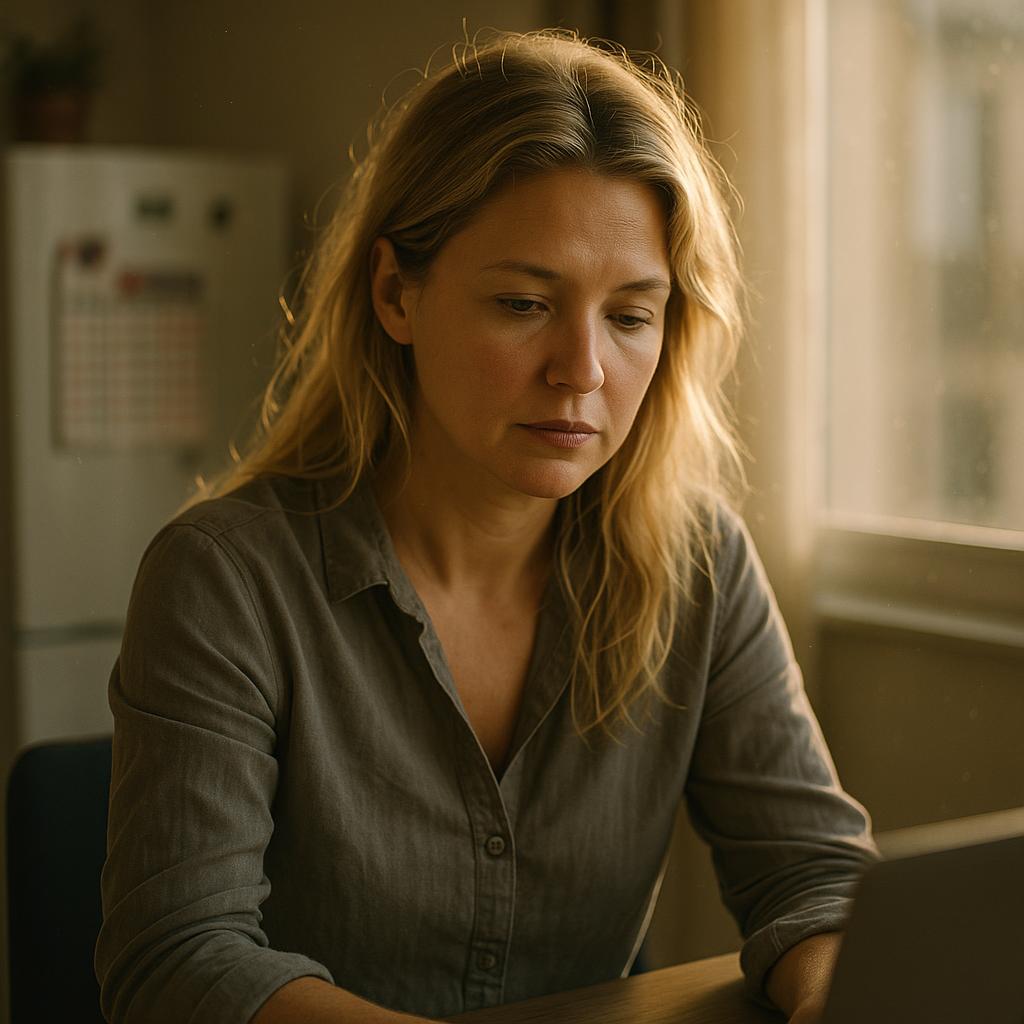 Image by RM AI
Image by RM AI
The Confrontation with James
James showed up at my apartment the day after Isabelle's date with Dr. Chen, pizza box in one hand and a six-pack in the other. I thought we were just having our usual Friday night hangout until he muted the basketball game halfway through. 'So, you want to tell me why you're pushing away the first woman who's made you smile since the accident?' he asked, his tone casual but his eyes dead serious. I deflected, mumbling something about her deserving better. 'Better than what? A guy who's rebuilding his entire life from scratch?' James shot back. We argued for nearly an hour. I told him he couldn't possibly understand what dating was like from a wheelchair, how every interaction was shadowed by the question of whether I was a partner or a burden. 'You're right, I don't know what that's like,' he finally said, his voice softening. 'But I do know what it's like to watch my brother give up on happiness because one person couldn't see his worth.' He leaned forward, looking me straight in the eyes. 'Megan was wrong about you, Dan. Don't make her wrong about you twice by believing her.' His words hit me like a physical blow, forcing me to confront the uncomfortable truth: I wasn't protecting myself from rejection—I was ensuring it. What I didn't realize was that while I was having this epiphany, Isabelle was making a decision of her own.
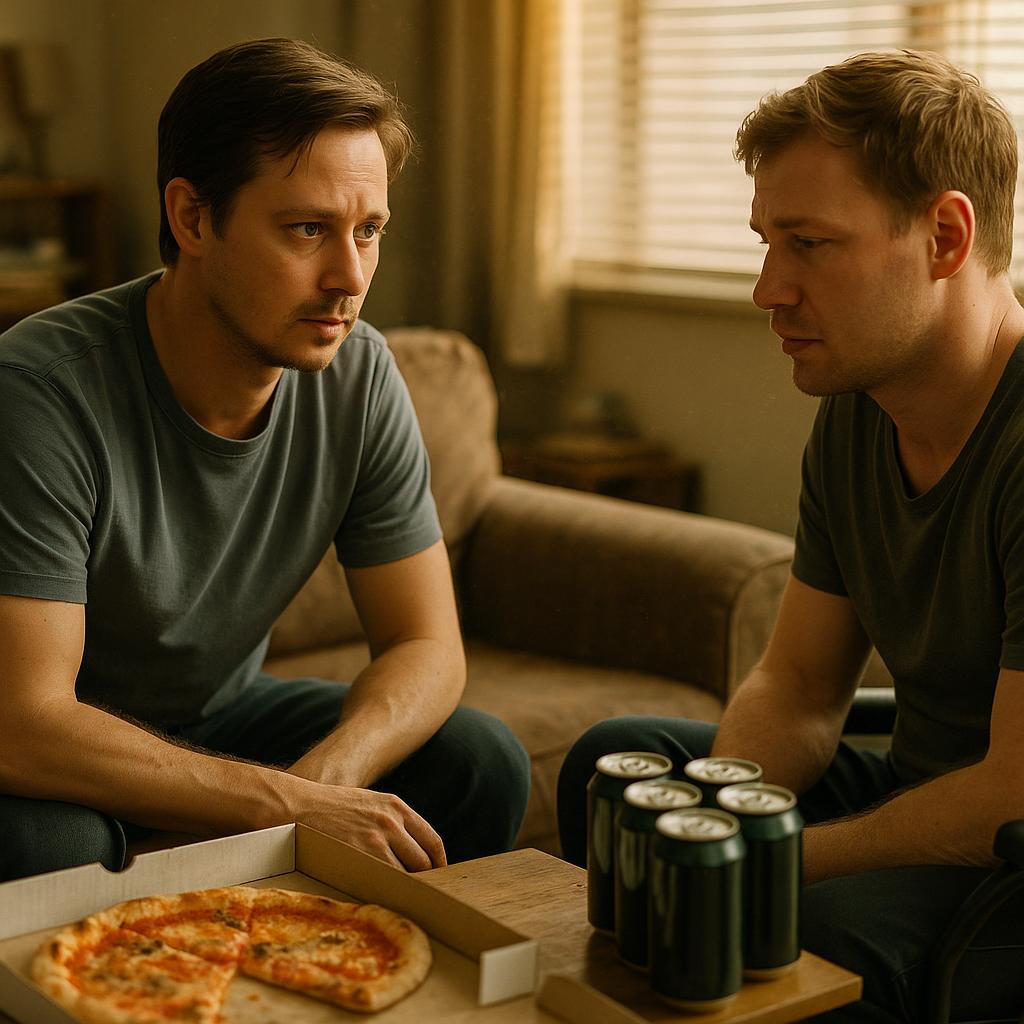 Image by RM AI
Image by RM AI
The Tournament
The tournament became my obsession. Every evening after work, our team drilled plays until our arms felt like overcooked spaghetti. Coach Marcus pushed us harder than ever, barking commands that echoed through the gym. 'This isn't just about participation trophies, people!' he'd shout. 'We're going to show them what we're made of!' The night before our first game, I was a bundle of nerves, pacing my apartment in my wheelchair until I wore a path in the carpet. Then my doorbell rang. Isabelle stood there with takeout bags from my favorite Thai place, her curly hair pulled back in a messy bun. 'Pre-game fuel,' she announced, pushing past me into the kitchen. As we ate, she casually mentioned her date with Dr. Chen. 'Complete disaster,' she said, rolling her eyes. 'He spent the entire night talking about his research. Never once asked what I wanted.' She looked directly at me then, her fork paused midair. 'Some people just don't know how to see what's right in front of them.' The way her eyes held mine made my heart stutter. Was she trying to tell me something? Before I could gather the courage to ask, my phone buzzed with a team message from Coach: 'Early breakfast tomorrow. 7 AM sharp. Champions don't sleep in.' What I didn't know then was that the tournament would test more than just my athletic abilities.
 Image by RM AI
Image by RM AI
The Victory
The buzzer sounded, and our team erupted in cheers. We'd actually done it—beaten the Raptors, a team with three former Paralympic athletes. My strategy of using Zoe's speed and Raj's precision shooting had worked perfectly. As we gathered in a circle, sweaty and breathless, Coach Marcus actually smiled. 'Not bad for a bunch of rookies,' he said, which from him was practically a standing ovation. The celebration spilled into the hallway, with high-fives and wheelchair bumps all around. That's when Isabelle appeared, her face flushed with excitement. Before I could process what was happening, she leaned down and kissed me—quick but unmistakable. When she pulled back, her eyes searched mine, asking a question I wasn't prepared to answer. I froze, my heart hammering against my ribs. The moment stretched between us like a tightrope, and then we both laughed awkwardly, pretending it was just part of the celebration. But as the team headed to the locker room, I couldn't stop touching my lips, wondering if I'd just made the biggest mistake of my post-accident life by not kissing her back.
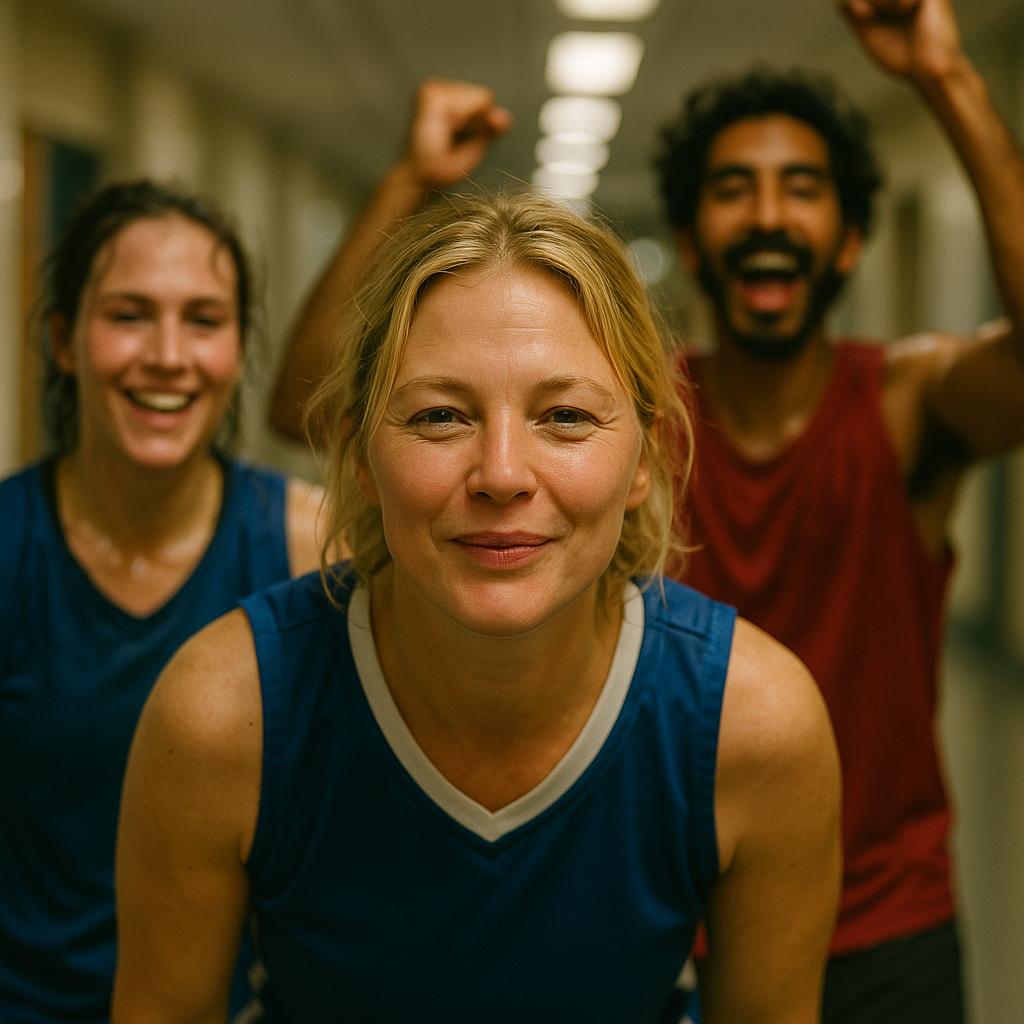 Image by RM AI
Image by RM AI
The Conversation
I avoided Isabelle for three days after that kiss, making excuses about doctor's appointments and team practices that didn't exist. But avoidance is hard when you work in the same building, and eventually, I ran out of hallways to wheel down quickly when I saw her coming. We agreed to meet at the coffee shop across from the center—neutral territory. I arrived early, positioning my chair at a table that wouldn't require me to navigate through the maze of furniture. When she walked in, her curly hair loose around her shoulders, my heart did that stupid flutter thing again. She didn't waste time on small talk. 'I like you, Daniel,' she said, stirring her latte with deliberate focus. 'And I think you like me too. But you're still carrying your ex-wife's rejection like it's proof of your unworthiness.' Her words hit me like a physical blow. I opened my mouth to argue, then closed it again. She was right. 'I'm not asking for promises,' she continued, finally looking up at me. 'I'm just asking if you're willing to try.' Her hand rested on the table between us, not reaching for mine, but waiting. In that moment, I realized I was facing a choice more terrifying than any basketball tournament: I could keep protecting myself from pain, or I could risk everything for a chance at something real.
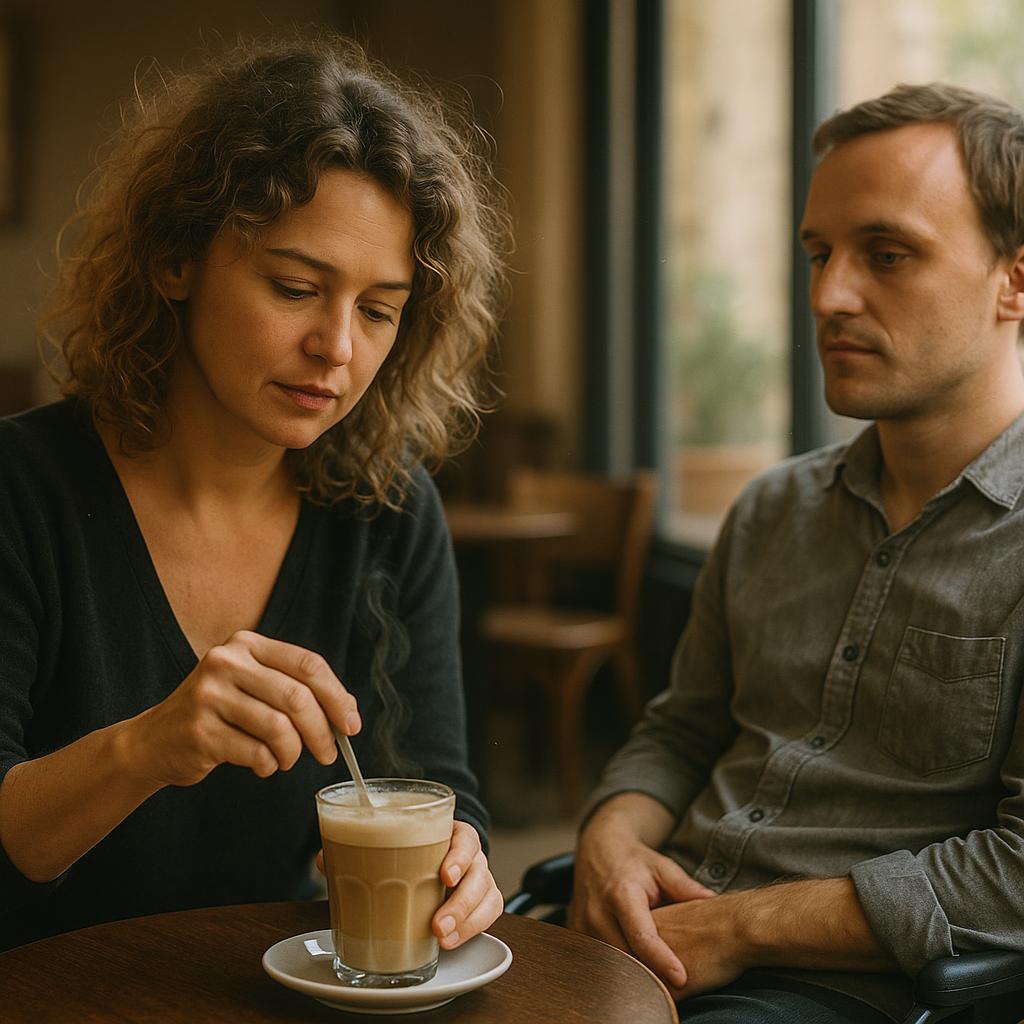 Image by RM AI
Image by RM AI
The First Date
I spent three hours picking out my shirt for our first date. THREE HOURS. As if the right combination of cotton and buttons could somehow make people see me instead of my wheelchair. Isabelle had chosen an Italian place downtown that she'd researched extensively for accessibility. When I arrived, she was already waiting, wearing a blue dress that matched her eyes. 'I called ahead to make sure they had a ramp,' she said casually, as if checking accessibility was as normal as checking the menu. The evening wasn't without its awkward moments. The hostess led us to a table wedged between two others, making it impossible for me to maneuver. Without missing a beat, Isabelle simply said, 'We'll need a different table,' her tone leaving no room for argument. Then there was the waiter who kept addressing all his questions to her. 'And what would he like to drink?' he asked, as if my paralysis had somehow affected my ability to speak. Isabelle just pointed at me with a smile and said, 'He's right here and perfectly capable of ordering his own wine.' By dessert, we were laughing about it all—the bathroom door I barely squeezed through, the curious stares from the couple at the next table, the way Isabelle had nearly knocked over a busboy defending my honor. As she reached across the table and took my hand, I realized something terrifying: for the first time since my accident, I wasn't thinking about my wheelchair at all.
 Image by RM AI
Image by RM AI
The Championship
The championship game was everything we'd trained for and more. The arena buzzed with energy as we faced the Titans, a team stacked with former Paralympic athletes whose chairs seemed to float across the court. Every possession was a battle—elbows flying, wheels colliding, sweat dripping onto the polished hardwood. We traded leads like punches, neither team giving an inch. With eight seconds left and down by one, Coach Marcus called our final timeout. 'Daniel,' he said, his eyes locking with mine, 'this is your shot.' The play unfolded exactly as we'd practiced—Zoe's screen, Raj's perfect pass finding my hands. Time slowed as I positioned, pushed up, and released. The ball arced beautifully, kissed the backboard... and rimmed out as the buzzer screamed. The gym fell silent for me, though I could see mouths moving, hands clapping. My teammates surrounded me with pats and words I couldn't process. It wasn't just a missed shot—it was my chance to prove that my new life could contain moments of greatness, that a wheelchair couldn't contain my potential. Isabelle found me later in the empty locker room, still in my jersey, staring at nothing. 'You know what I saw out there today?' she asked, kneeling to meet my eyes. Her next words would change everything I thought I knew about failure.
 Image by RM AI
Image by RM AI
The Aftermath
I stayed in that empty gym for hours after everyone left, methodically shooting baskets from my chair until my arms burned and my palms were raw. Each missed shot felt like confirmation of what I'd always feared—that my new life would be defined by limitations, not possibilities. The squeak of the gym door barely registered until Isabelle was right beside me, her hand gently stopping my wheel. 'You know what I saw today?' she asked, her voice soft but firm. I couldn't look at her, couldn't bear to see pity in those blue eyes. 'I saw a man who fought until the last second, who earned the respect of everyone in that arena.' I scoffed, sending another ball toward the hoop. It bounced off the rim—another failure. 'The only person who thinks you failed is you, Daniel,' she continued, kneeling to meet my gaze. 'Everyone else saw what I saw—someone who refused to be defined by circumstances.' She picked up a basketball, turning it in her hands. 'Your ex-wife couldn't handle who you became after the accident. But have you considered that maybe, just maybe, who you've become is actually stronger than who you were before?' Her words hung in the air between us, and for the first time since that ball rimmed out, I allowed myself to really look at her—and what I saw in her eyes wasn't pity at all.
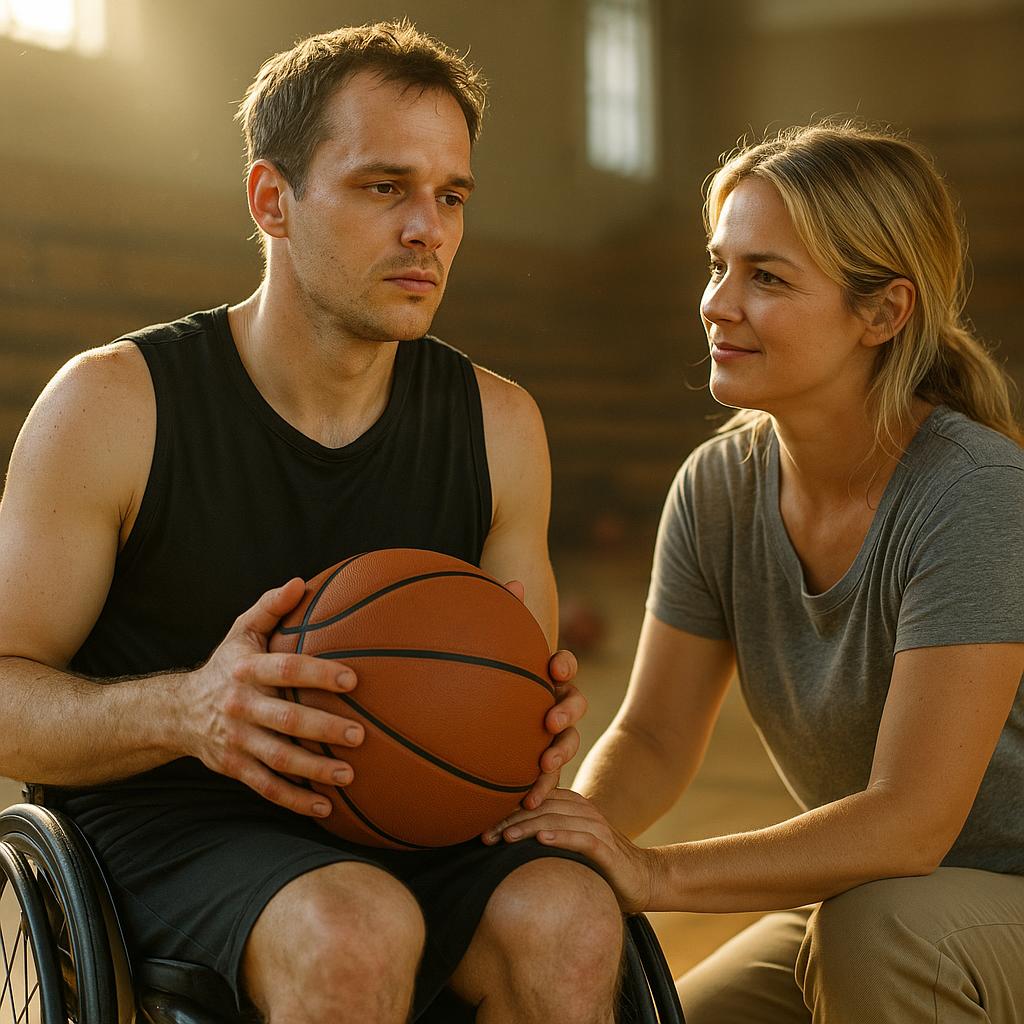 Image by RM AI
Image by RM AI
The Unexpected News
The cream-colored envelope arrived on a Tuesday, nestled between bills and junk mail like a snake in the grass. I recognized Megan's handwriting immediately—the loopy way she crossed her t's hadn't changed. Inside was a wedding invitation, complete with embossed flowers and a photo of her and Mark looking blissfully in love. My stomach dropped to somewhere around my wheels. After everything, she had the audacity to invite me to watch her marry the coworker she'd left me for? I called James in a rage, my hands shaking so badly I could barely hold the phone. 'Who does this?' I demanded. 'Who invites their ex-husband in a wheelchair to watch them marry the guy they cheated with?' James was quiet for a moment. 'Maybe,' he finally said, 'she's not trying to hurt you. Maybe she's trying to show you she doesn't regret her choice, to free you from any lingering hope.' His words hit me like a bucket of cold water. That night, I wheeled over to my desk and pulled out the divorce papers I'd been avoiding for months. I signed each page with deliberate strokes, then slipped them into an envelope with a simple note: 'I wish you happiness.' As I dropped it in the mailbox, I felt something unexpected—not closure exactly, but the first real step toward it. What I didn't know then was that letting go of Megan would create space for something I never saw coming.
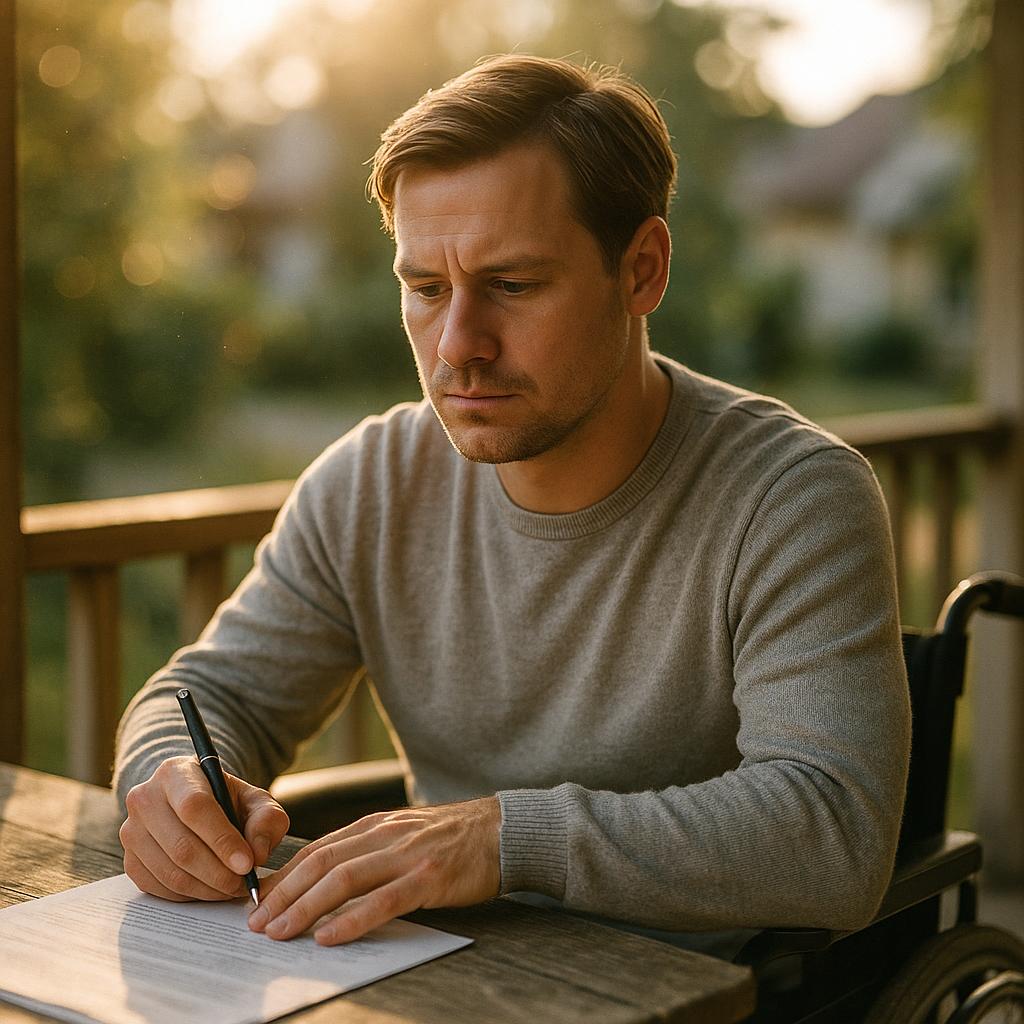 Image by RM AI
Image by RM AI
The Intimacy
Two months into dating Isabelle, we faced the elephant in the room that I'd been desperately avoiding: physical intimacy. Every time our kisses deepened or her hands lingered on my shoulders, I'd find some excuse to pull away. It wasn't that I didn't want her—God, I wanted her more than I'd ever wanted anyone. But my body was a stranger to me now. What if I couldn't satisfy her? What if she looked at me with that awful mixture of disappointment and pity? One night, after I'd made yet another excuse about being tired, she took my face in her hands. 'Daniel,' she said, her blue eyes serious, 'talk to me.' So I did. I confessed every fear, every insecurity about my changed body, my voice breaking with embarrassment. When I finally ran out of words, she simply nodded and said, 'There's more than one way to be intimate. Let's discover what works for us.' That night was awkward—full of hesitations, whispered questions, and occasional laughter when something didn't quite work. But it was also the most honest I'd ever been with another person. There were no performances, no pretending. Just two people learning each other's bodies with patience and care. What surprised me most wasn't what my body could still do—it was how Isabelle made me feel: not broken or less-than, but simply and completely seen.
 Image by RM AI
Image by RM AI
The Independence
Eighteen months after the accident, I made a decision that shocked everyone in my support circle—I wanted to live completely alone. 'Are you out of your mind?' James practically shouted when I told him. 'What if something happens? What if you fall?' His concern was touching, but suffocating. My mother was more subtle, asking innocent questions about doorway widths and emergency protocols. But I needed this. After losing Megan, after rebuilding my body through basketball, after finding unexpected connection with Isabelle—I needed to prove to myself that I wasn't dependent on anyone's help. Finding an accessible apartment was a nightmare of rejections and 'sorry, we can't accommodate that' until the rehabilitation center connected me with a housing advocate. The day I moved in was surreal—friends carrying boxes, Isabelle organizing my kitchen with color-coded labels, Coach Marcus inexplicably installing grab bars in my bathroom. As evening approached and they prepared to leave, I felt twin waves of terror and exhilaration crash over me. 'You sure you're good?' James asked one last time at the door. I nodded, my throat tight. When the door finally closed behind them, the silence was deafening. I sat in my wheelchair in the middle of MY apartment, surrounded by MY things, with no one to help me but myself. What I didn't realize then was that true independence would test me in ways I never imagined.
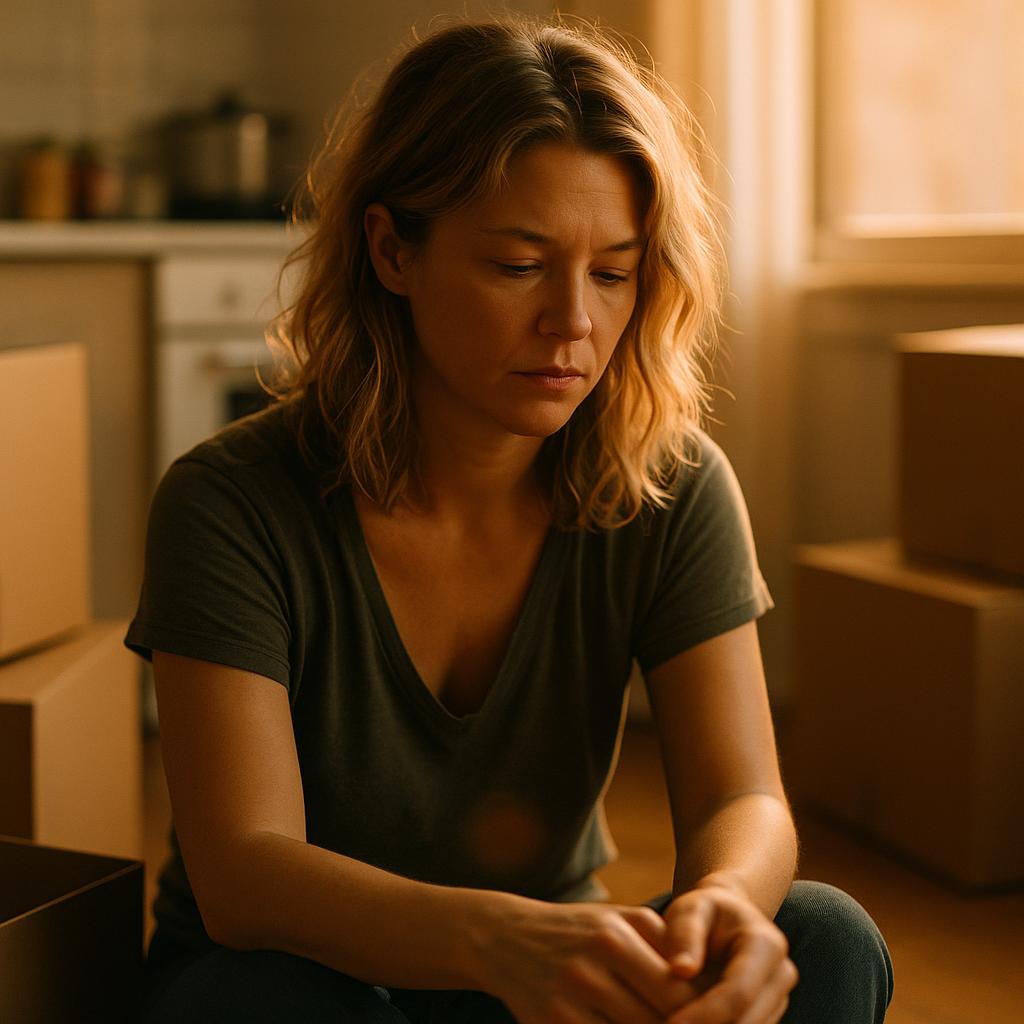 Image by RM AI
Image by RM AI
The First Night Alone (Again)
That first night in my new apartment felt nothing like the night Megan walked out. Back then, I was drowning in silence, each tick of the clock a reminder of what I'd lost. But this silence? This was mine. I wheeled around the kitchen, preparing a simple pasta dish without anyone hovering anxiously behind me. I navigated my roll-in shower, the grab bars Coach Marcus had installed gleaming under the bathroom lights. When I finally transferred into bed—a maneuver I'd practiced hundreds of times in physical therapy—I felt a surge of pride so intense it nearly brought tears to my eyes. I texted Isabelle a quick 'Made it to bed. No emergencies.' She responded with a thumbs-up emoji and a heart. As I lay there, staring at the ceiling I'd chosen, in the apartment I'd fought for, I realized something profound: the emptiness around me wasn't a void anymore. It was possibility. Space I was filling with choices that were entirely my own. My phone buzzed again—James checking in, of course. I smiled and turned off the light, ready to face whatever dreams came. What I didn't expect was the 3 AM wake-up call that would test everything I thought I knew about independence.
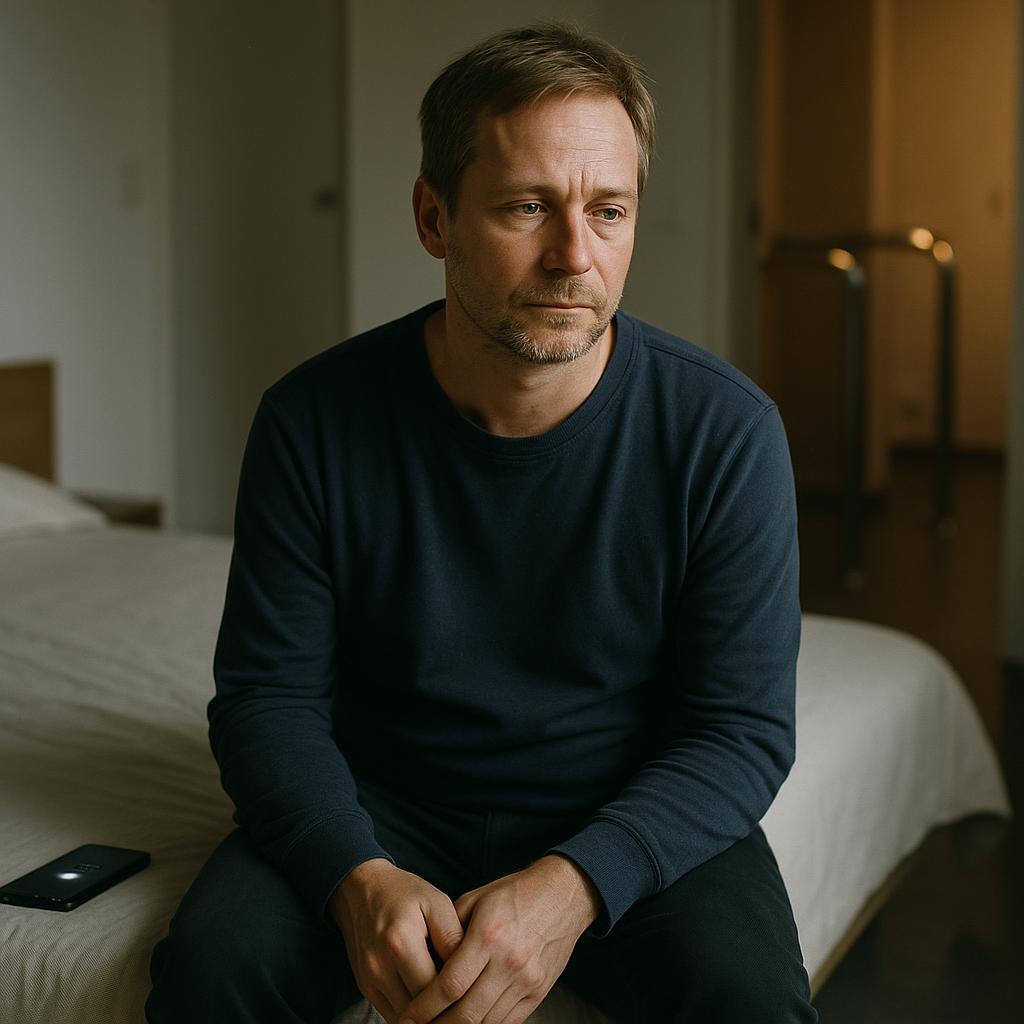 Image by RM AI
Image by RM AI
The Promotion
The email from Dr. Novak arrived on a Tuesday morning, subject line simply reading 'Opportunity.' I nearly scrolled past it, assuming it was another department-wide announcement. When I opened it and saw the job offer—facilities manager overseeing all construction and accessibility projects—my coffee mug froze halfway to my lips. 'You understand both sides,' he wrote. 'The construction knowledge from your previous career and the patient experience from your journey.' The salary figure at the bottom of the email made my eyes widen. It was nearly double what I'd been making from the part-time consulting work, enough to finally kiss those insufficient disability checks goodbye. I sat there, staring at my screen, remembering how just two years ago I couldn't imagine having any career at all. Now Dr. Novak was offering me a position that would leverage everything I'd been through—turning my greatest challenge into my greatest qualification. I called Isabelle immediately. 'They want me to redesign the whole damn world,' I told her, my voice catching. She laughed, that bright sound that always made my chest feel lighter. 'Of course they do,' she said. 'Who better?' I scheduled a meeting with Dr. Novak for Friday, already mentally redesigning the center's notoriously narrow bathroom doors. What I didn't realize was that accepting this position would put me directly in Megan's path again—in the most unexpected way possible.
 Image by RM AI
Image by RM AI
The Encounter
I was reaching for a box of cereal when I heard her voice—that familiar cadence I'd once known better than my own heartbeat. Turning my chair, I came face-to-face with Megan in the middle of aisle seven. She stood frozen, one hand clutching a shopping basket, the other resting protectively on her very pregnant belly. Mark hovered awkwardly behind her, pretending to be fascinated by nutrition labels. 'Daniel,' she said, her voice catching. 'How are you?' We exchanged the kind of stilted pleasantries that people who once shared everything now trade like strangers. I asked about the baby (a girl, due in six weeks), and she asked about my new job. As we spoke, I waited for the familiar surge of anger or heartbreak to wash over me—but it never came. Instead, I felt something unexpected: a gentle sadness for what we'd lost, mixed with genuine hope that she'd found happiness, even if it wasn't with me. When Mark stepped forward and placed his hand on her shoulder, I noticed how she leaned into him, the same way she used to lean into me. 'I should get going,' I said, offering a smile that, for the first time since our divorce, didn't require effort. As I wheeled away, I realized that sometimes closure doesn't arrive in dramatic confrontations or signed papers—sometimes it finds you in the cereal aisle of a grocery store on an ordinary Tuesday afternoon.
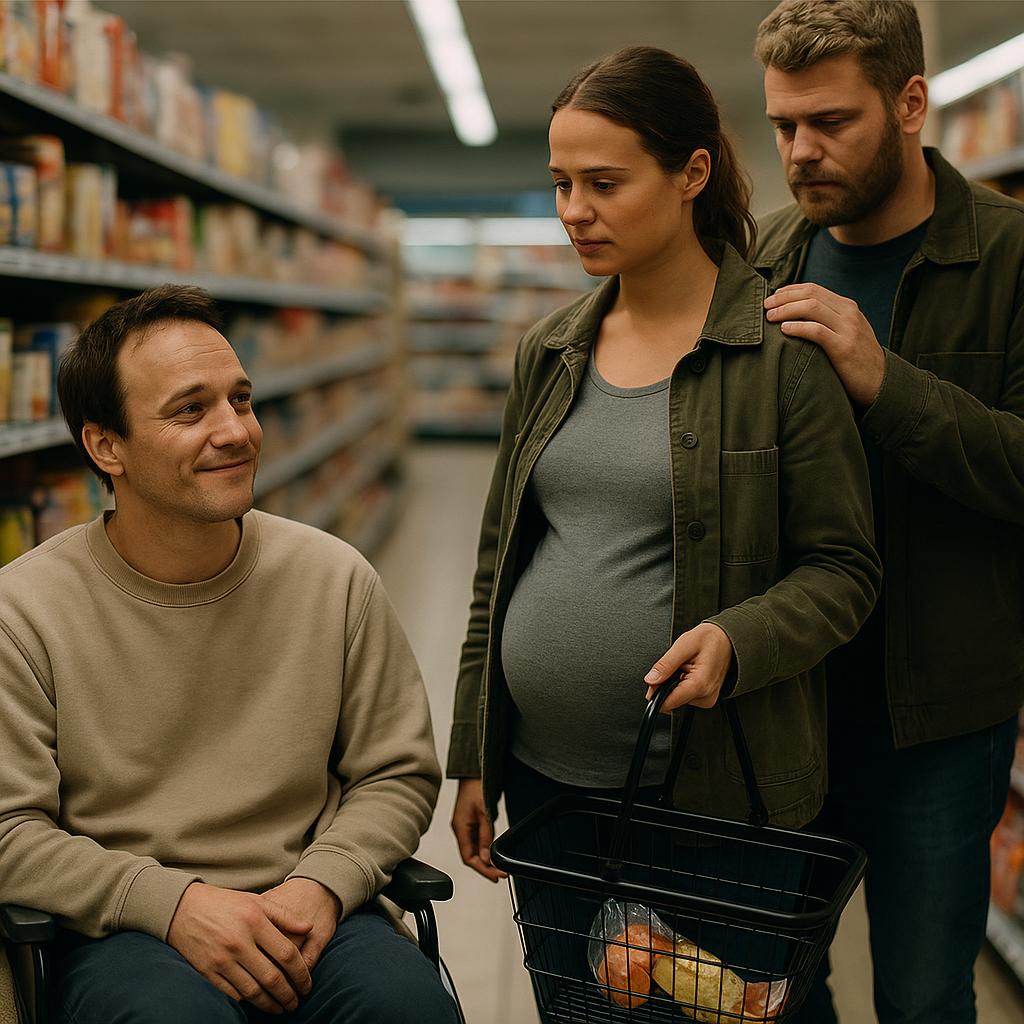 Image by RM AI
Image by RM AI
The Anniversary
I marked the two-year anniversary of my accident in a way that would have horrified my therapist – by driving myself to the exact spot where my old life had ended. Isabelle offered to come with me, her eyes full of that protective concern I'd grown to both love and chafe against. 'I need to do this alone,' I told her, squeezing her hand. The intersection looked so ordinary – just asphalt, traffic lights, and a stop sign that one distracted driver had blown through, shattering my spine and my future in the same moment. I positioned my wheelchair at the roadside, feeling strangely calm as cars whizzed past. Some drivers glanced curiously at the man in the wheelchair staring at seemingly nothing. They couldn't see what I saw: the ghost of who I used to be, jogging confidently along this road, completely unaware that his world was about to implode. I pulled a small, smooth stone from my pocket – one I'd picked up from the basketball court where I'd found myself again. I placed it carefully at the edge of the road, not in mourning, but in acknowledgment. 'Goodbye,' I whispered, not to the life I'd lost, but to the bitterness I'd carried. As I turned my chair to leave, my phone buzzed with a text from Isabelle that would present me with the most terrifying opportunity yet.
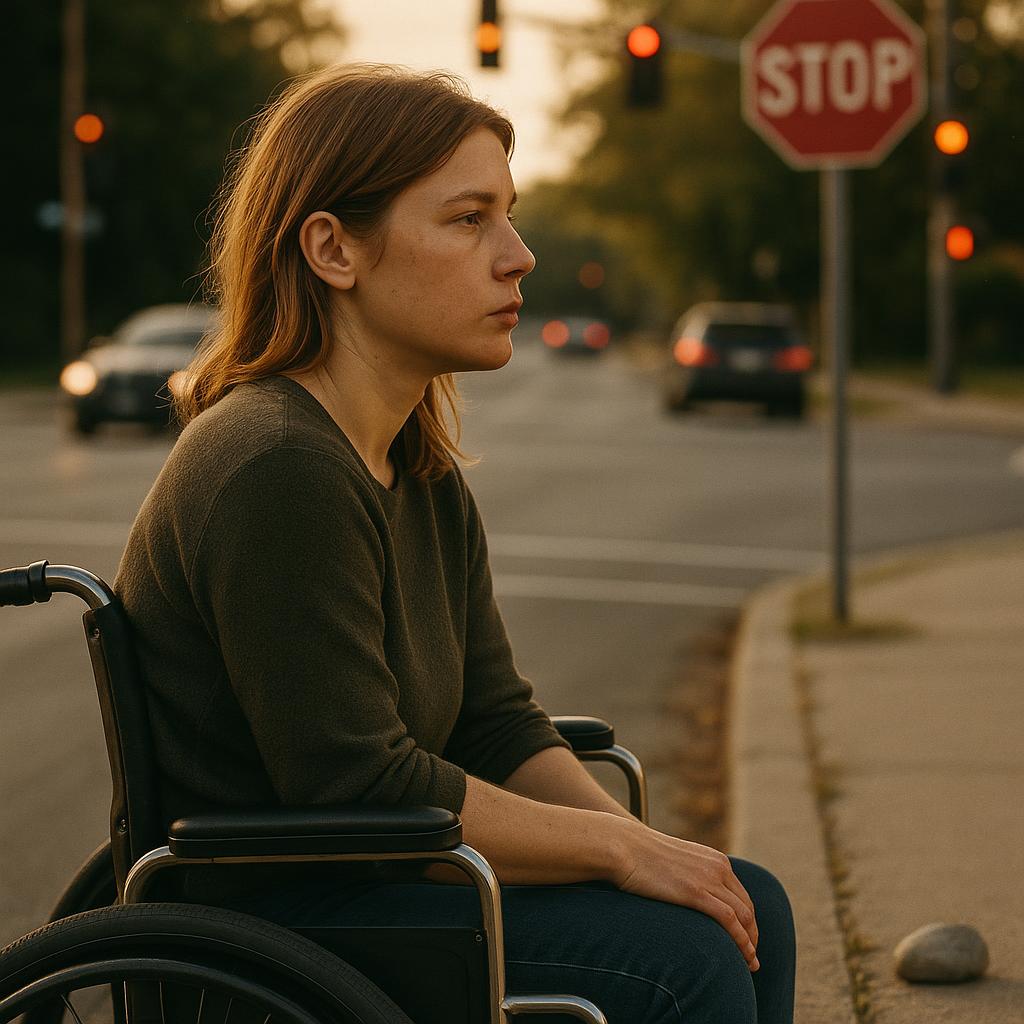 Image by RM AI
Image by RM AI
The National Tournament
The national tournament was unlike anything I'd experienced before. Our team arrived in Chicago to a sea of specialized wheelchairs and athletes who moved with such precision they made it look like flying. 'This is the real deal,' Coach Marcus whispered as we watched the defending champions warm up with drills that looked like choreographed dances. I'd been practicing my three-pointer for months, determined not to repeat my championship miss. When we hit the court for our first game, the nerves nearly paralyzed me worse than my actual paralysis—until Isabelle's voice cut through the crowd noise: 'Show them who you are, Daniel!' We fought our way to the semifinals, each game more grueling than the last. My arms were perpetually covered in bruises, my calluses had calluses, but I'd never felt more alive. After our semifinal loss, I sat alone, disappointed but proud, when a woman with a Paralympic logo on her jacket approached. 'You've got something special,' she said, handing me her card. 'The national development team is holding tryouts next month.' I stared at the card, my heart racing. Two years ago, I couldn't imagine getting out of bed. Now someone thought I could represent my country? What floored me most wasn't the opportunity itself, but realizing that somewhere along the way, I'd stopped seeing limitations and started seeing possibilities.
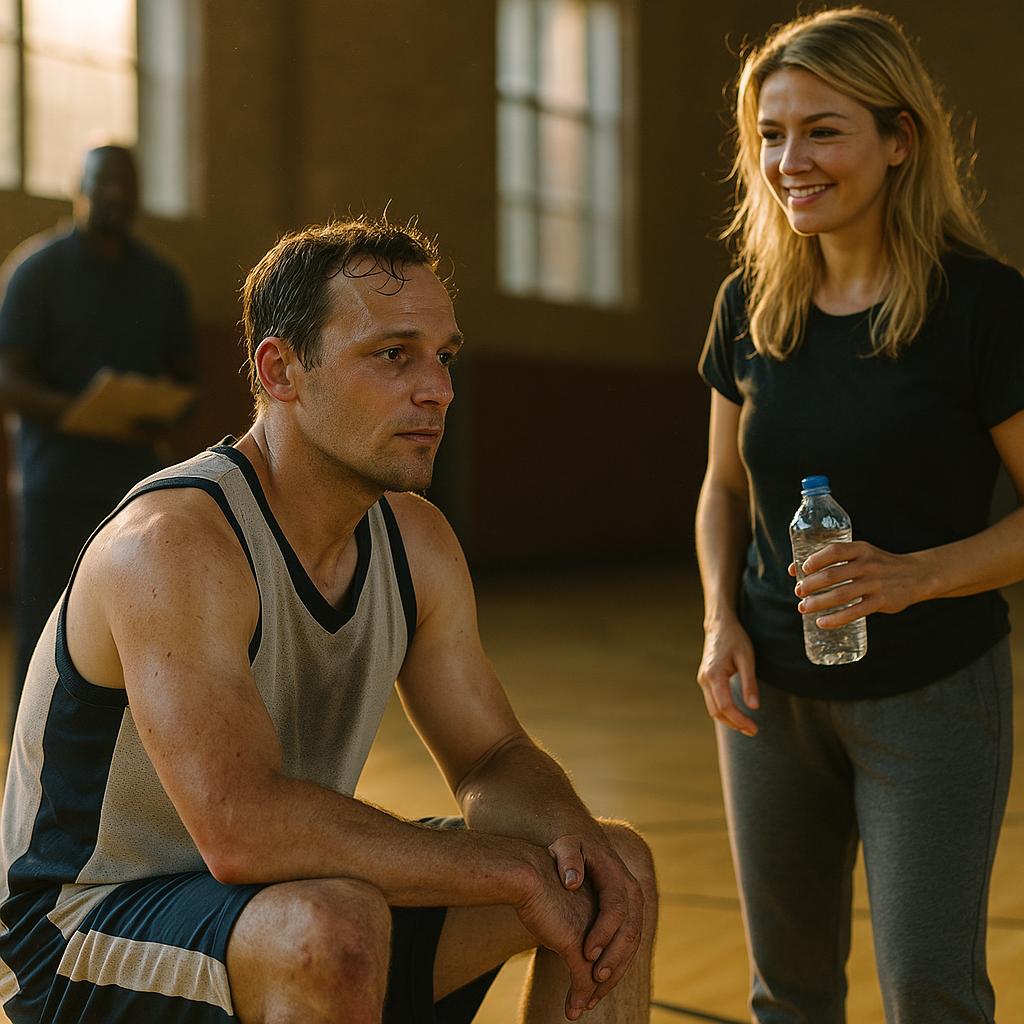 Image by RM AI
Image by RM AI
The Decision
The day Isabelle told me about the job offer, we were sitting in my apartment, the evening sun casting long shadows across the floor. Her eyes sparkled with excitement as she described the rehabilitation center's innovative programs, but I could see the worry lines forming around her mouth. 'It's three hours away, Daniel,' she finally said, reaching for my hand. 'I'm not asking you to uproot your life. I know how hard you've worked for your independence here.' My heart sank as I realized what she was saying. After Megan abandoned me, I'd built walls around myself, brick by painful brick. Isabelle had somehow slipped through them, showing me I could be loved exactly as I was. Now I faced a choice that terrified me: stay in my safe, carefully constructed world, or risk everything for love again. That night, after she left, I wheeled out onto my balcony and stared at the city lights. The basketball court where I'd found myself again. The hospital where I worked. The apartment I'd fought so hard to live in alone. All the pieces of my rebuilt life spread before me. I thought about what my therapist always said about trauma: 'It's not about going back to who you were. It's about discovering who you can become.' What I didn't realize then was that sometimes the bravest decision isn't choosing between two paths—it's creating an entirely new one.
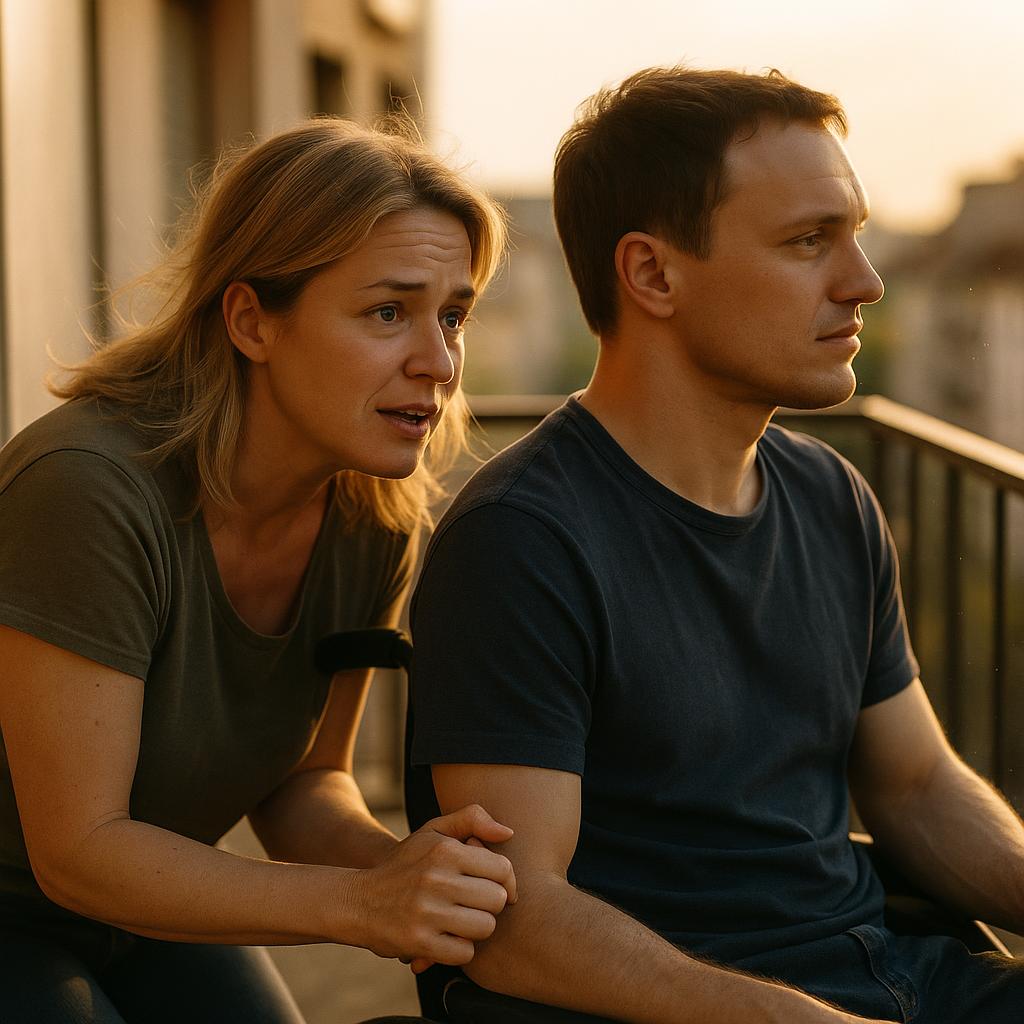 Image by RM AI
Image by RM AI
The Proposal
I spent three weeks agonizing over my decision, weighing independence against love—a battle I never thought I'd fight again after Megan left. When I finally asked Isabelle to meet me at the basketball court where everything between us began, my heart was pounding harder than during any championship game. She arrived wearing that blue sweater that matched her eyes, looking hopeful but guarded. I took a deep breath and just said it: 'I'm not coming with you,' watching her face crumble before quickly adding, 'but I'm not letting you go either.' I explained my compromise—we'd try long-distance while I completed what I'd started here: the Paralympic tryouts that could redefine my athletic identity, my accessibility projects at the center, training someone who understood both worlds to take my place. 'And then,' I said, reaching for her hand, 'if you'll still have me, I want to join you.' The tears that spilled down her cheeks terrified me until I saw her smile—that radiant, full-hearted smile that had pulled me from darkness so many times. She didn't just say yes; she practically launched herself into my lap, nearly tipping my chair backward as she wrapped her arms around me. 'We've overcome worse than a few hours' drive,' she whispered against my neck. What I didn't know then was that long-distance would test us in ways neither of us could have anticipated—and that the ring I'd hidden in my basketball bag would have to wait longer than I planned.
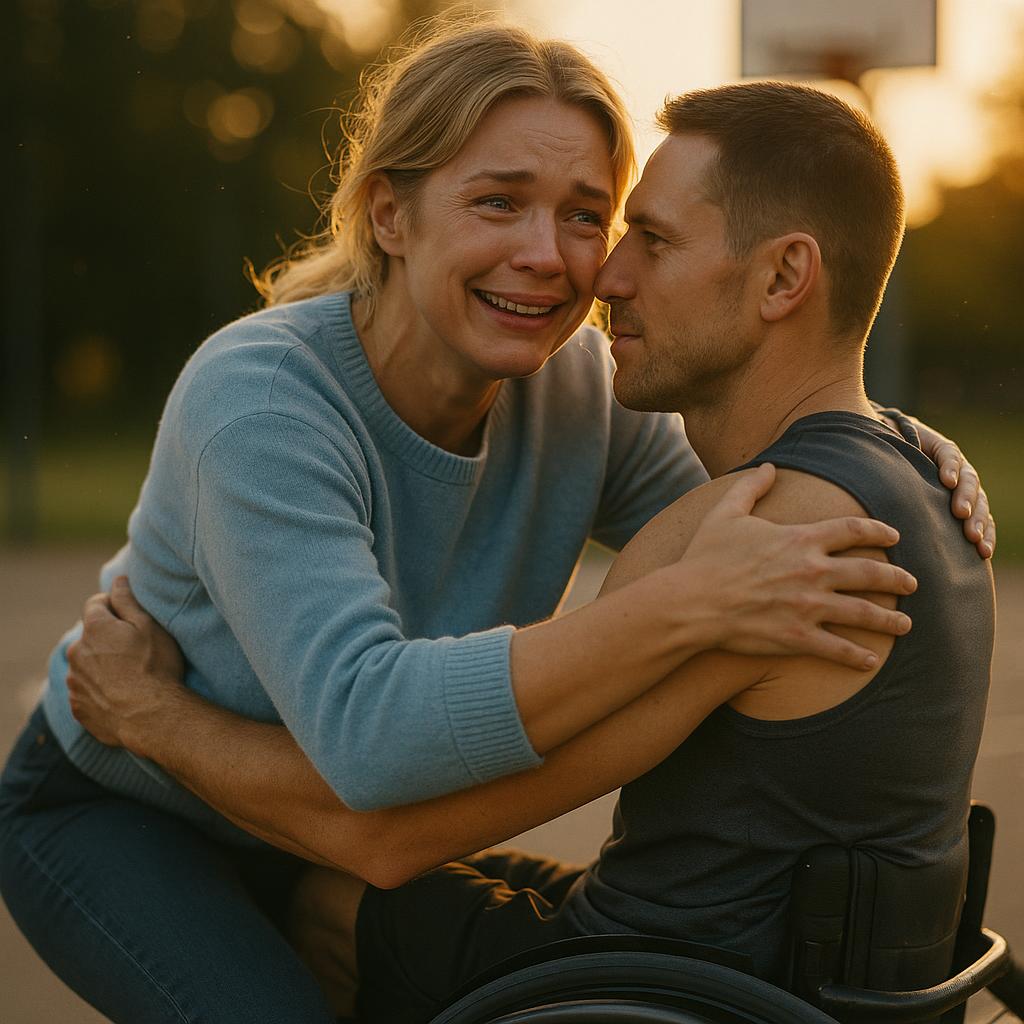 Image by RM AI
Image by RM AI
The Letter
The letter arrived on a rainy Thursday, Megan's familiar handwriting making my stomach clench before I even opened it. I let it sit on my coffee table for hours, watching it like it might suddenly attack. When I finally tore it open, her words spilled out like a confession. 'I wasn't strong enough,' she wrote, her pen having pressed so hard it left indentations on the back of the page. 'And I'll always regret that.' She described her new life with Mark, her excitement about their daughter, and then something that knocked the wind out of me: 'I see you now - in your basketball games, at the center, with Isabelle - and you seem happier than you ever were with me.' I read that line three times, searching for the sting, but found only truth. She ended by asking for forgiveness, something I never thought I'd be able to give. Yet sitting there, with Isabelle's half-packed boxes scattered around my apartment and Paralympic tryout forms on my desk, I realized I could forgive her—not because she deserved it, but because holding onto that anger was exhausting. I folded the letter carefully and placed it in the box where I kept my pre-accident life. What I didn't know then was that Megan's letter would become crucial evidence in a battle I never saw coming.
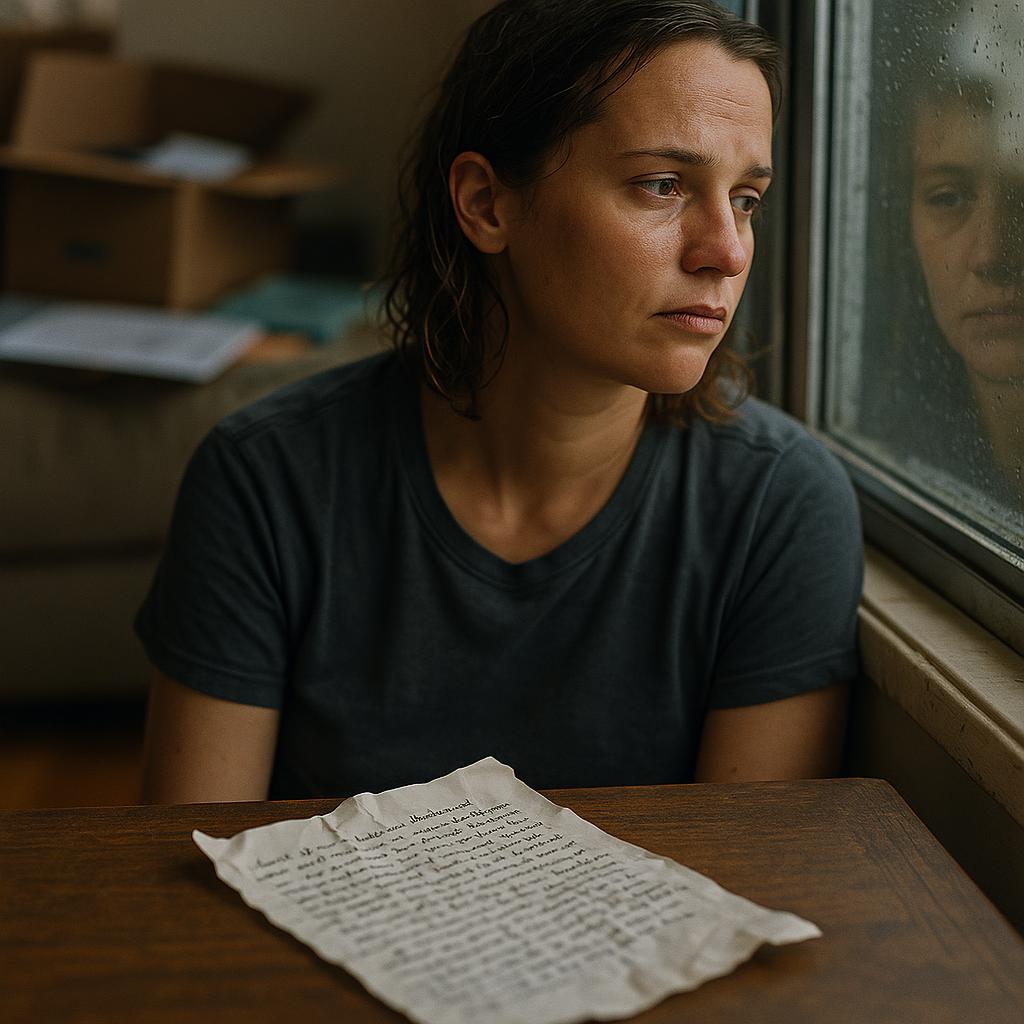 Image by RM AI
Image by RM AI
The New Beginning
Today marks two and a half years since the accident that changed everything. I'm sitting in my apartment, surrounded by half-packed boxes and memories, staring at the adaptive basketball trophy I won last month at the Paralympic development team tryouts. It gleams in the afternoon light, a physical reminder of how far I've come. Tomorrow, I'll load the last of my life into a rented van with hand controls and drive three hours to join Isabelle in our new city. It's terrifying and exhilarating all at once. When I think about the man I was before—both before the accident and in those dark days after Megan left—I barely recognize him. That version of Daniel was either obliviously confident or completely broken. This version? He's scarred but whole, limited but somehow more capable than ever. I run my fingers over the wheelchair I once hated, now as much a part of me as my own heartbeat. I didn't get the life I planned—not even close—but I found something I never expected: a life worth fighting for, a love that sees all of me, and a strength I never knew I possessed. As I seal the final box with packing tape, my phone buzzes with a text that will throw one last unexpected challenge into my carefully planned new beginning.
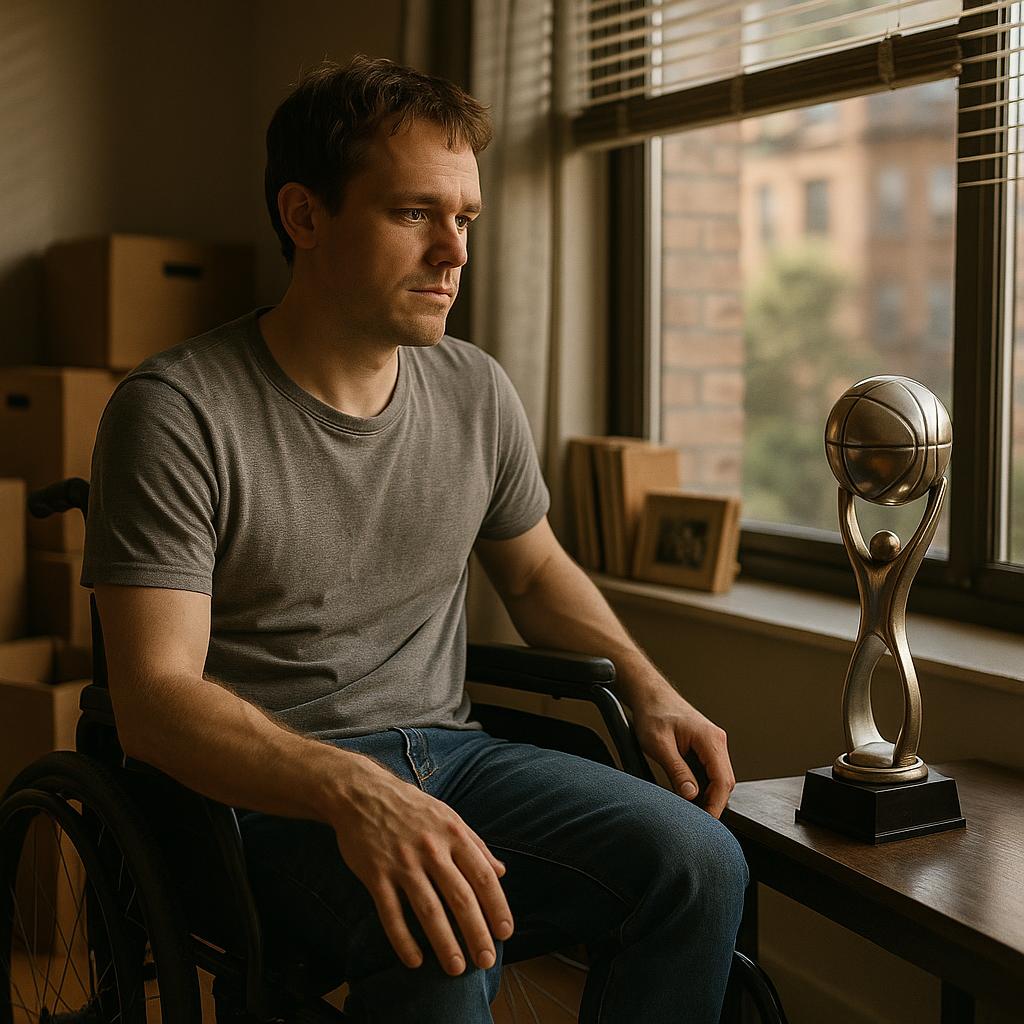 Image by RM AI
Image by RM AI
KEEP ON READING

20 Weirdest Historical Objects in Museums
Check Out the Pickled Heart of a Saint. Museums carry…
By Rob Shapiro Oct 1, 2025
20 Ocean Mysteries We Still Haven’t Solved
Unanswered Questions Of The Ocean. The ocean covers most of…
By David Davidovic Sep 1, 2025
10 Phenomenal Mythical Creatures & 10 That Are Just Plain…
Legends Both Majestic And Peculiar. Do you ever wonder why…
By Chase Wexler Oct 1, 2025
20 Historical Predictions That Turned Out To Be True
Crystal Ball Moments In History. Do you wonder what it's…
By Chase Wexler Sep 1, 2025
10 Presidents Who Never Served In The Military & 10…
Commanders And Civilians In Office. Power can rise from very…
By David Davidovic Sep 1, 2025
20 Wars That Could Have Ended Much Sooner Than They…
Wars That Lasted Far Too Long. Wars are often remembered…
By David Davidovic Sep 1, 2025
